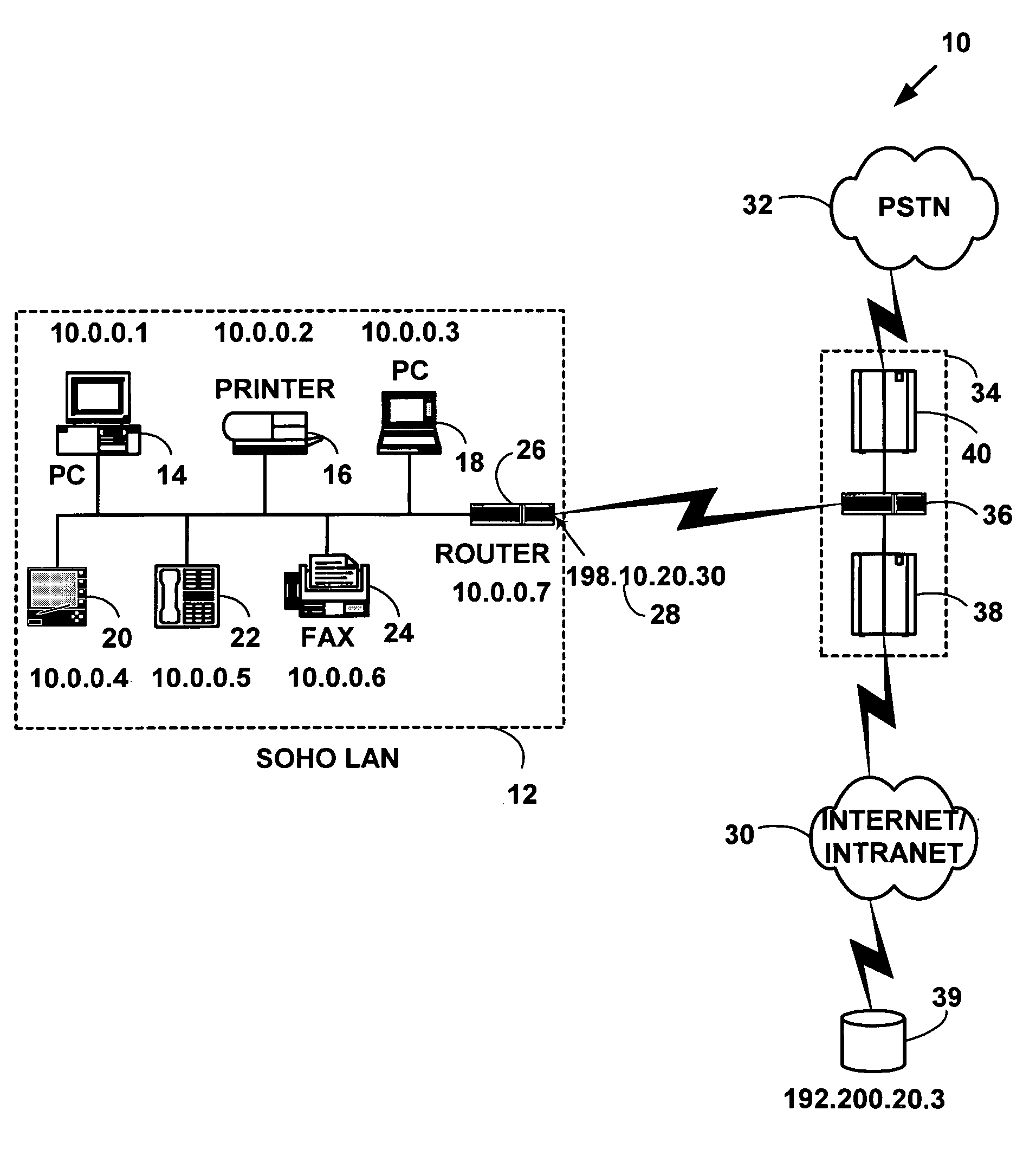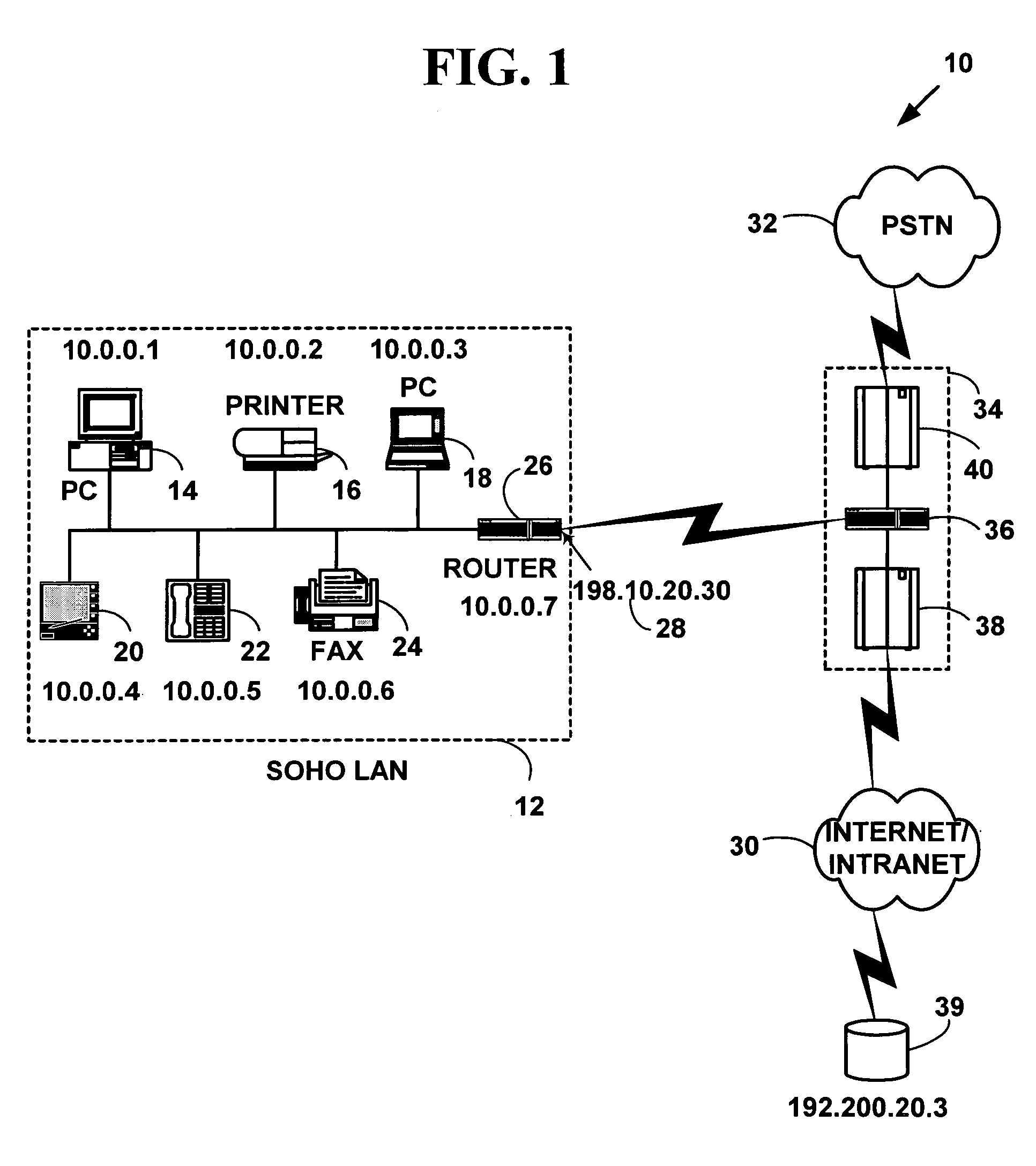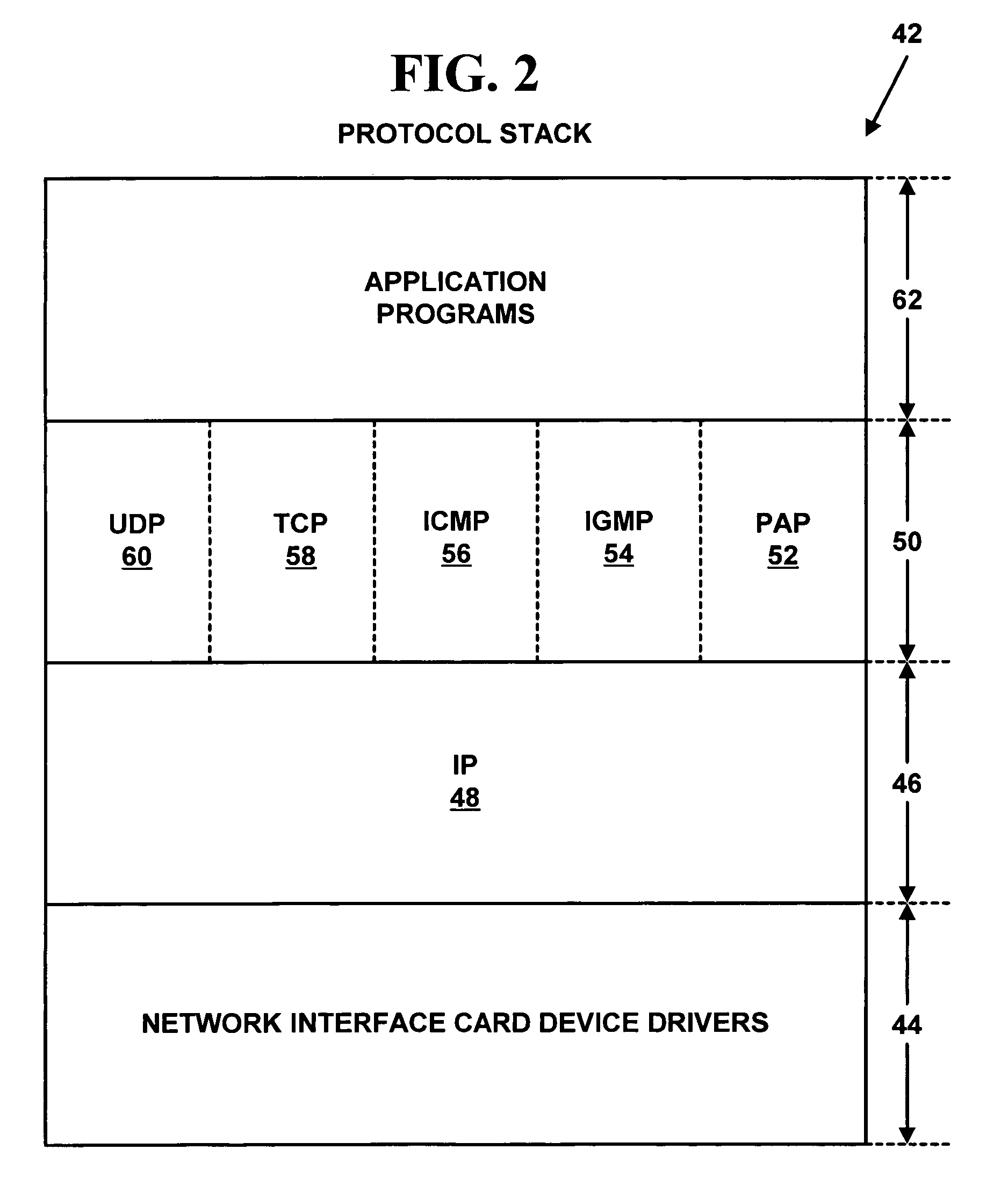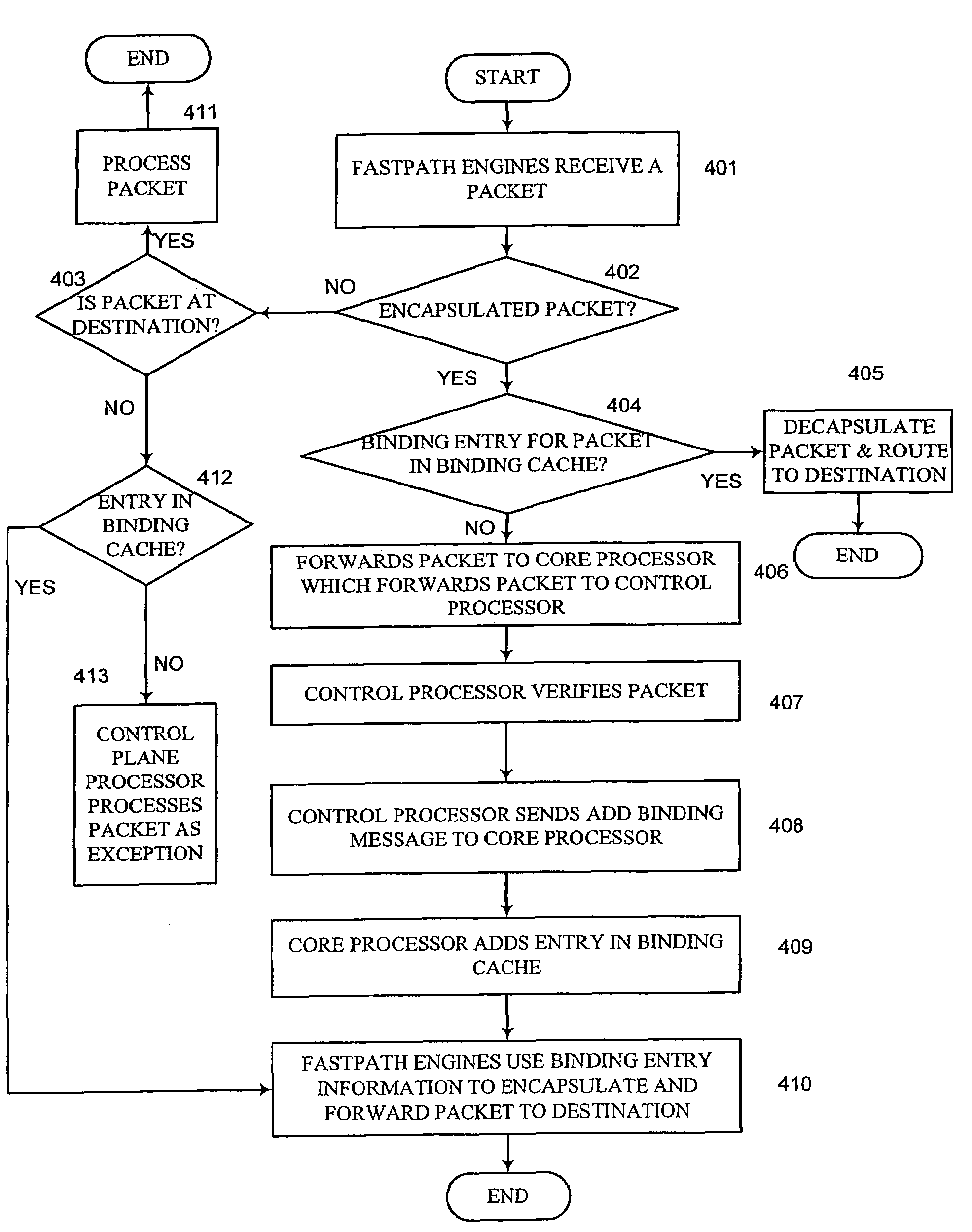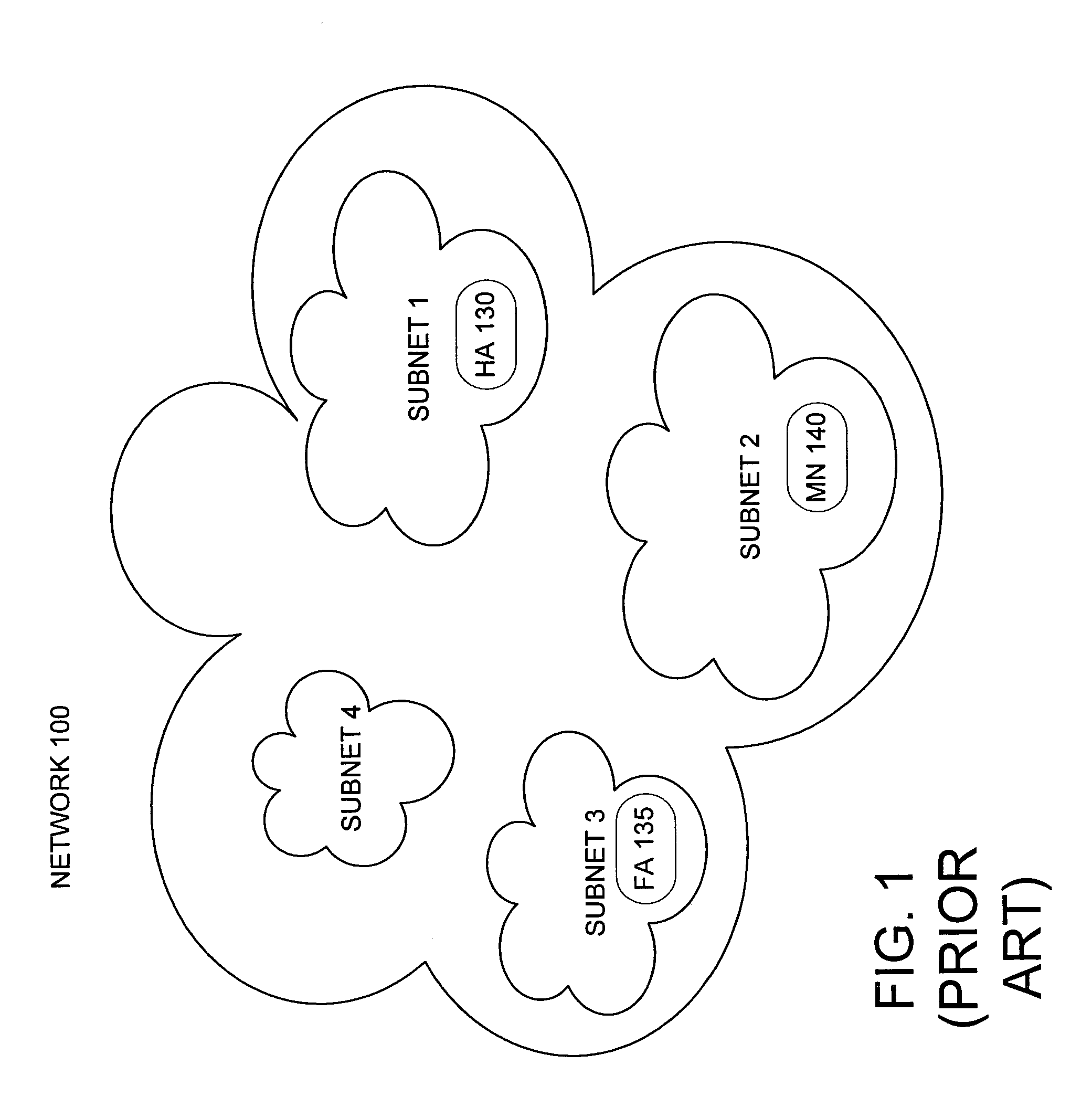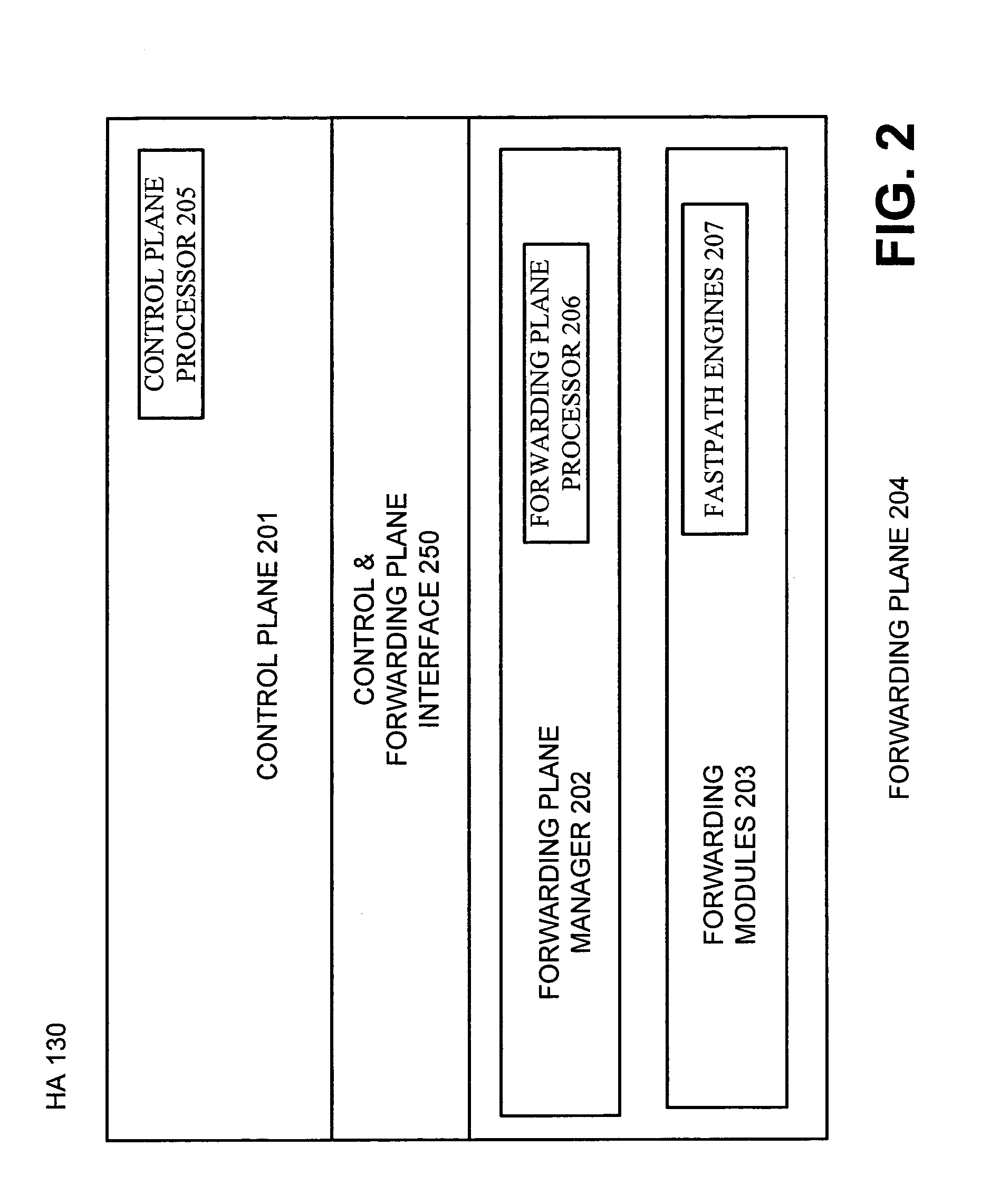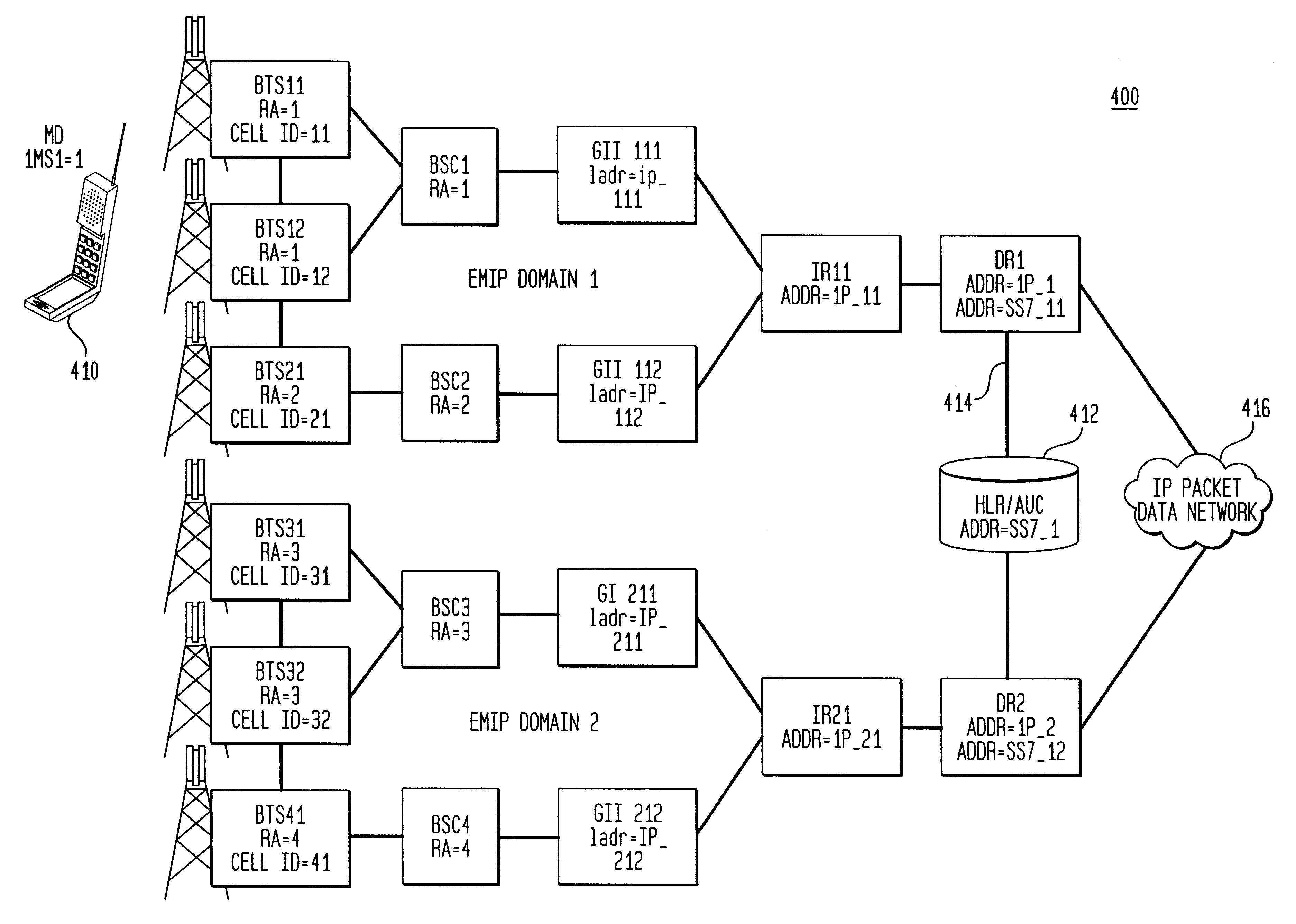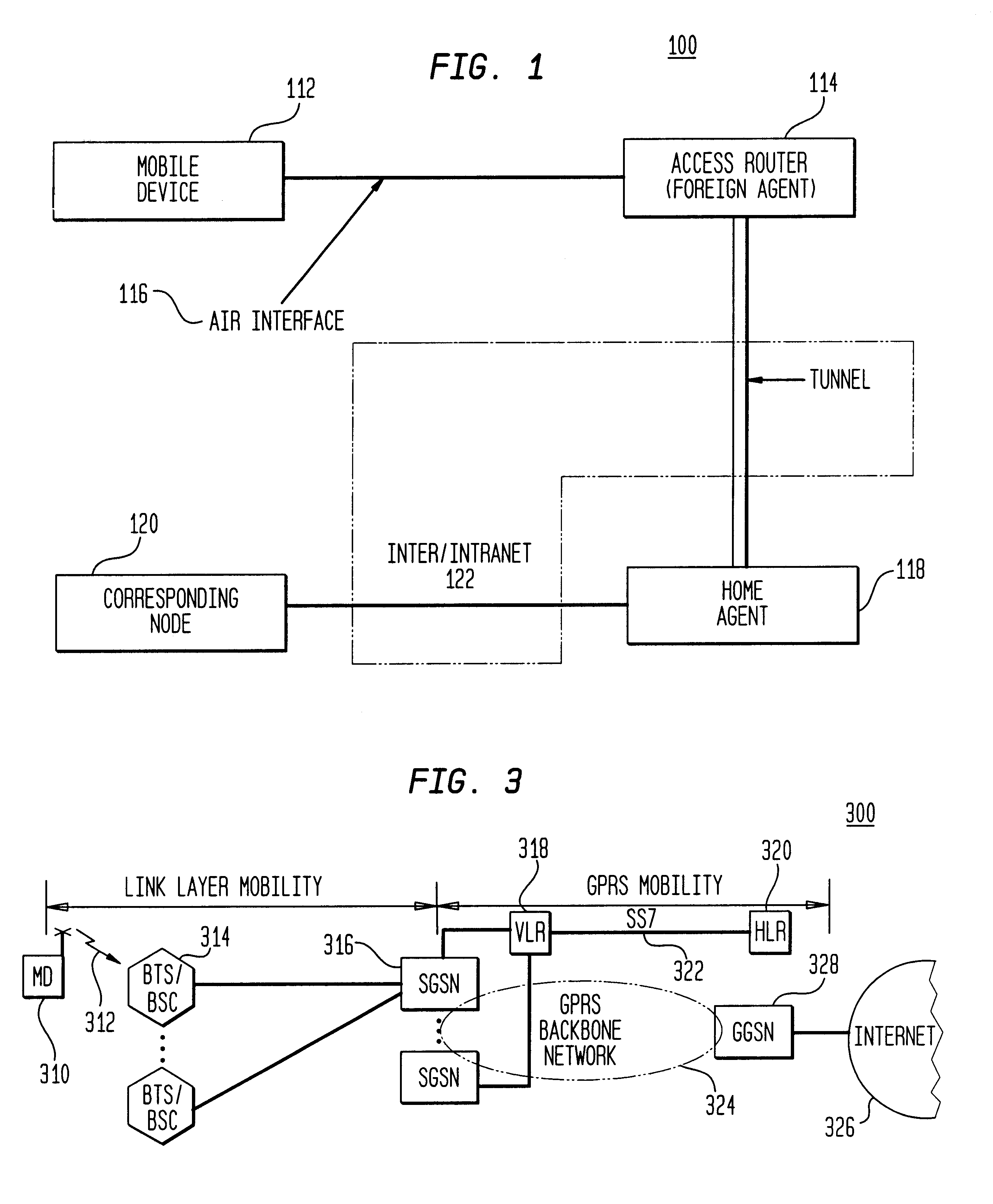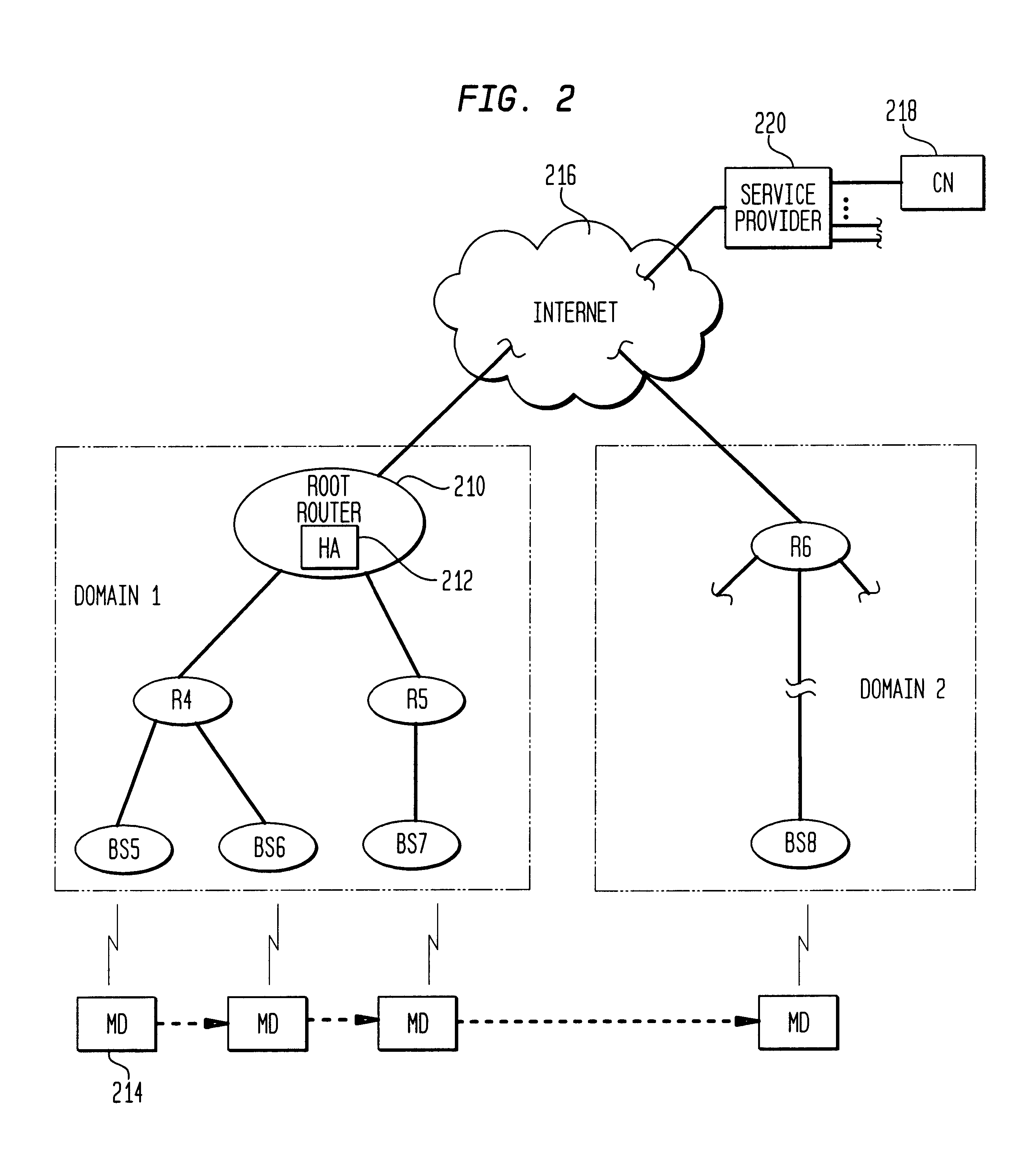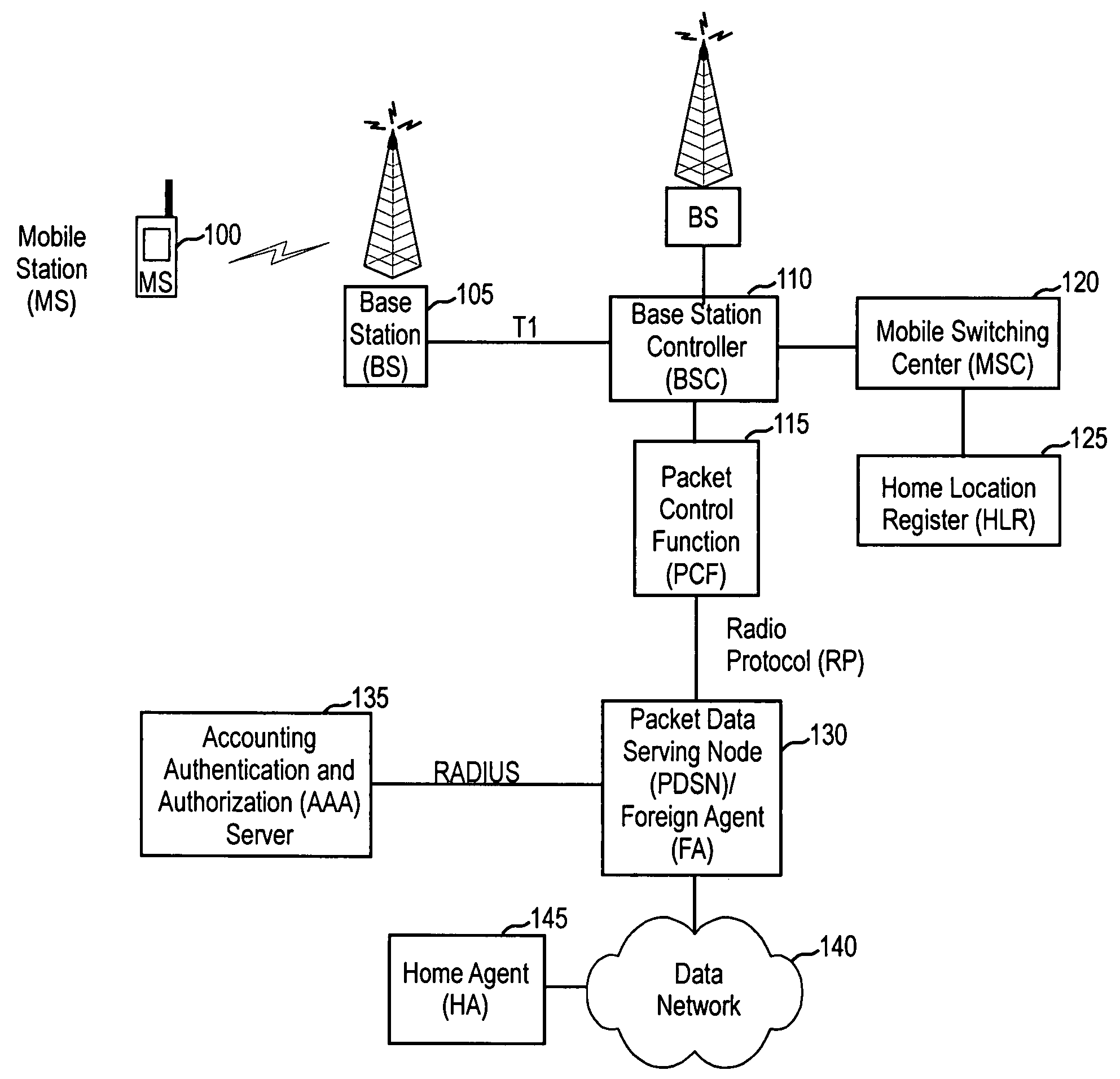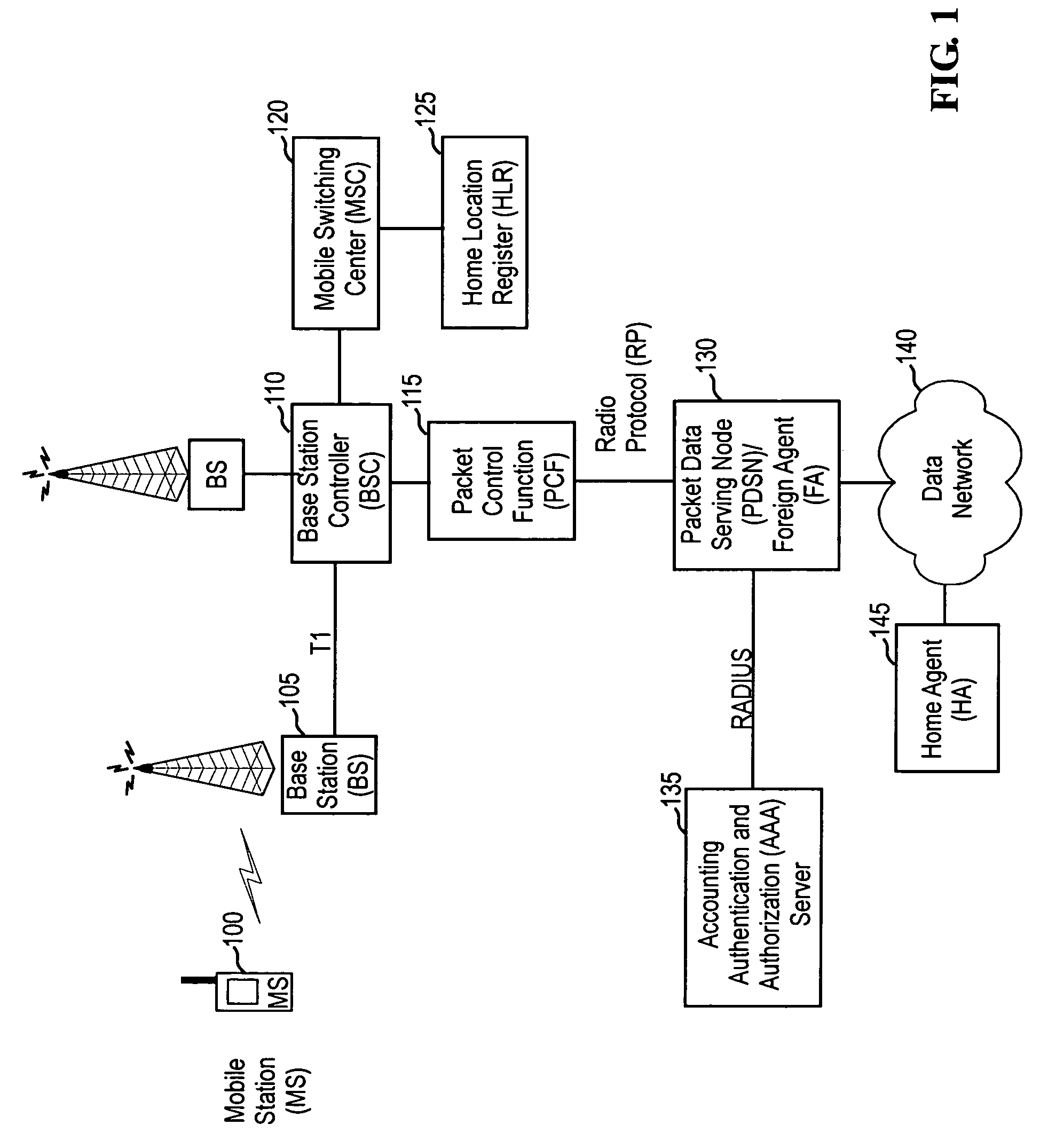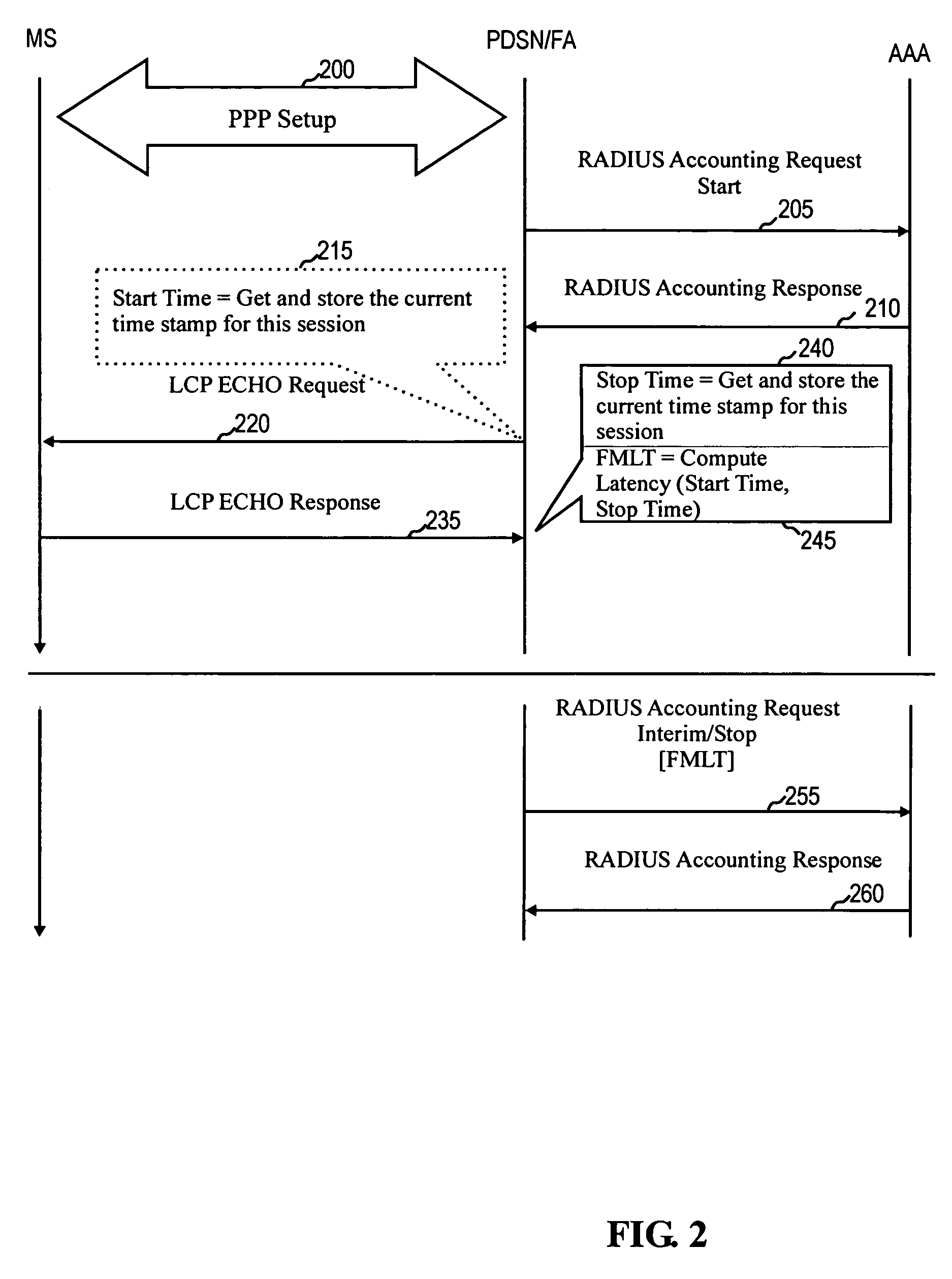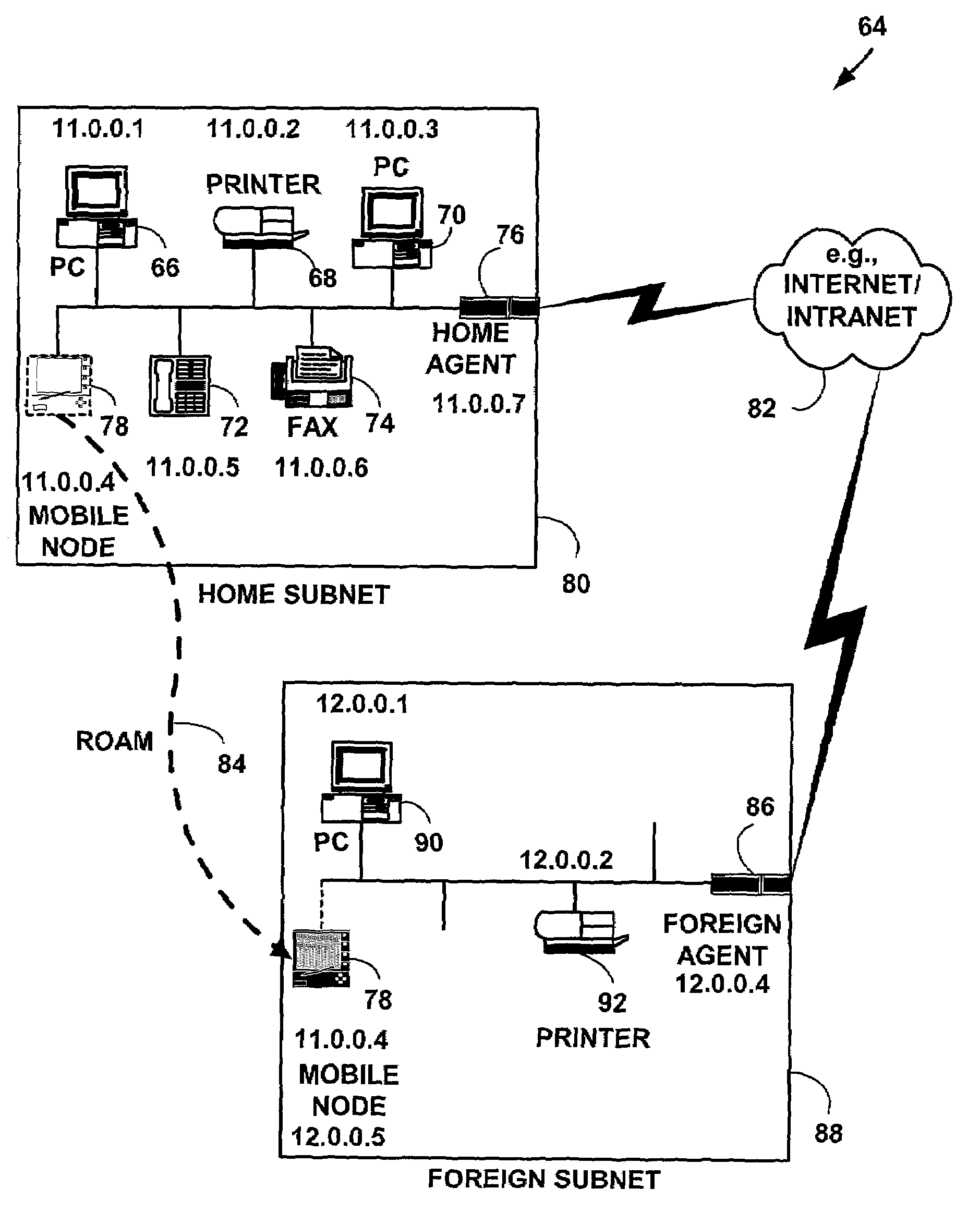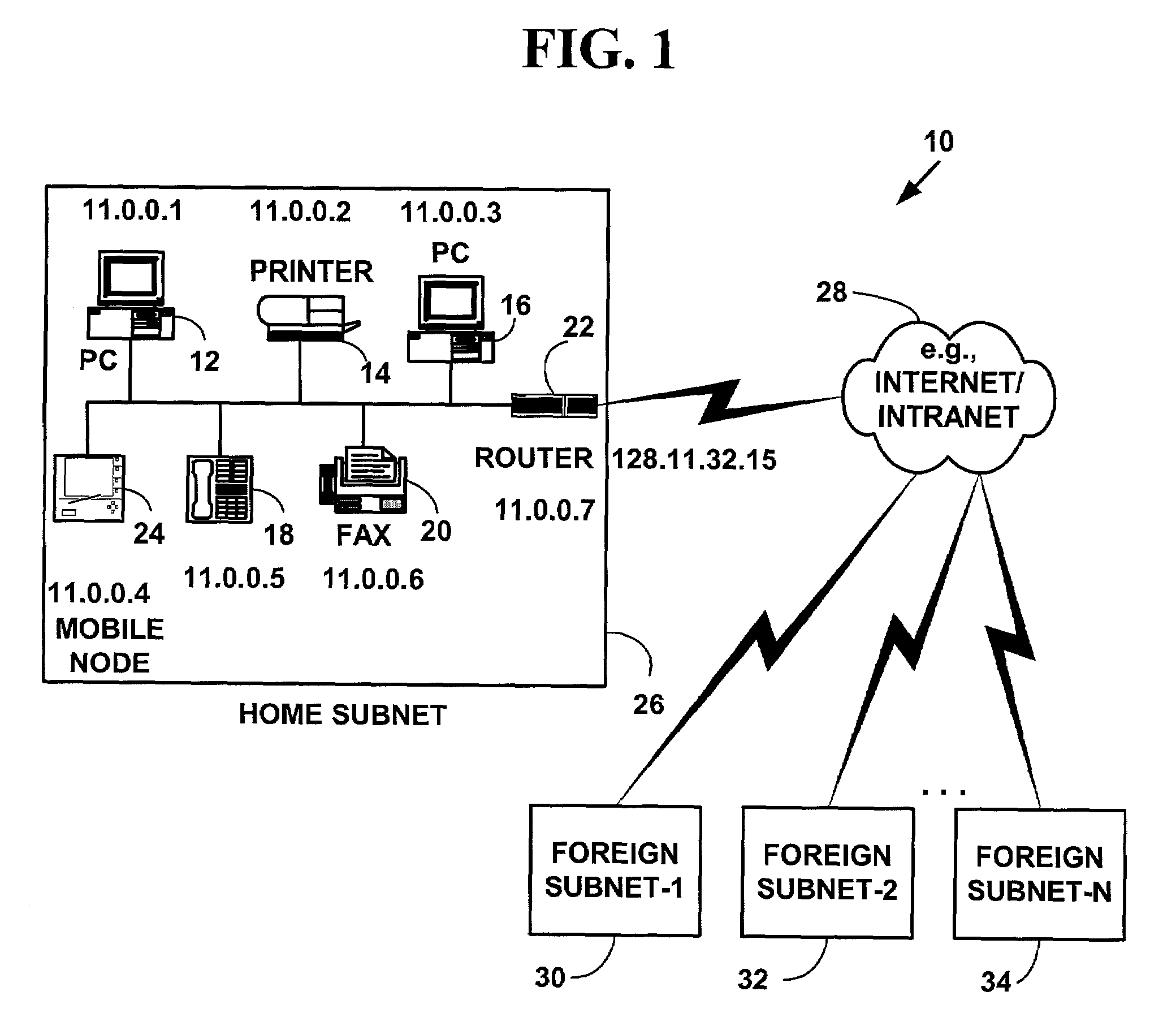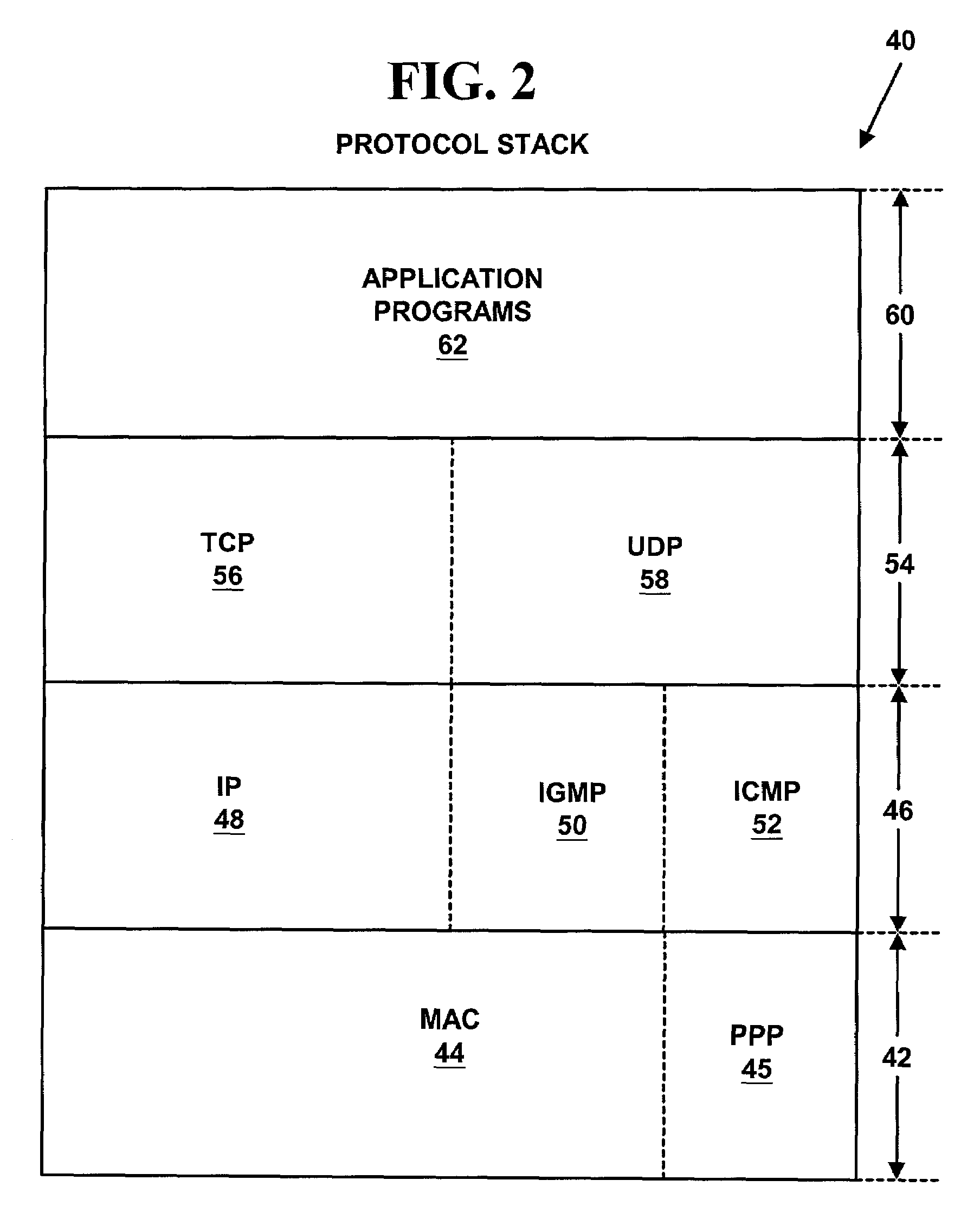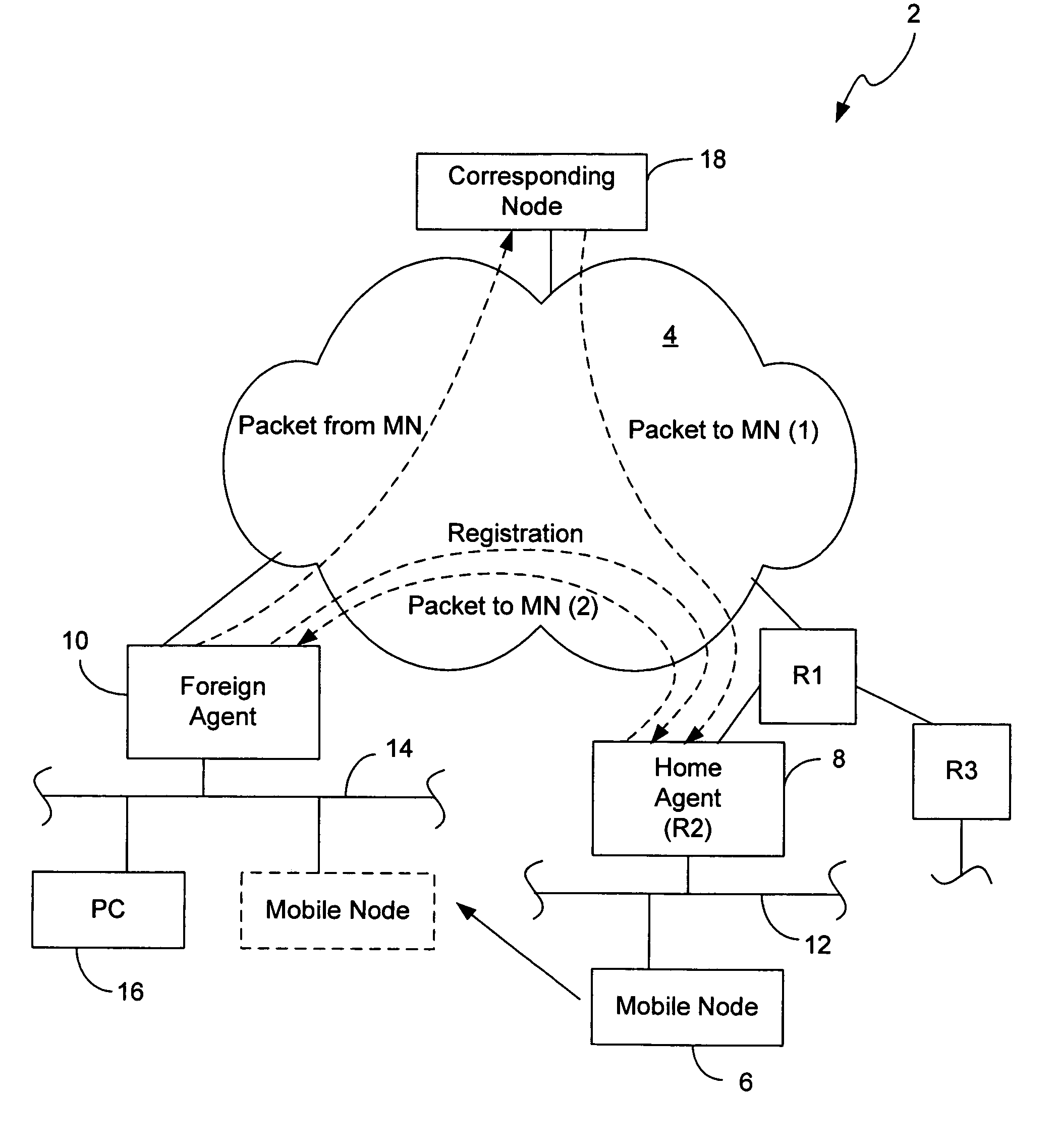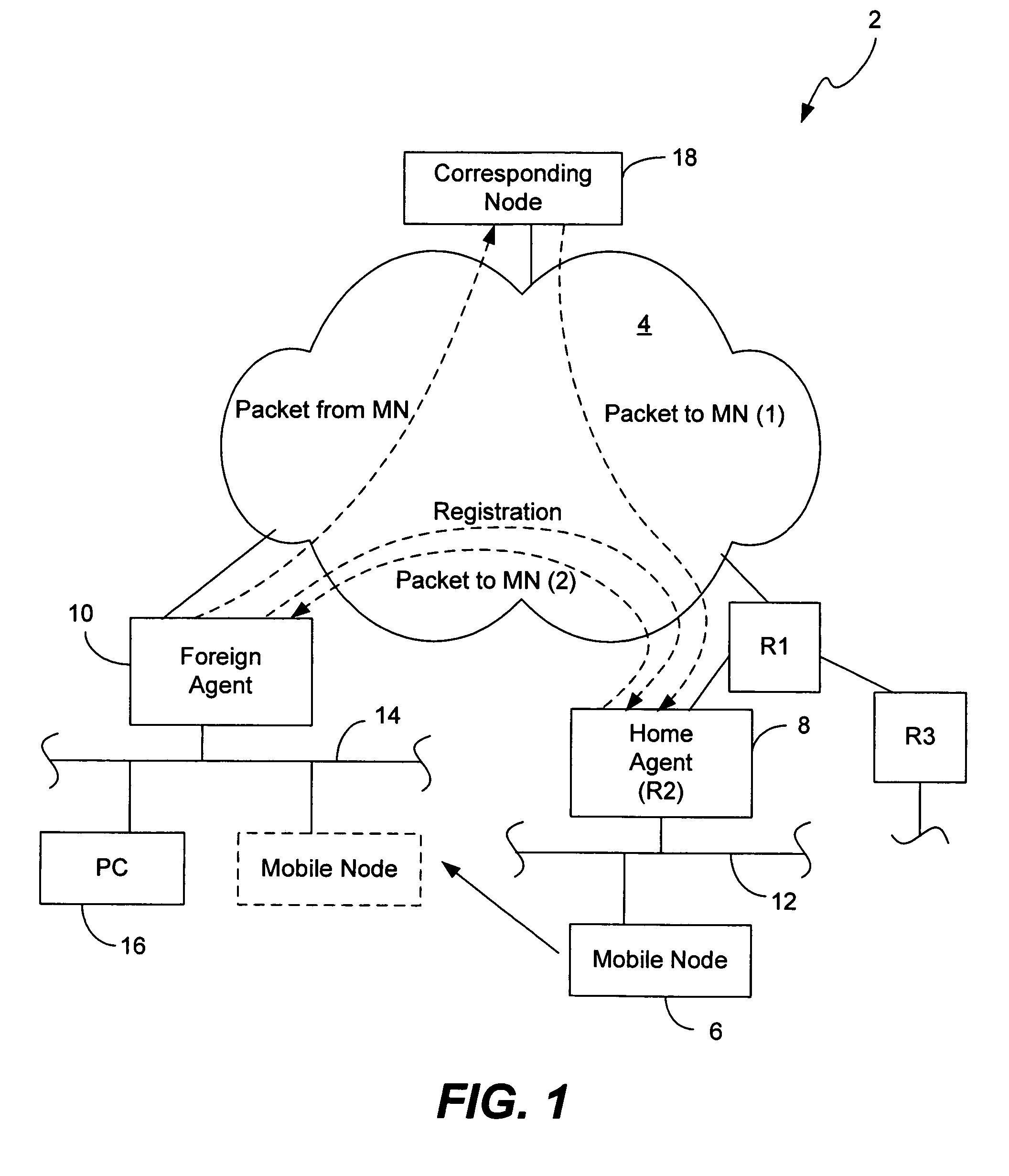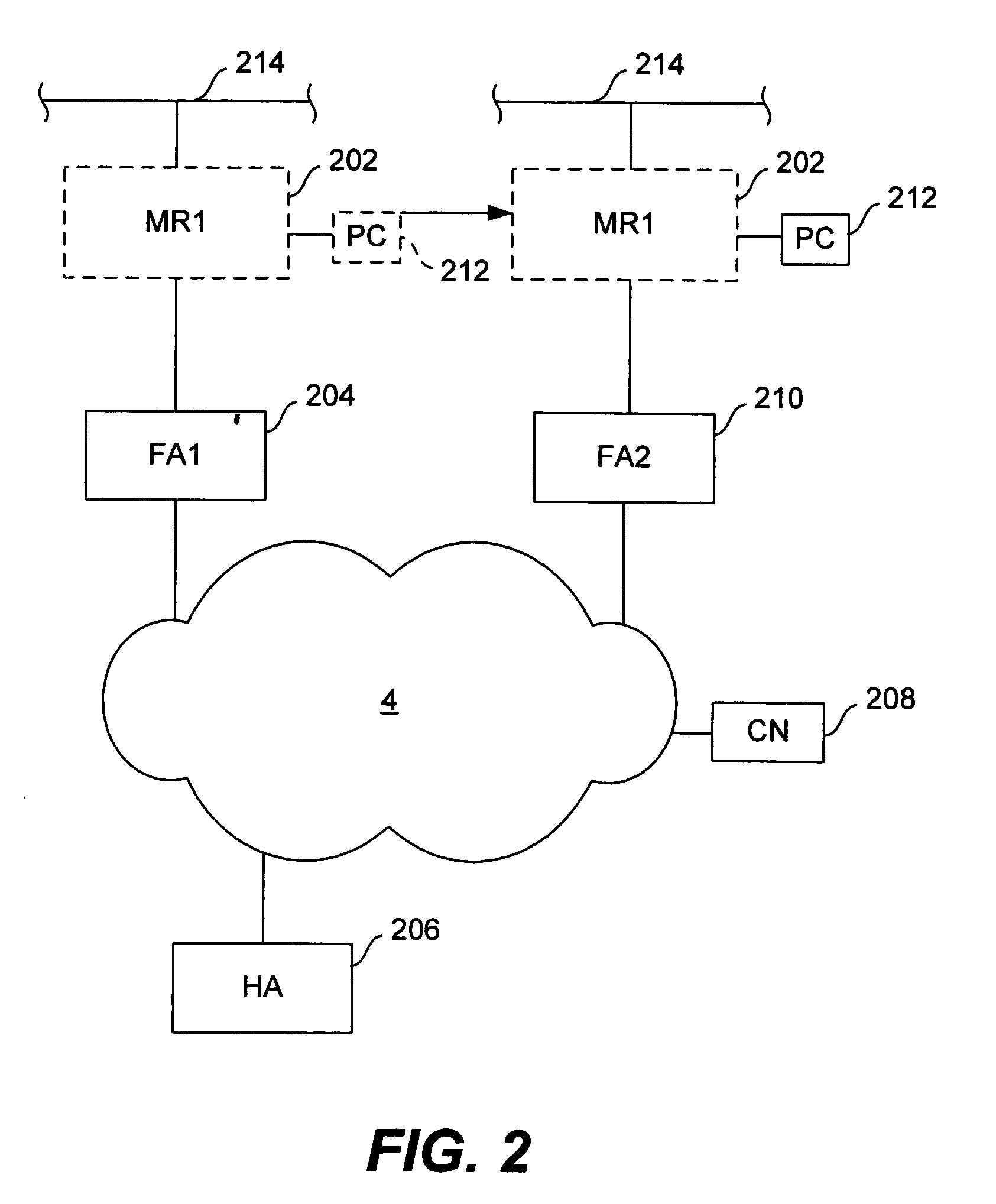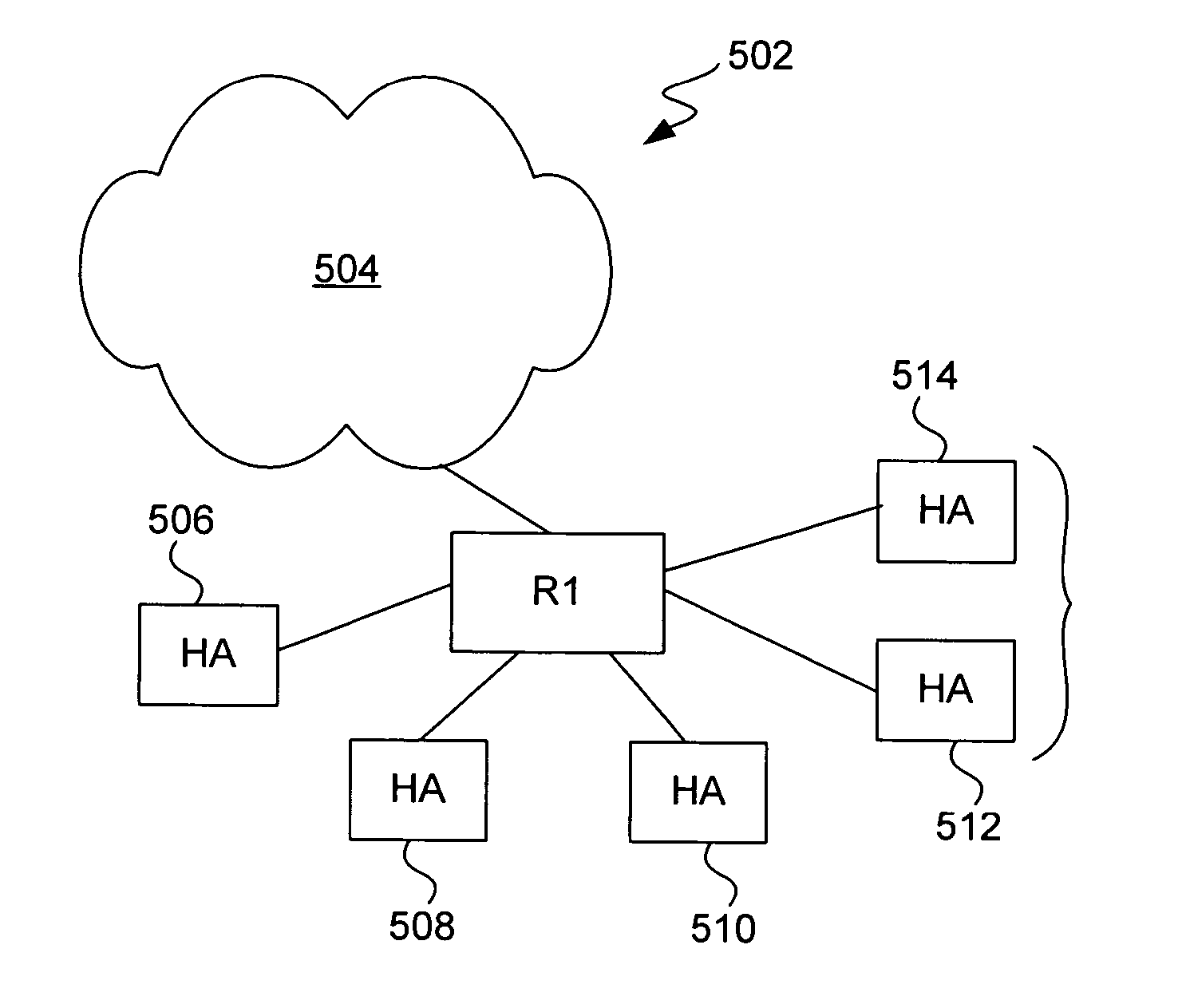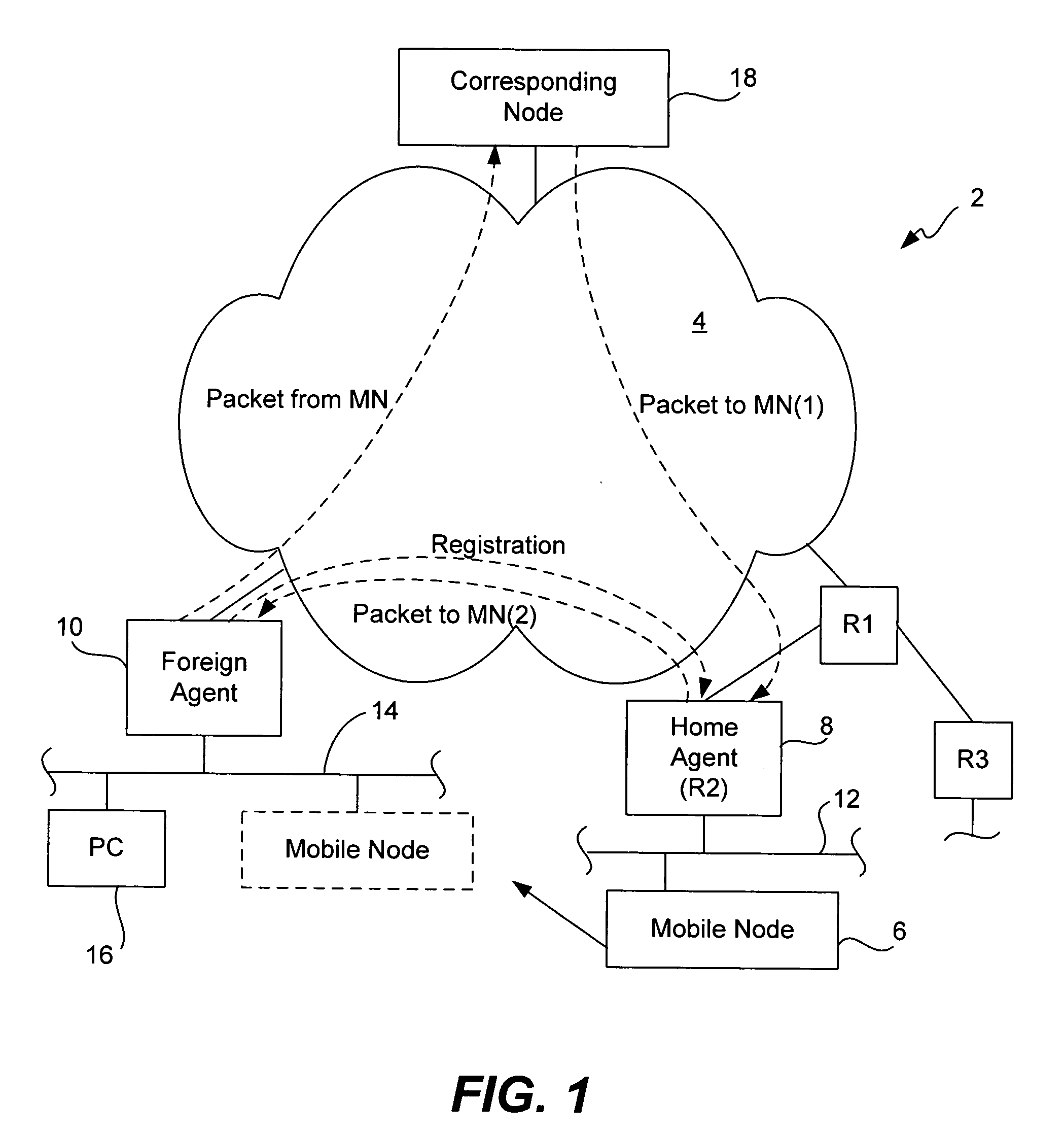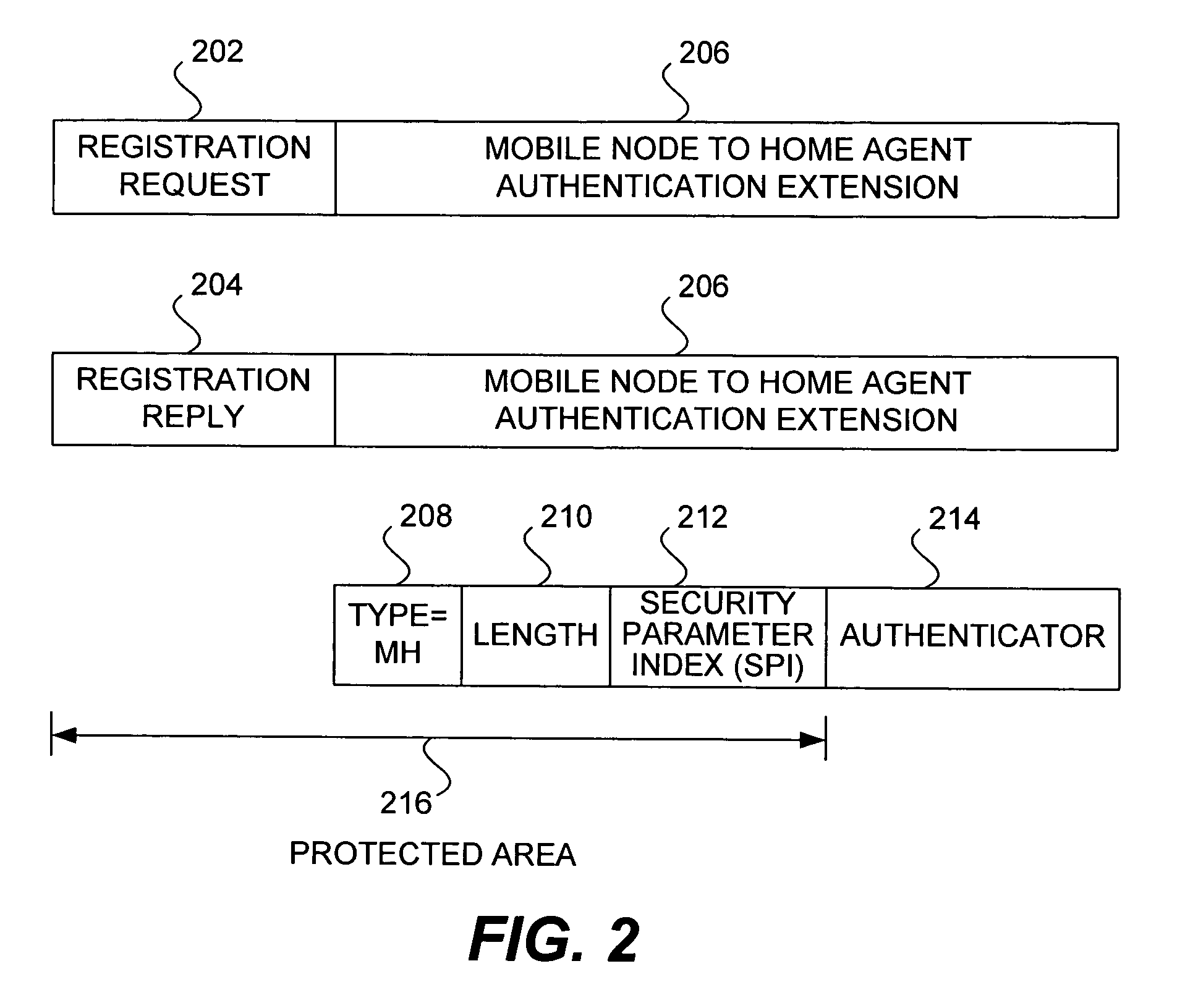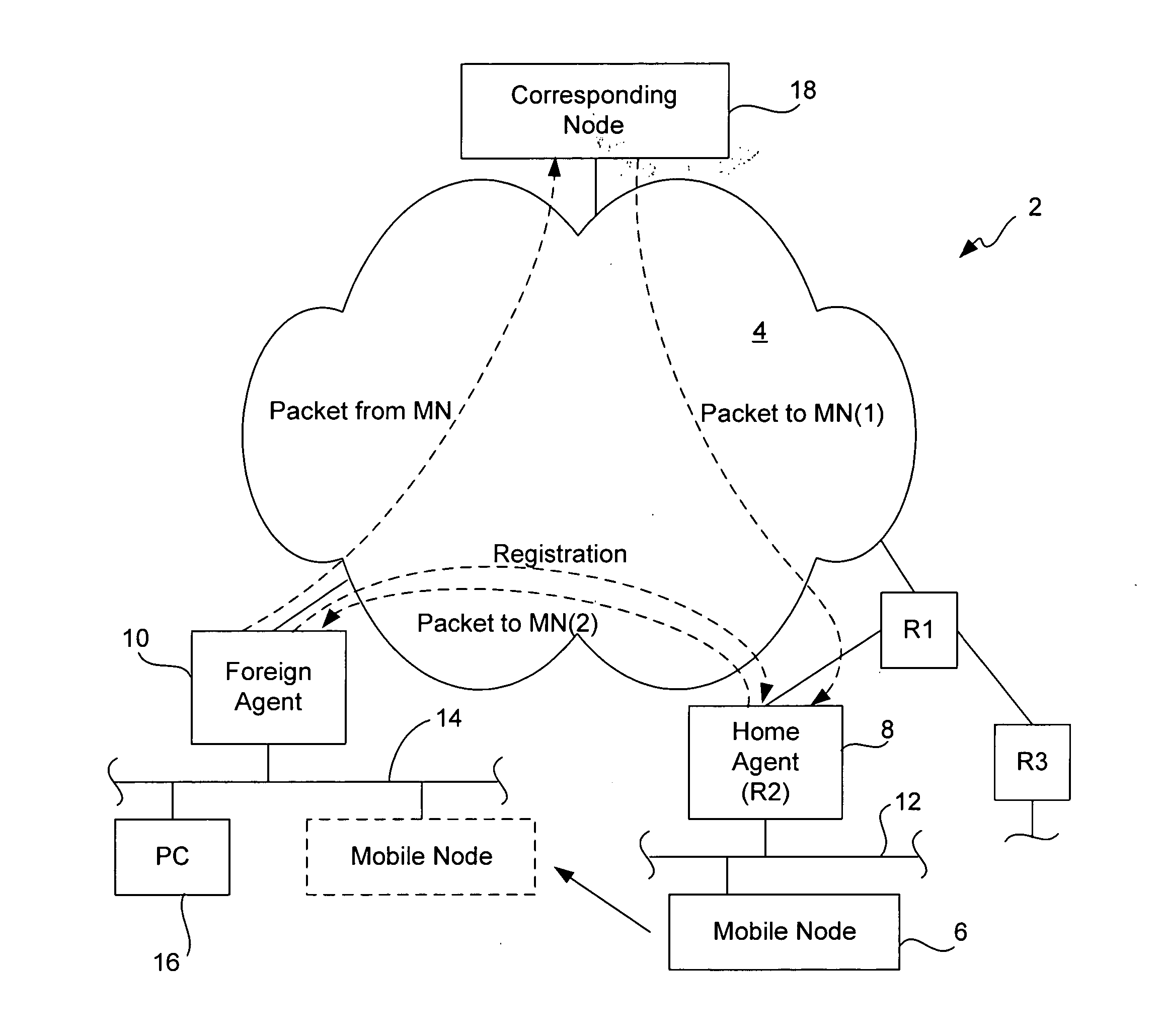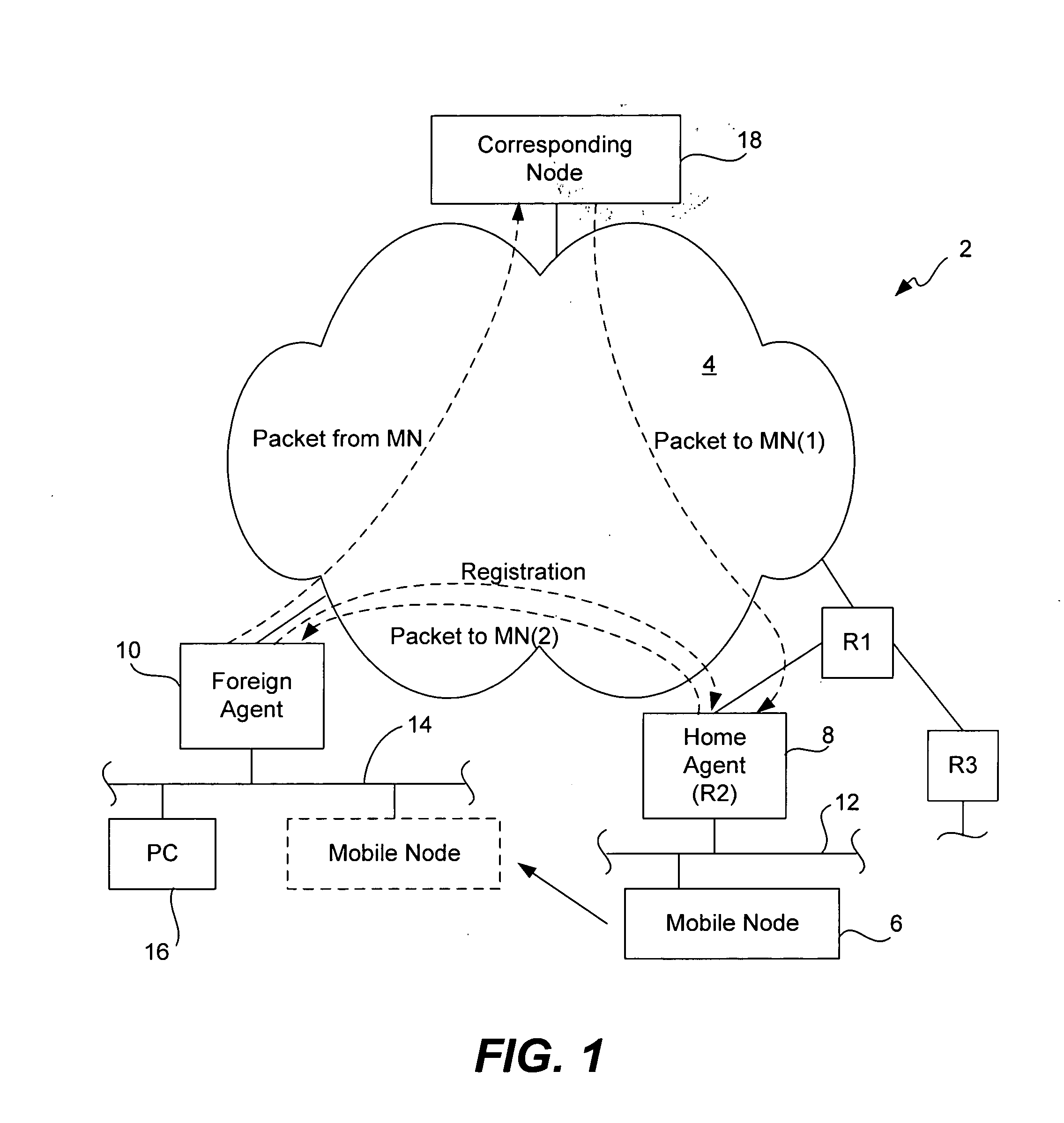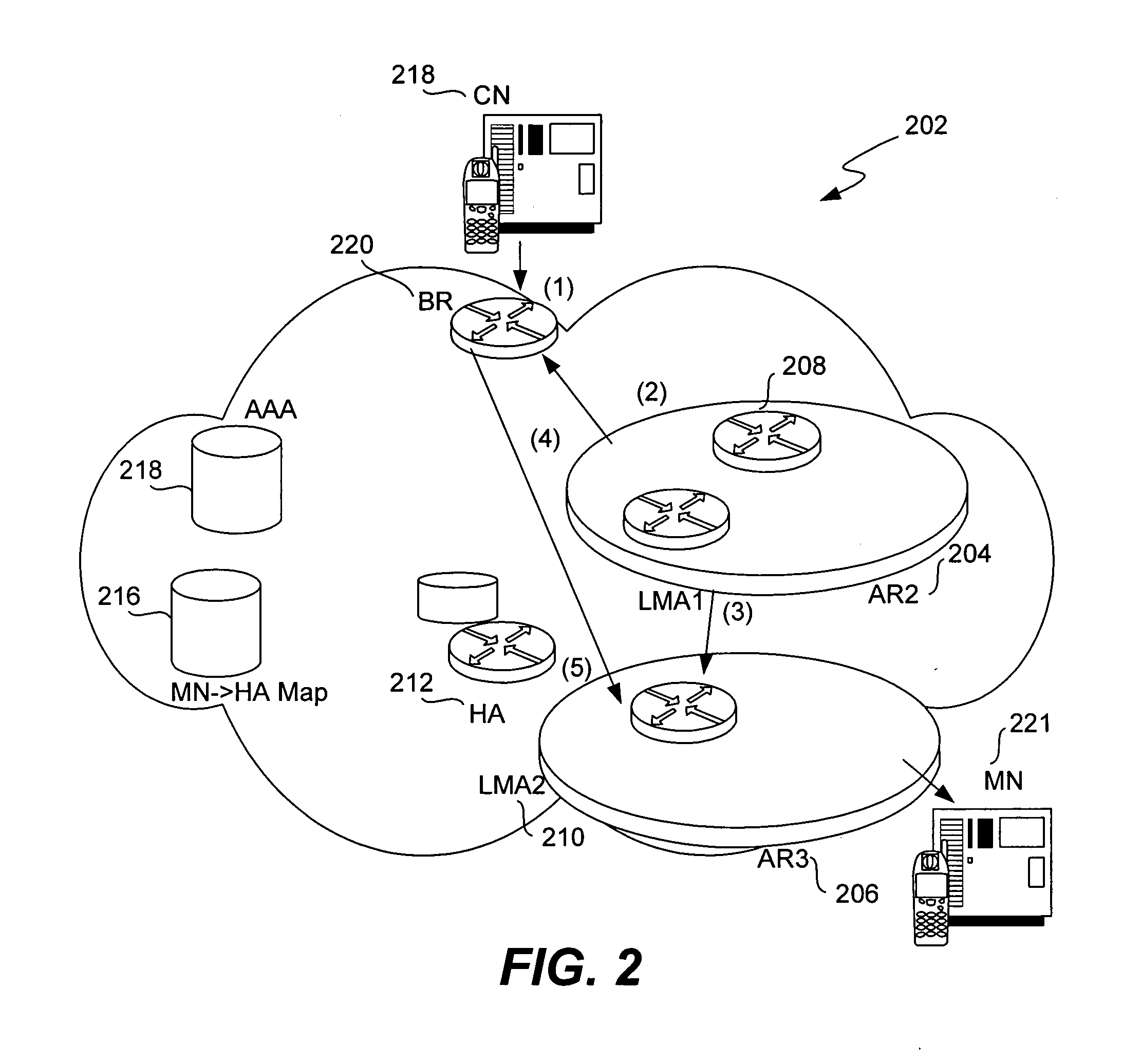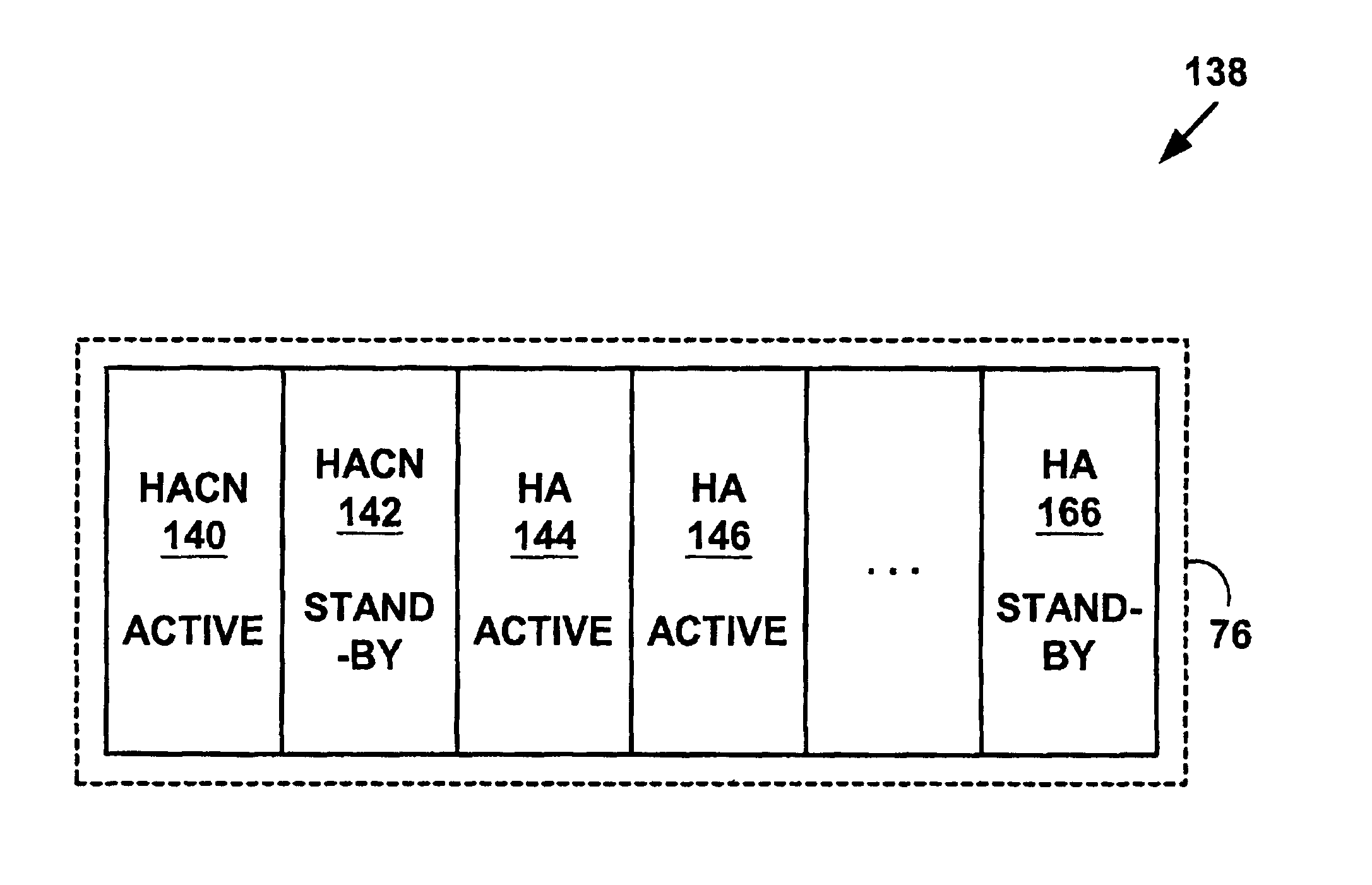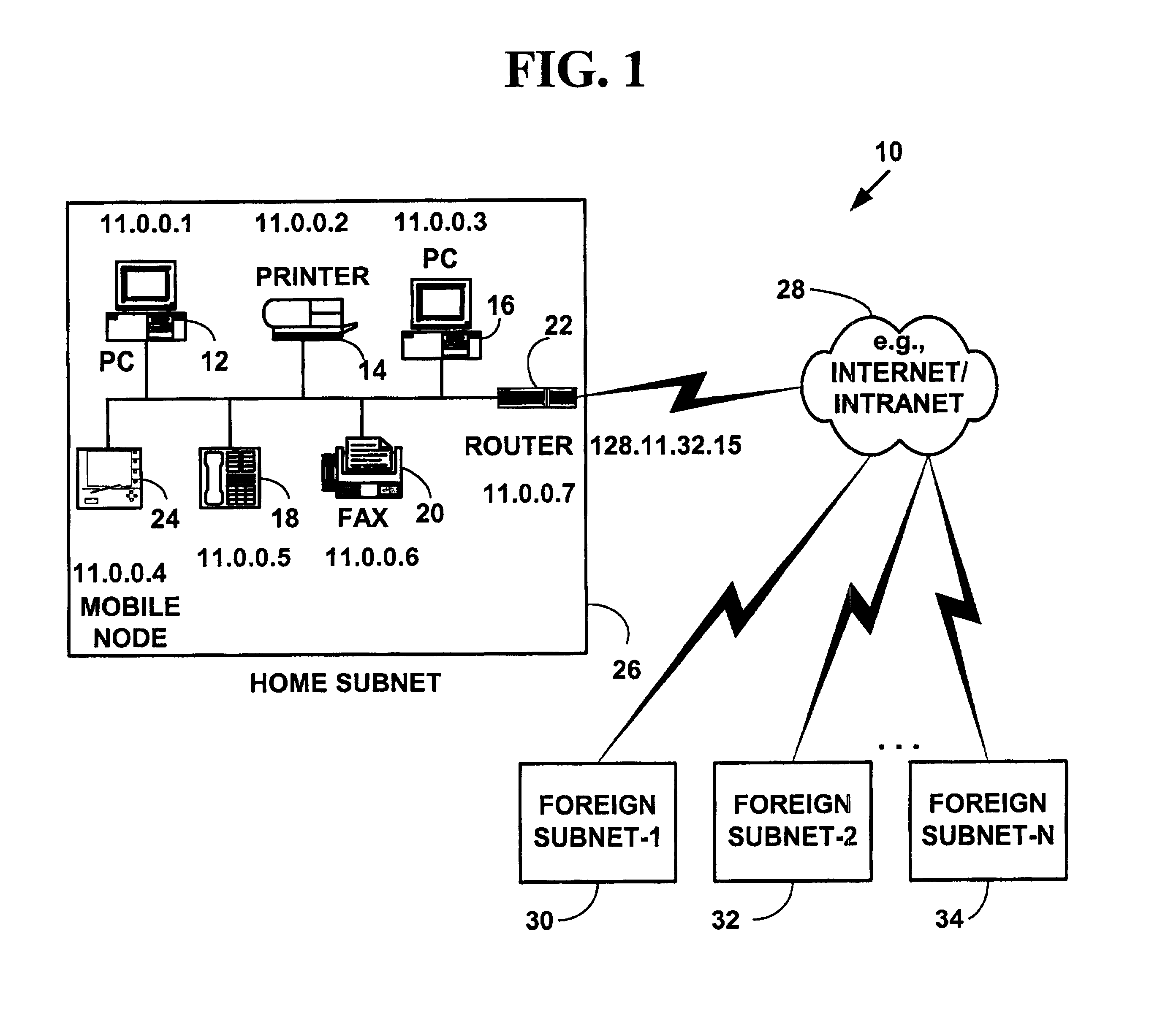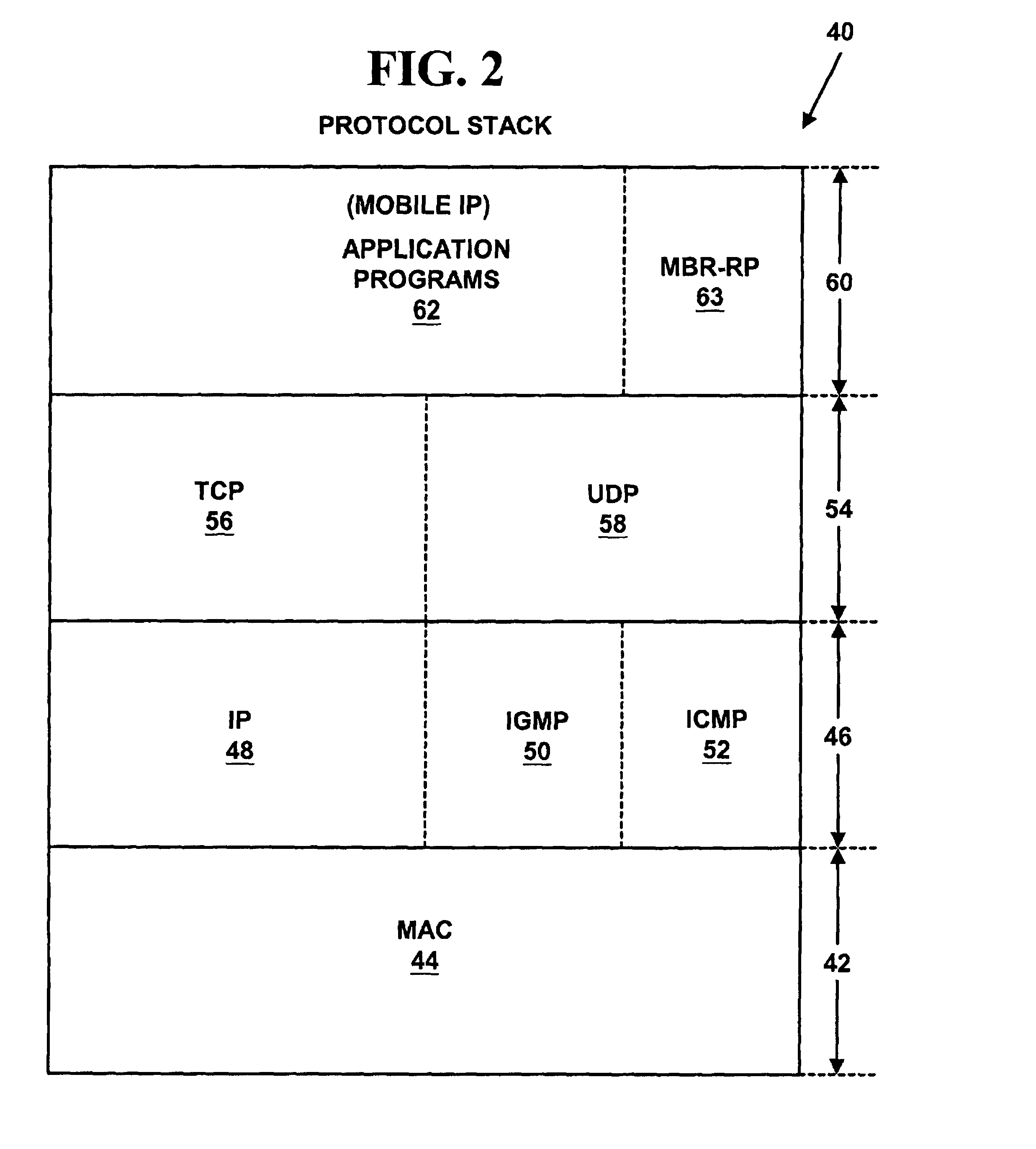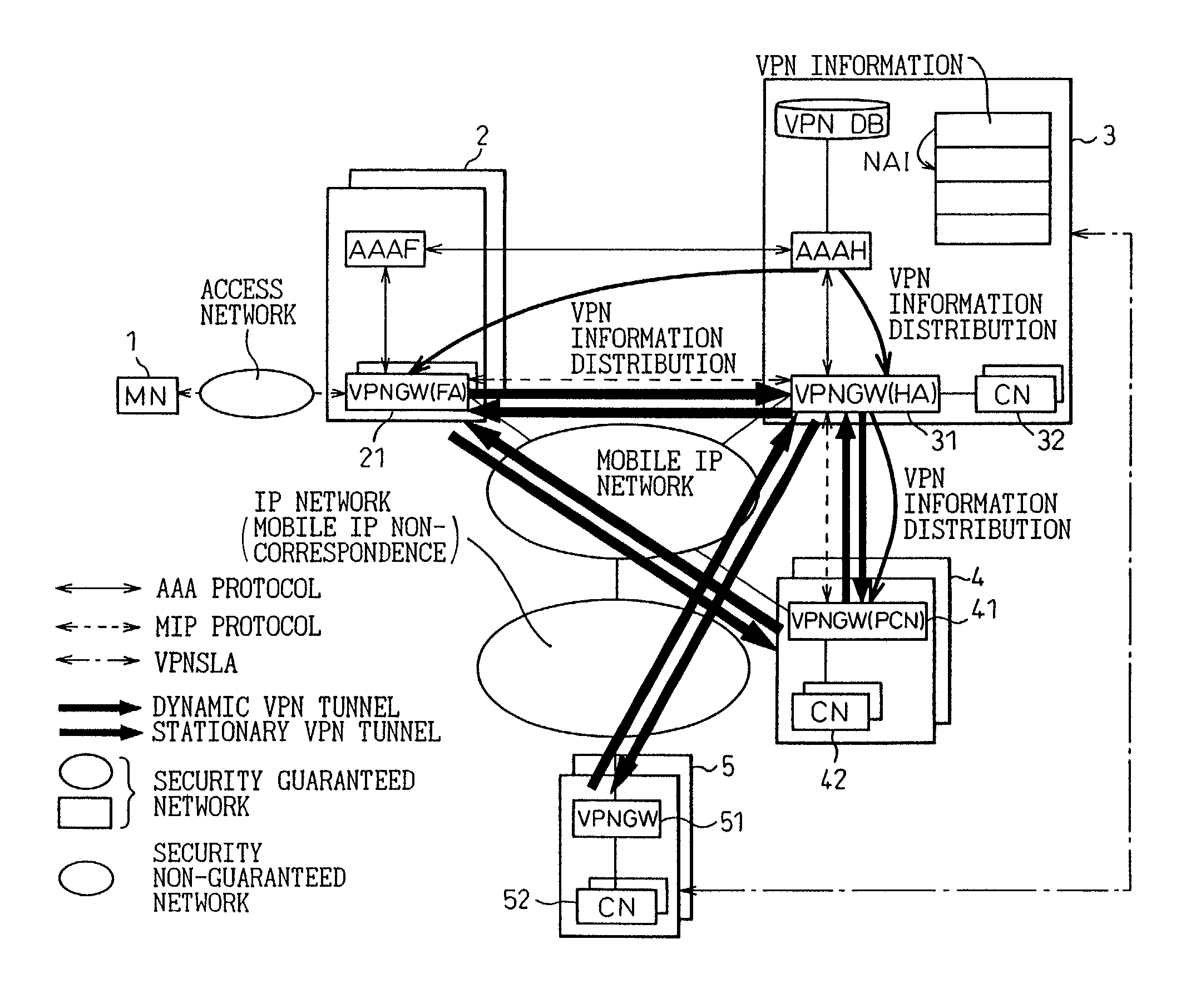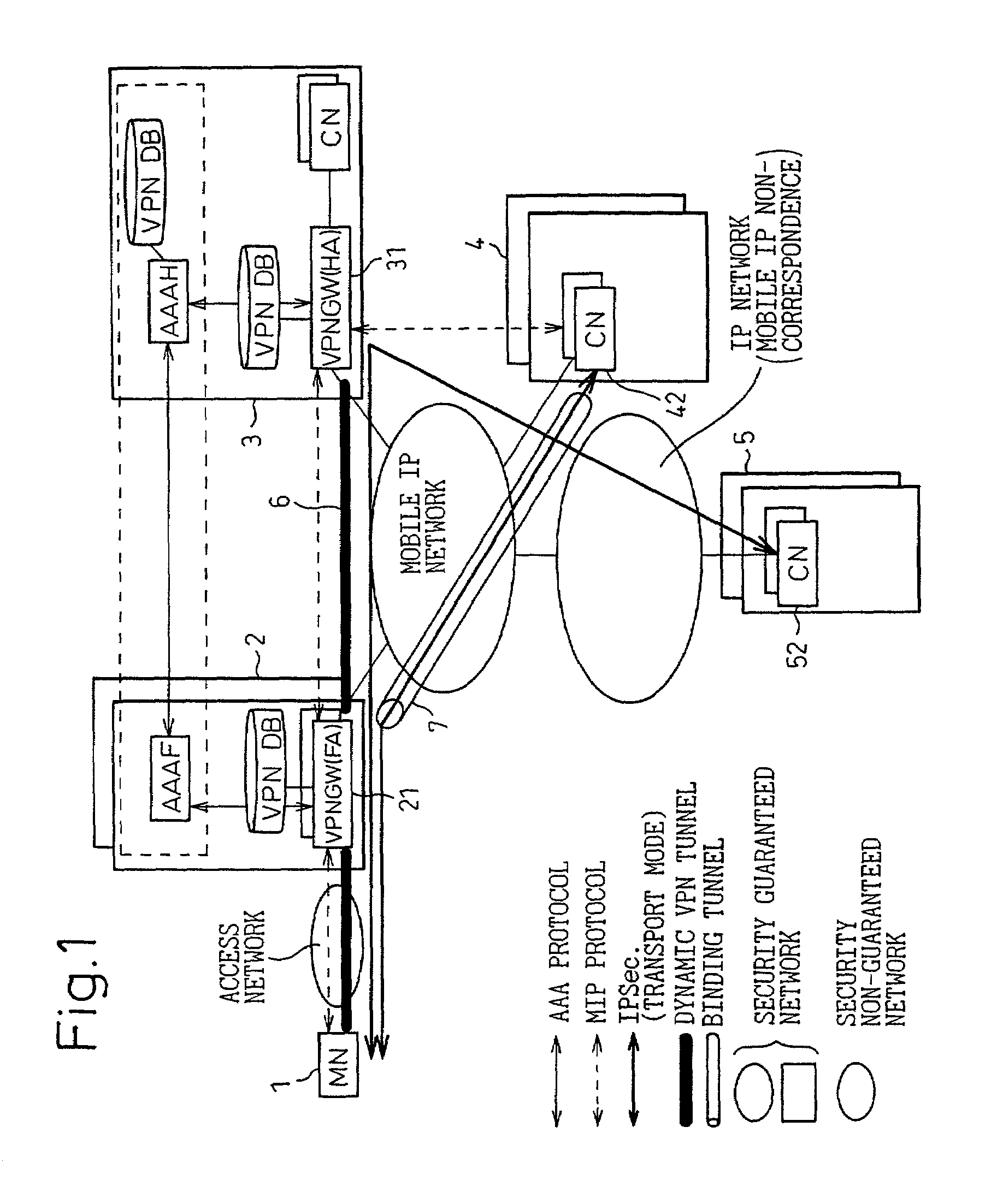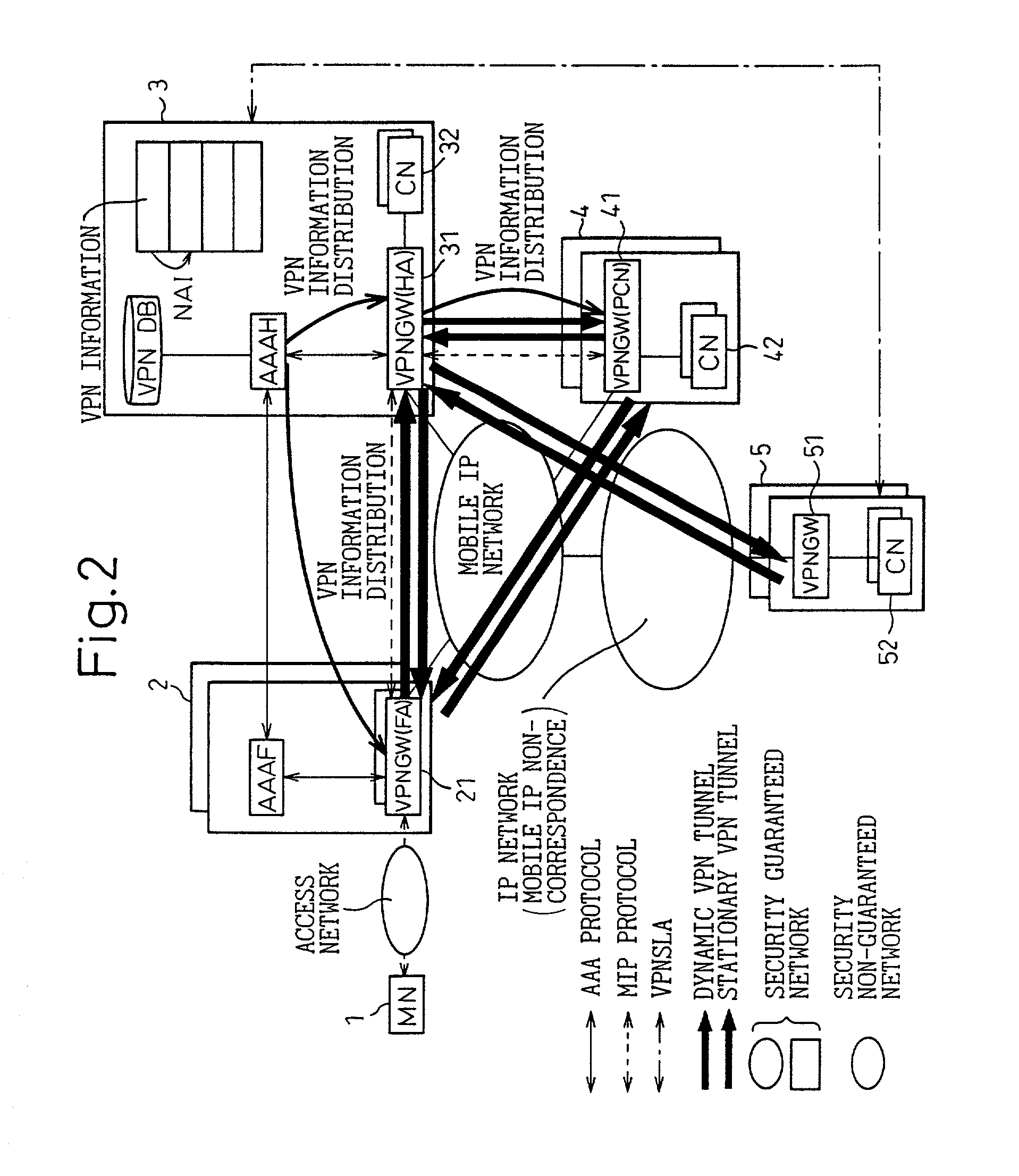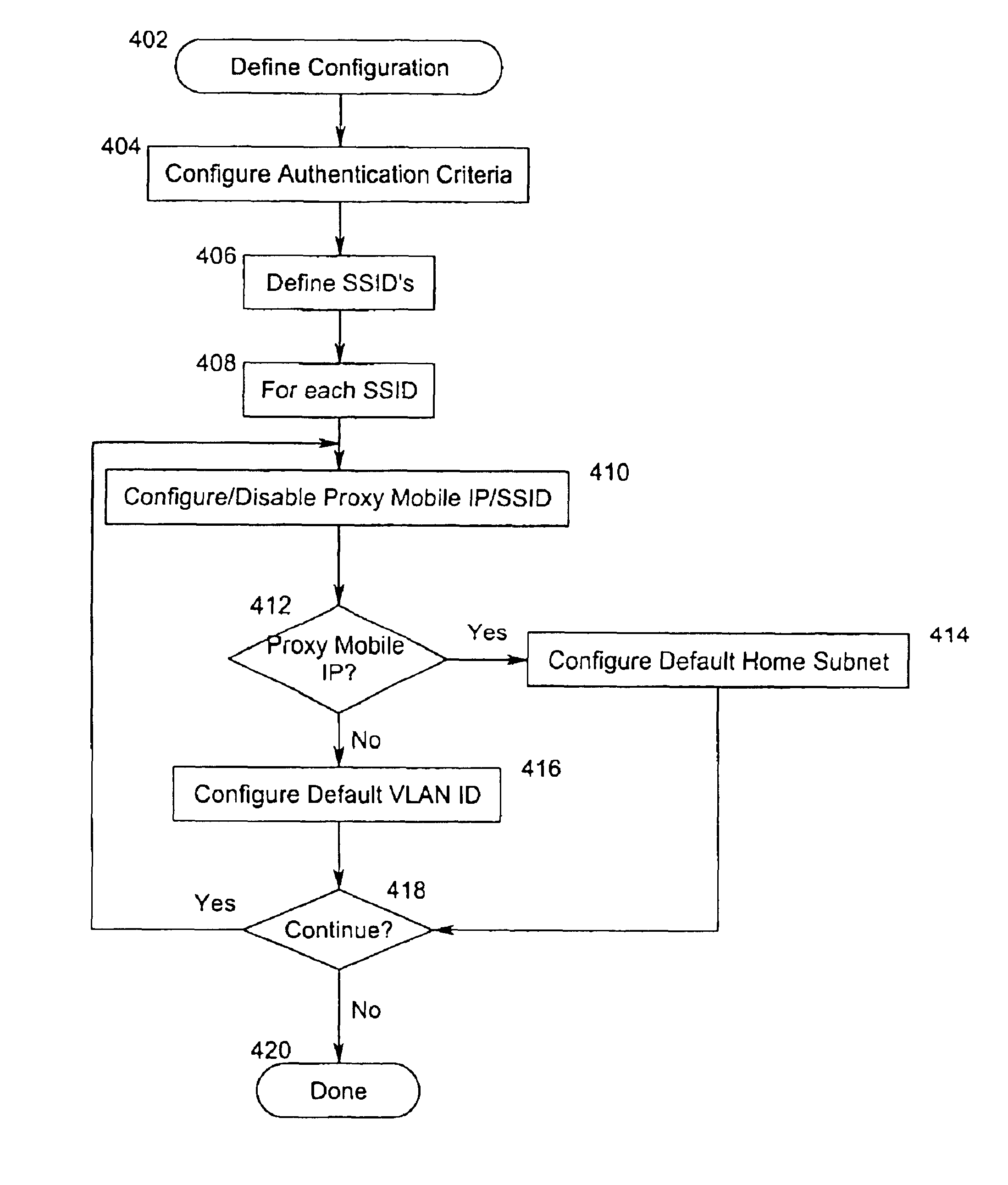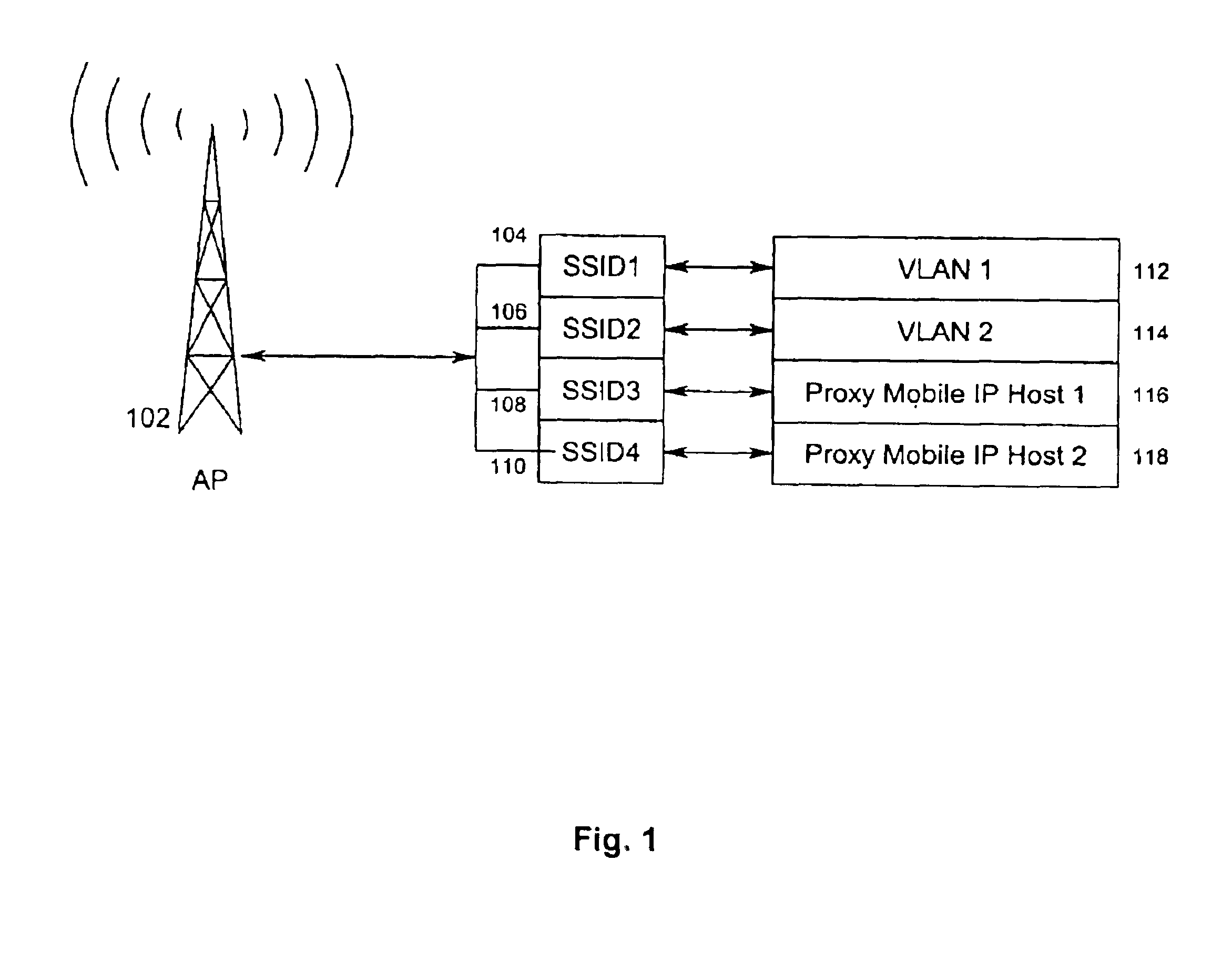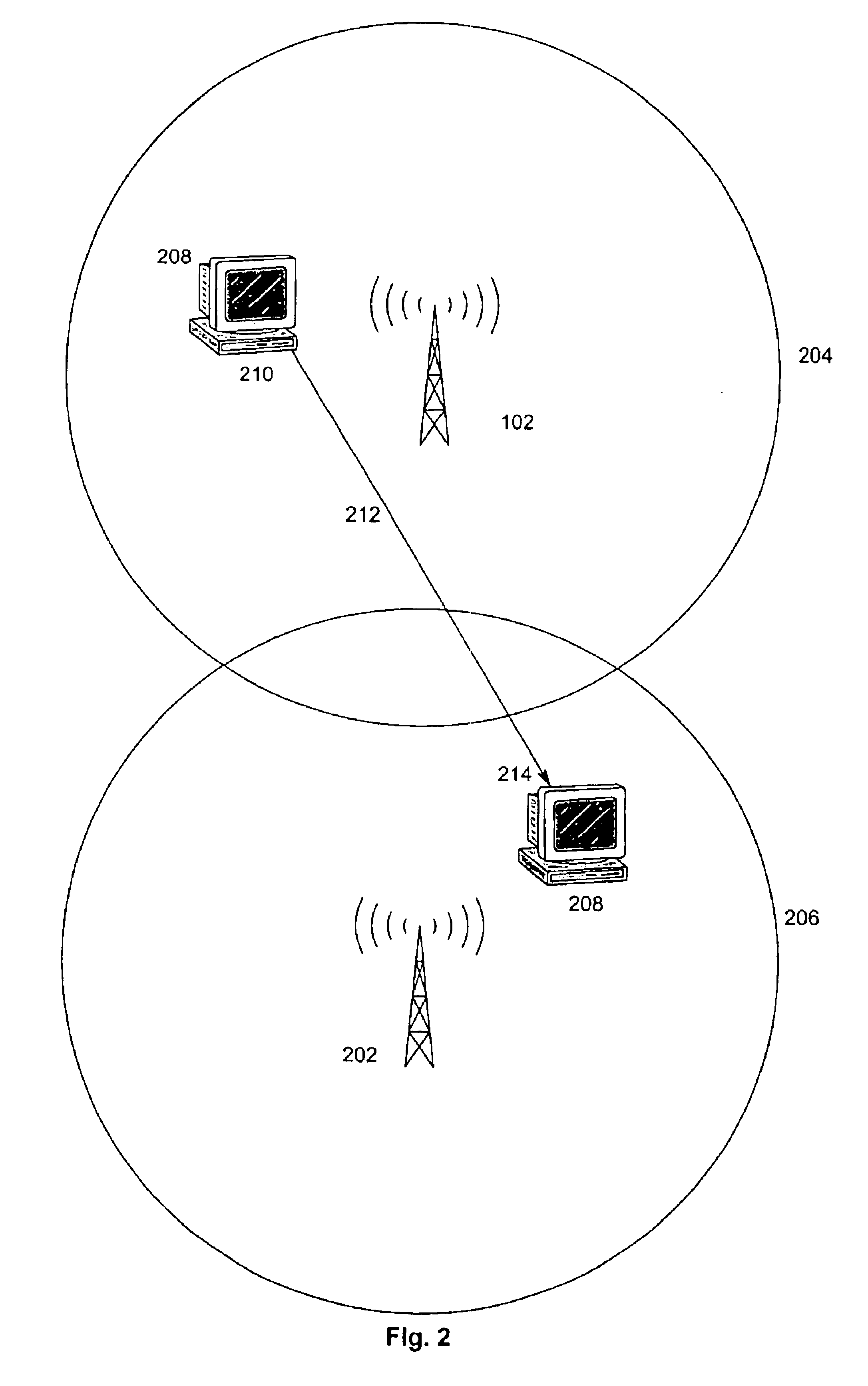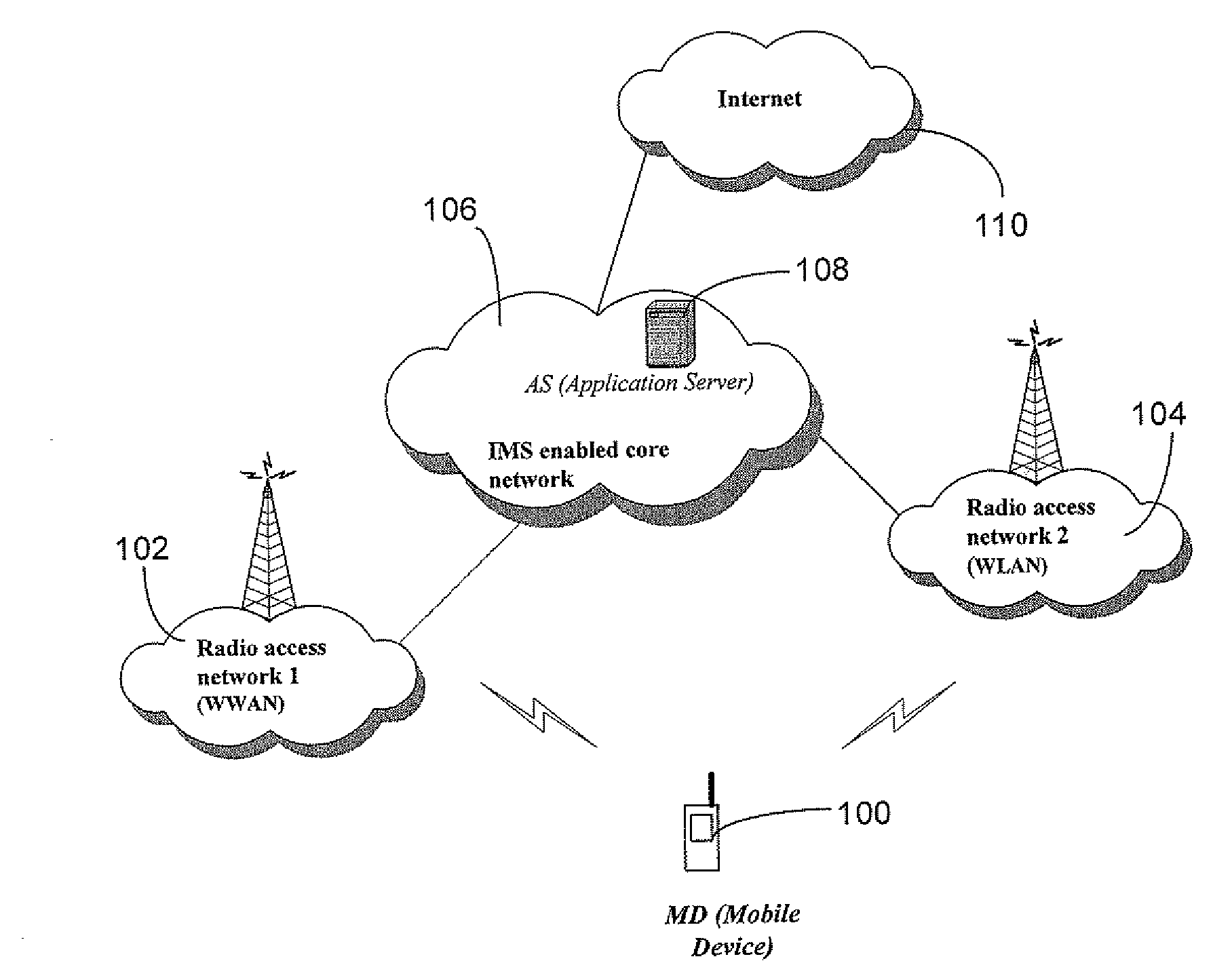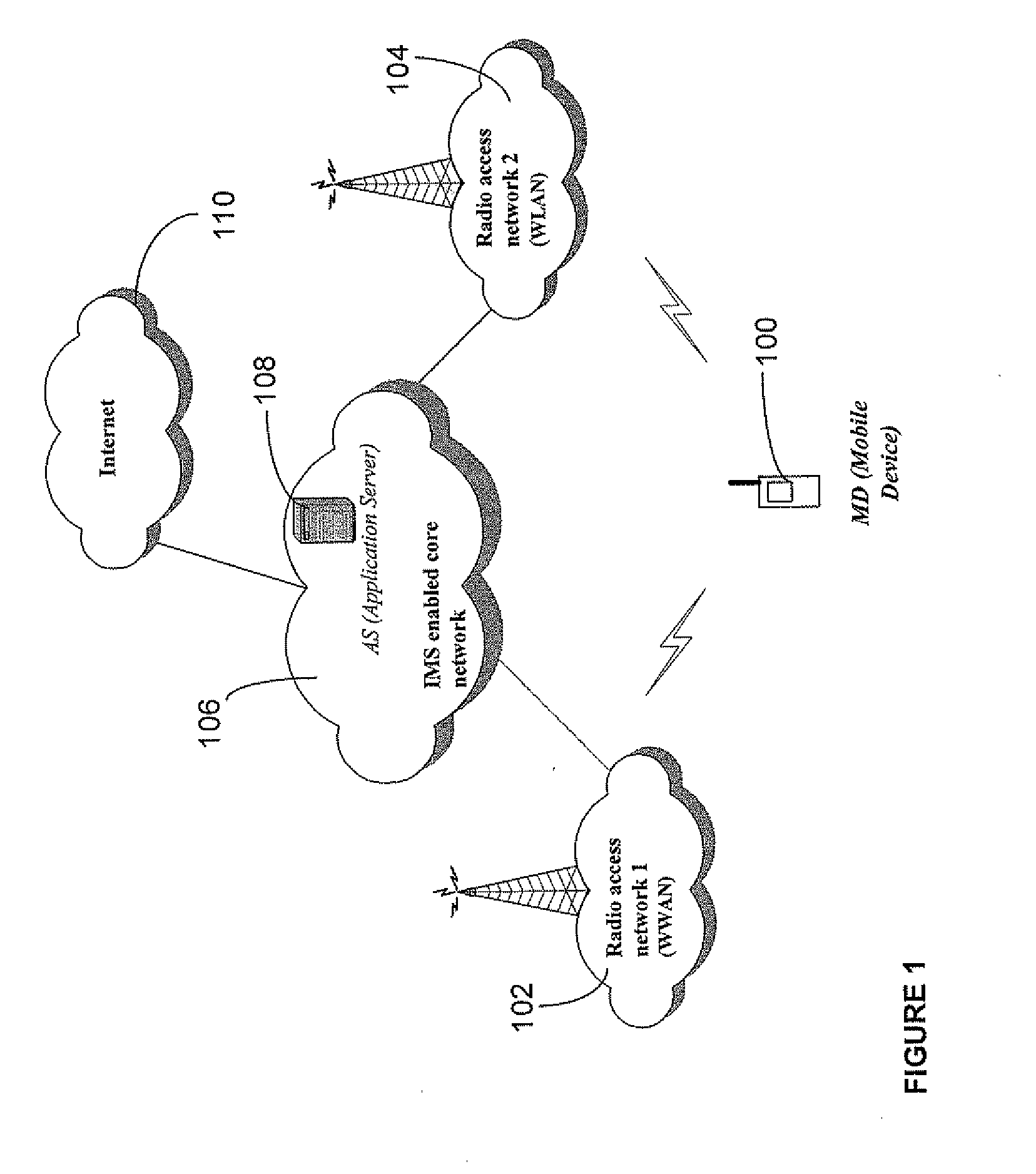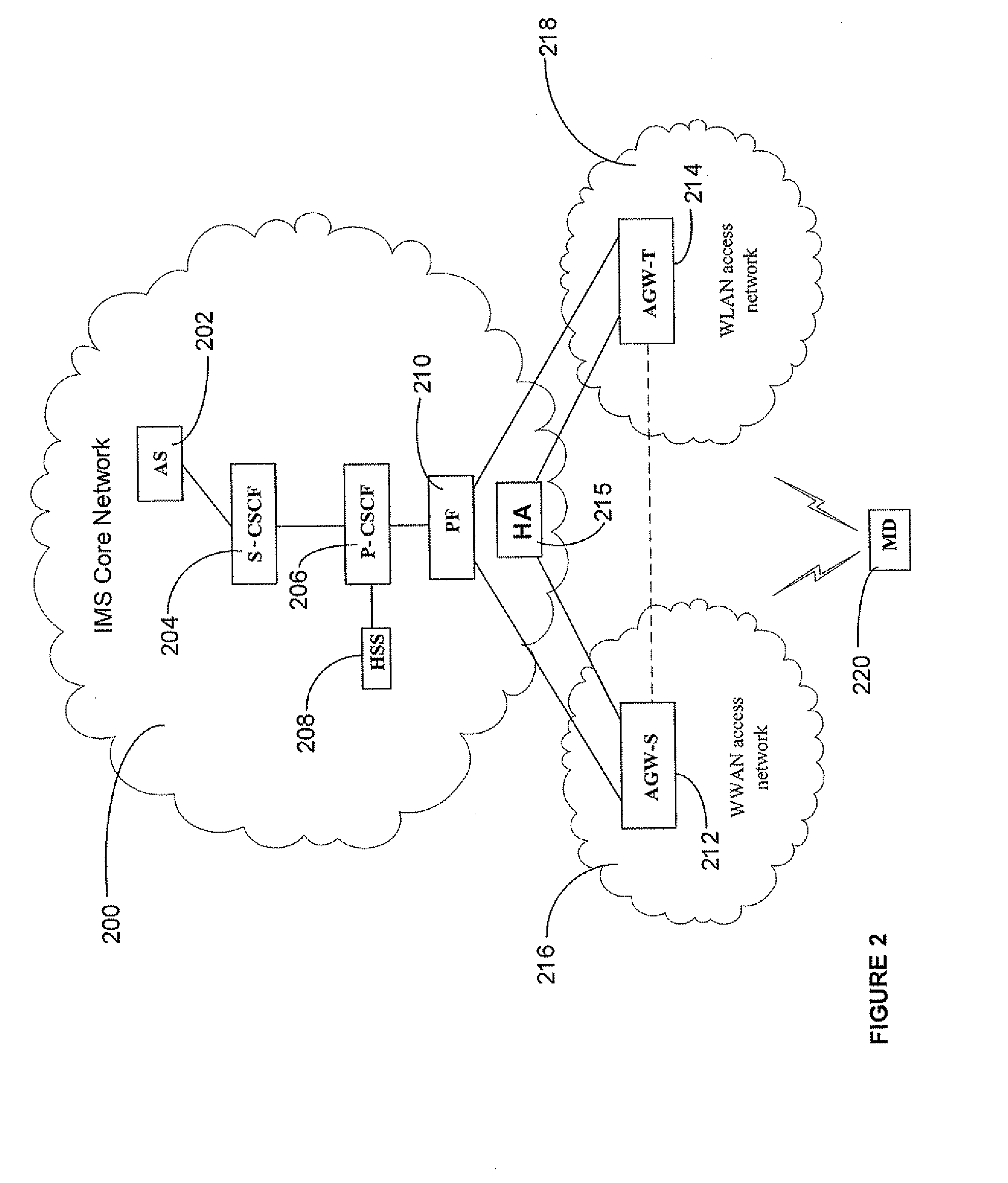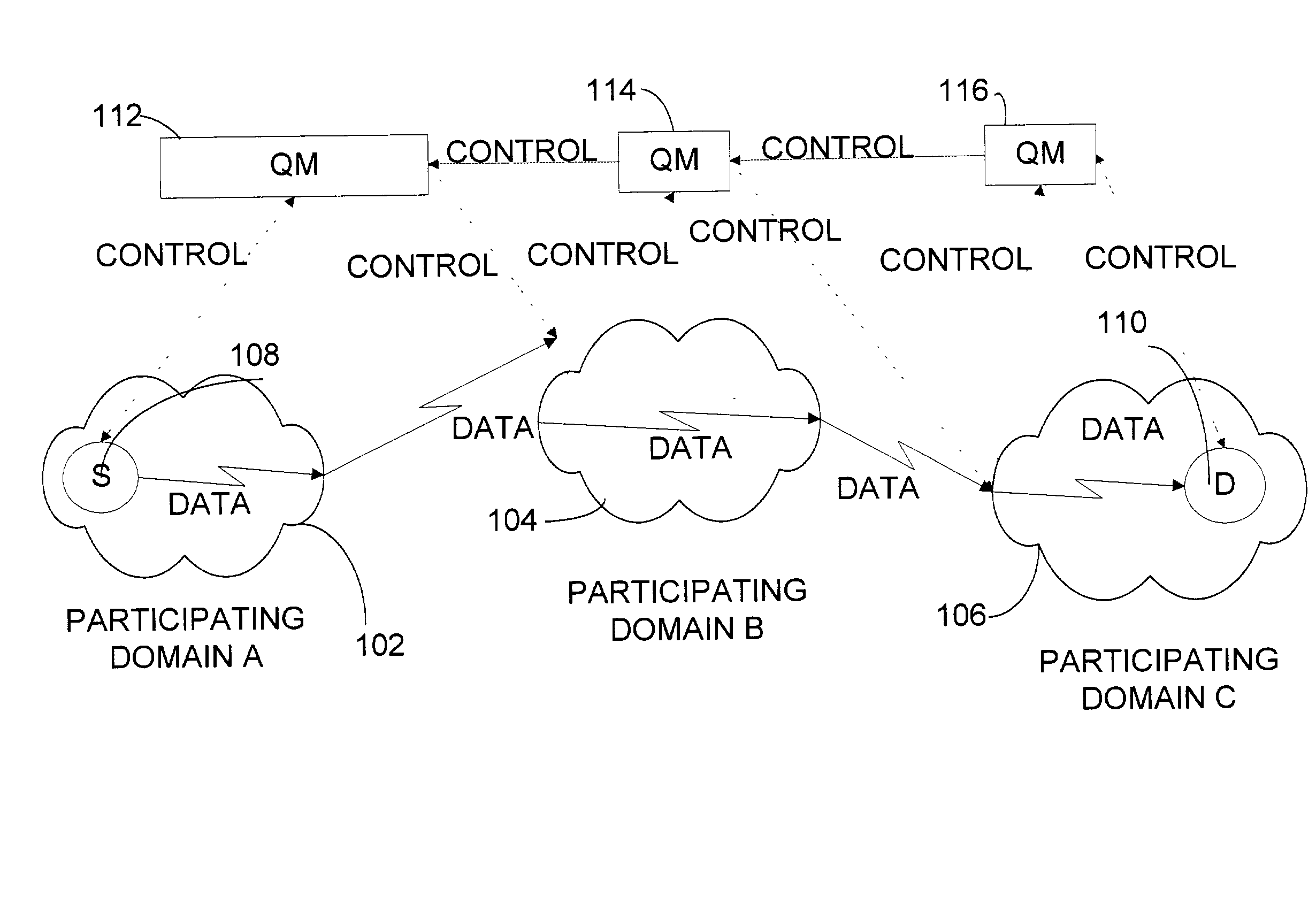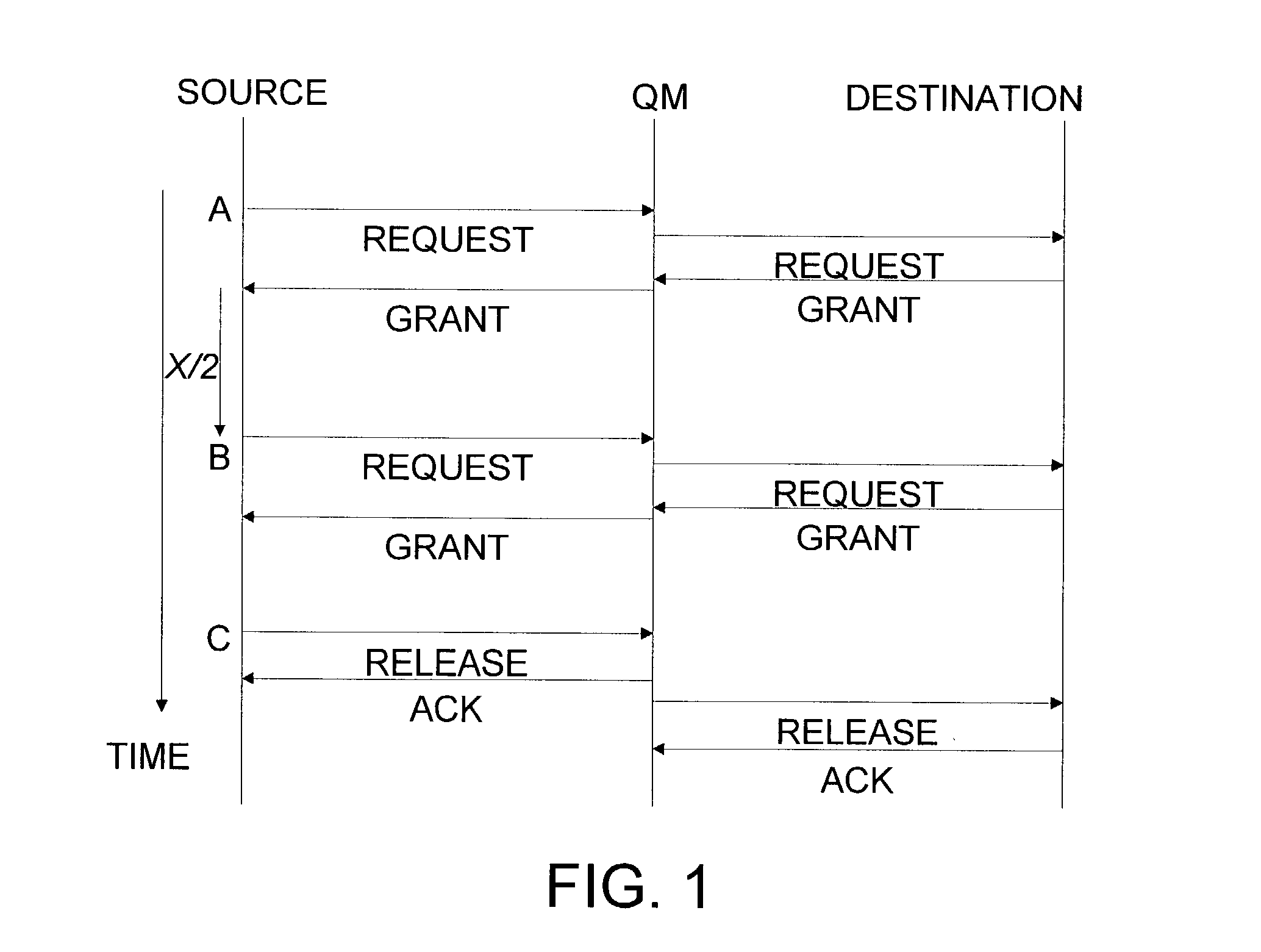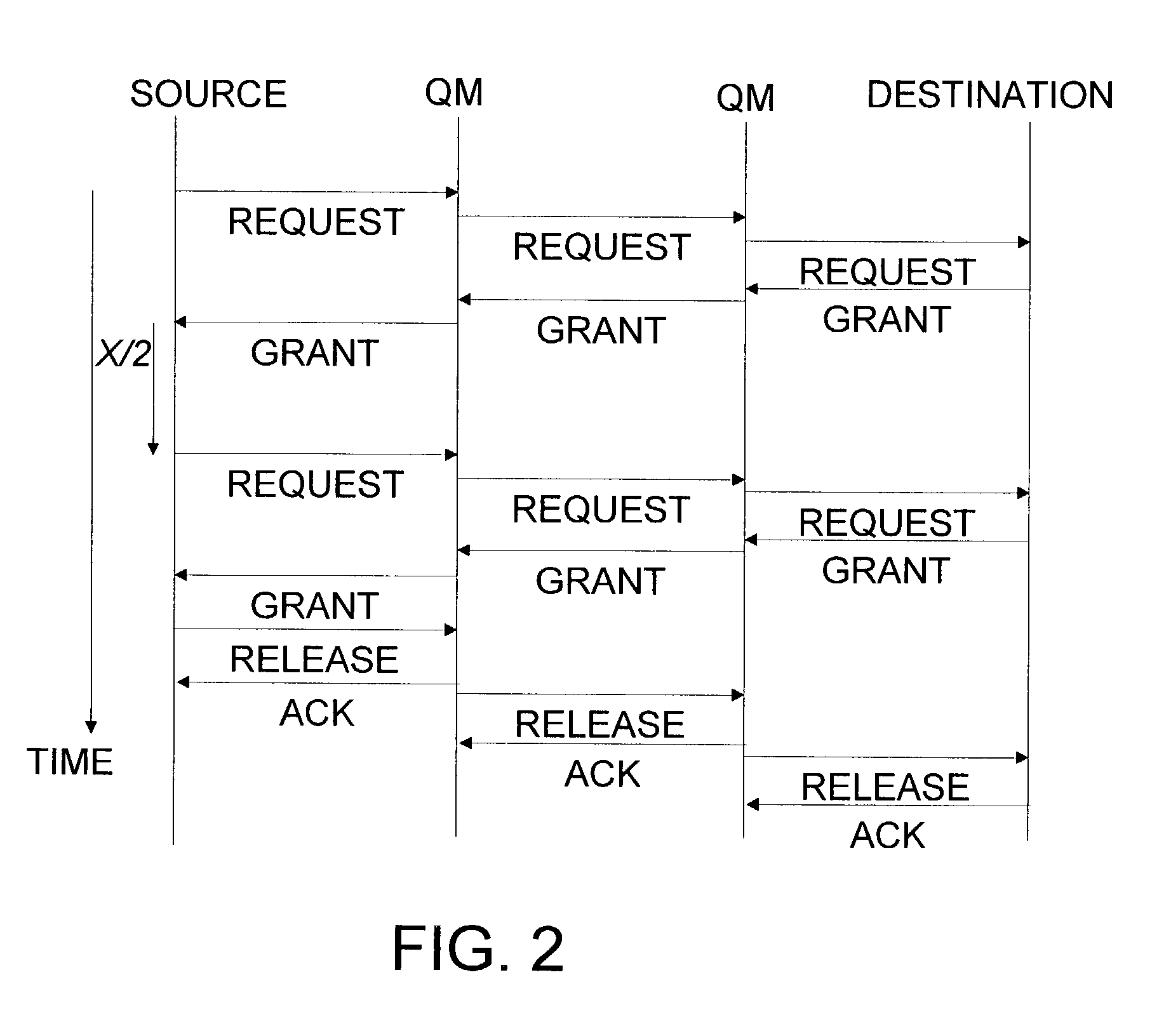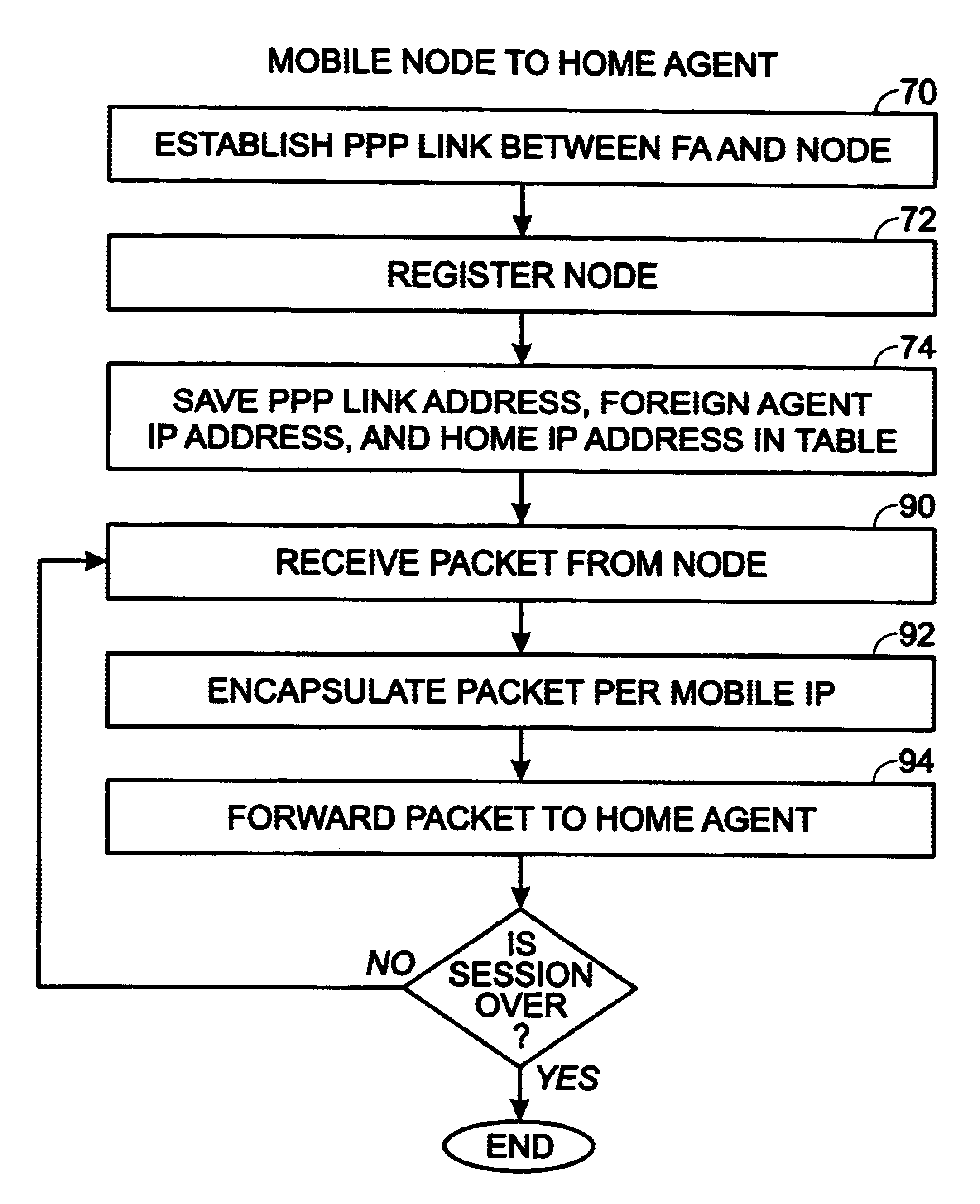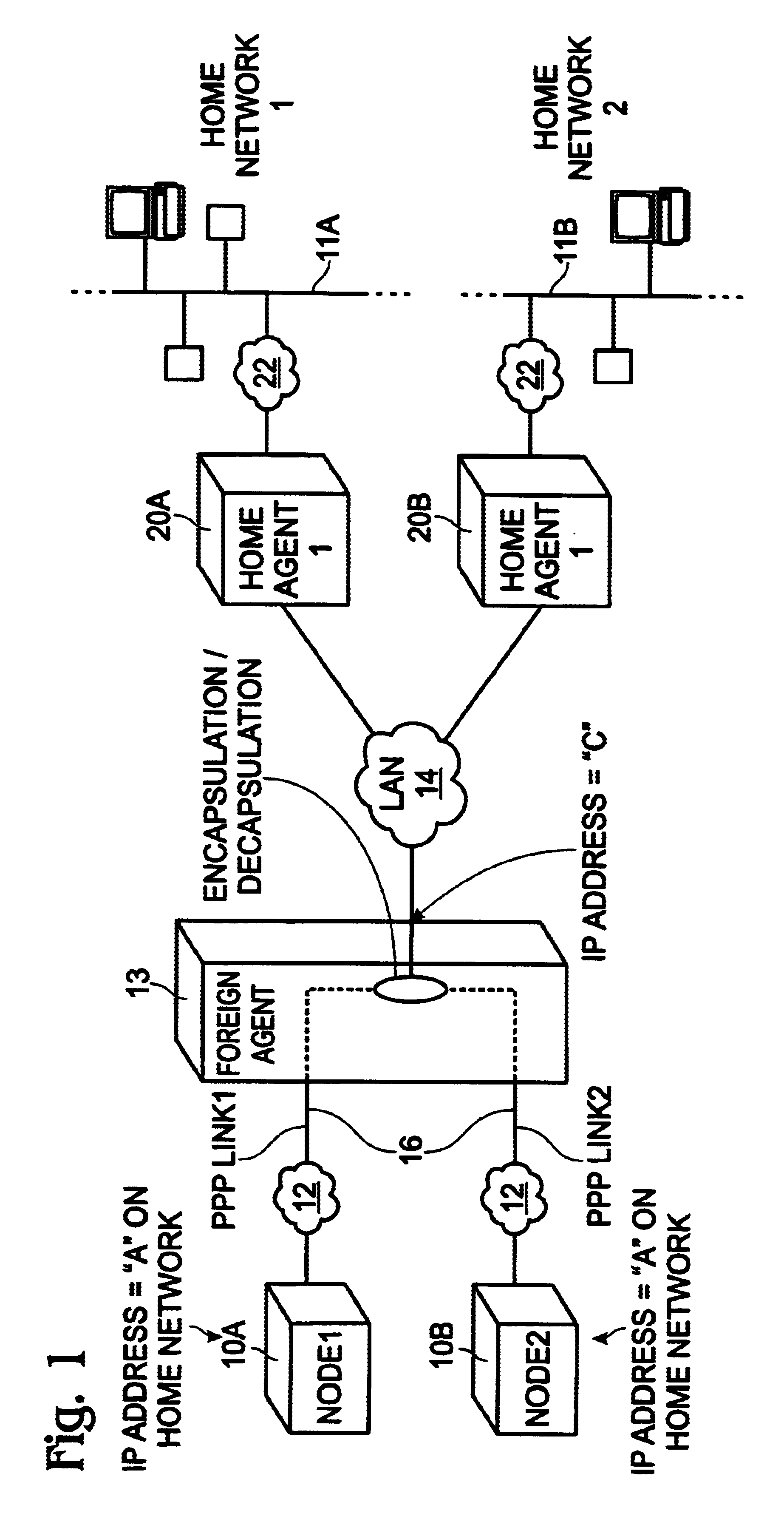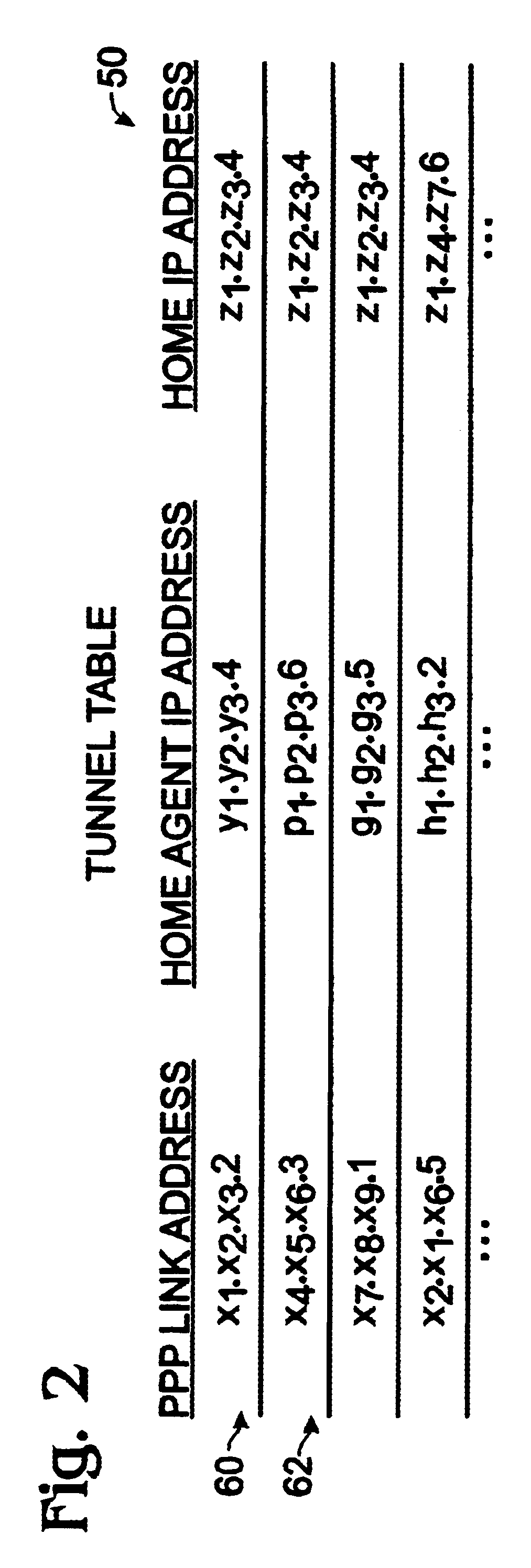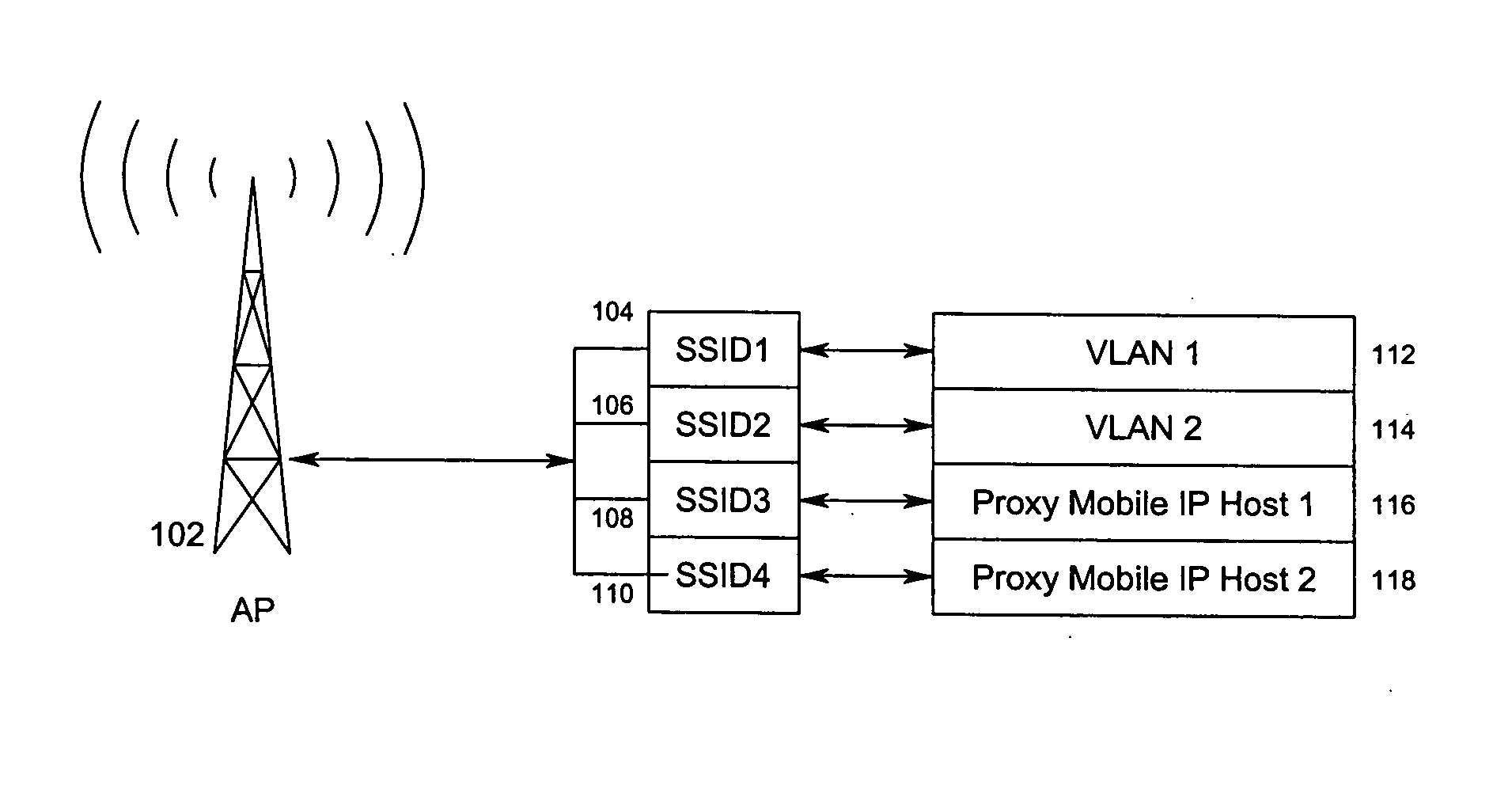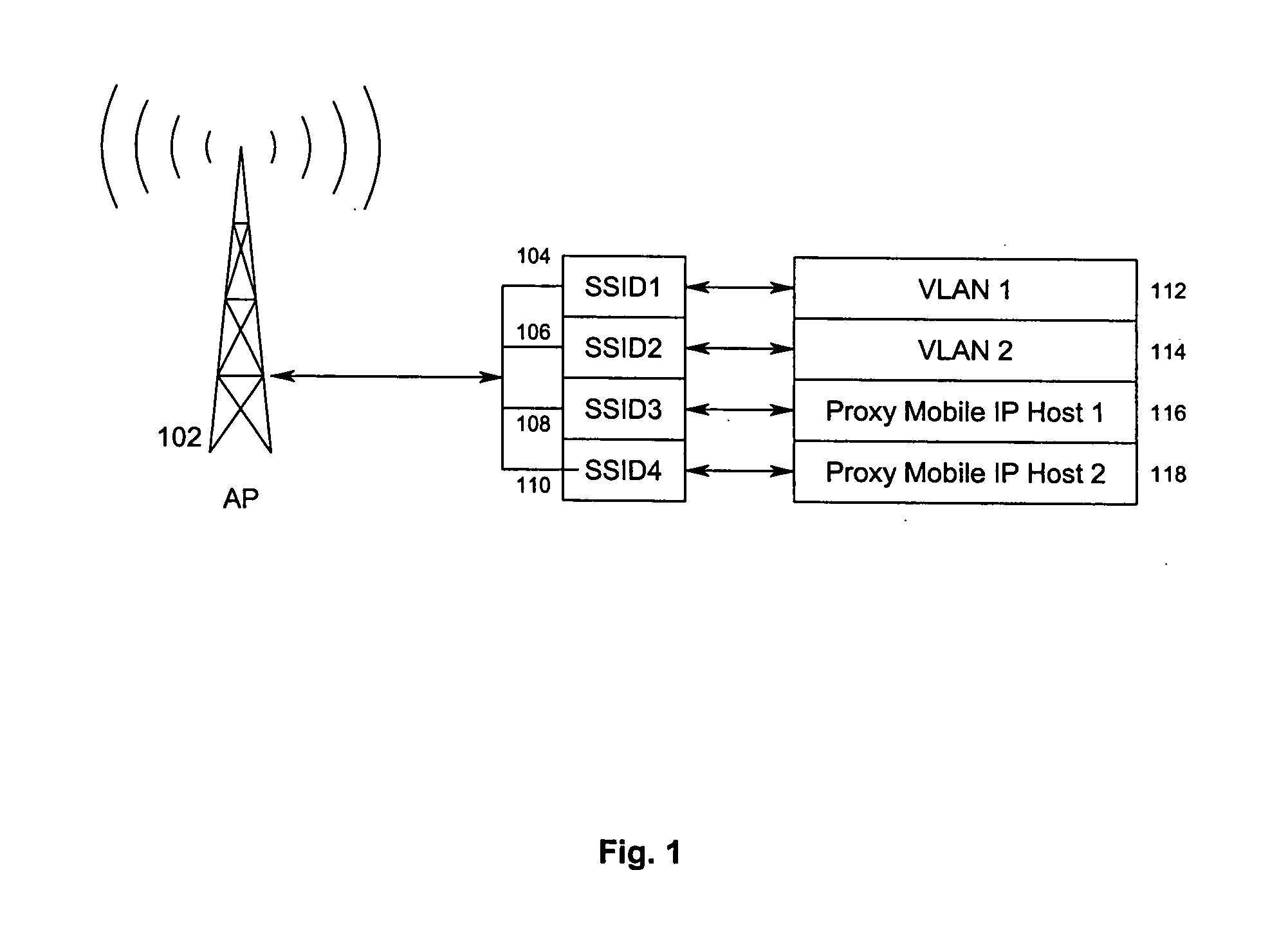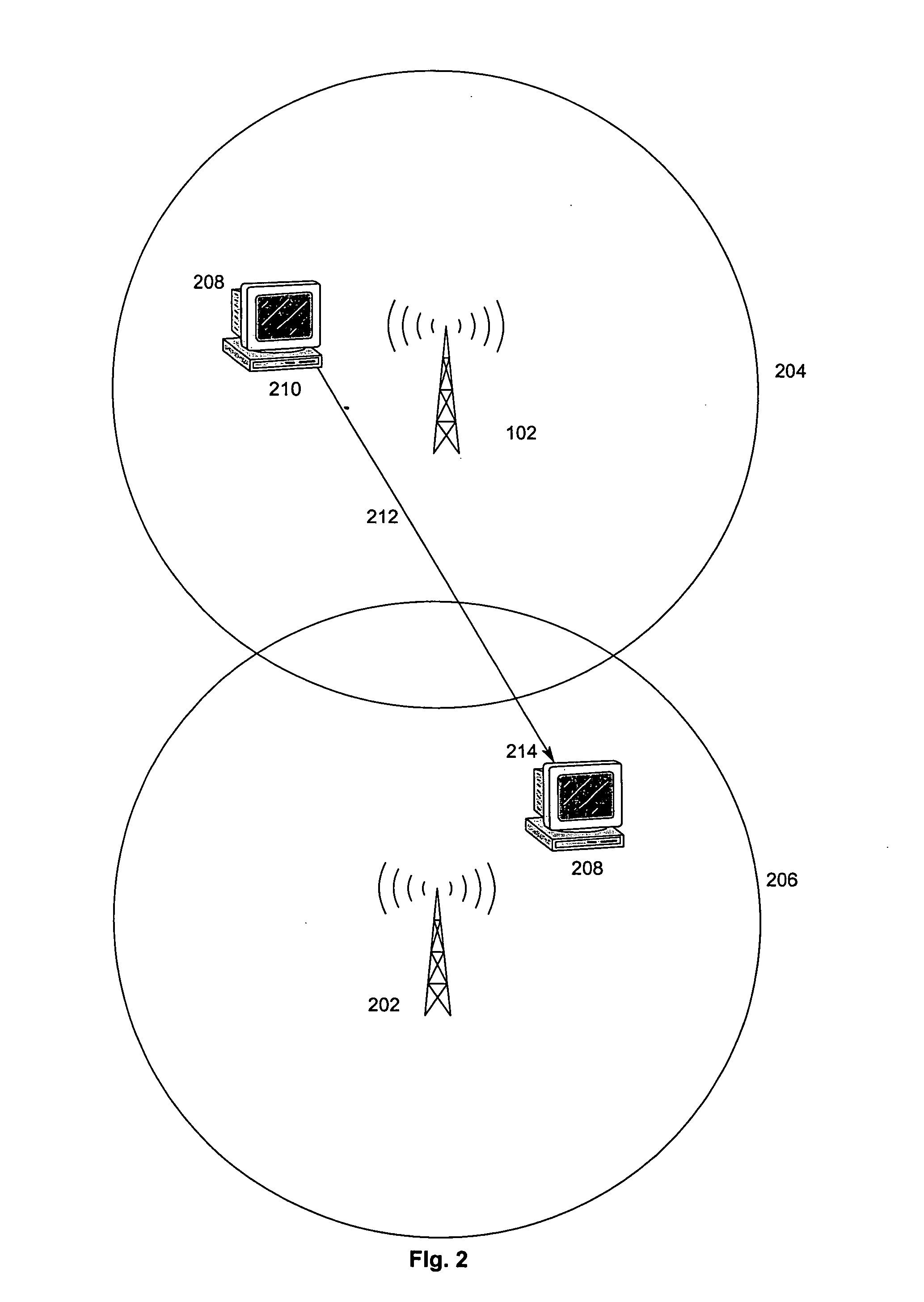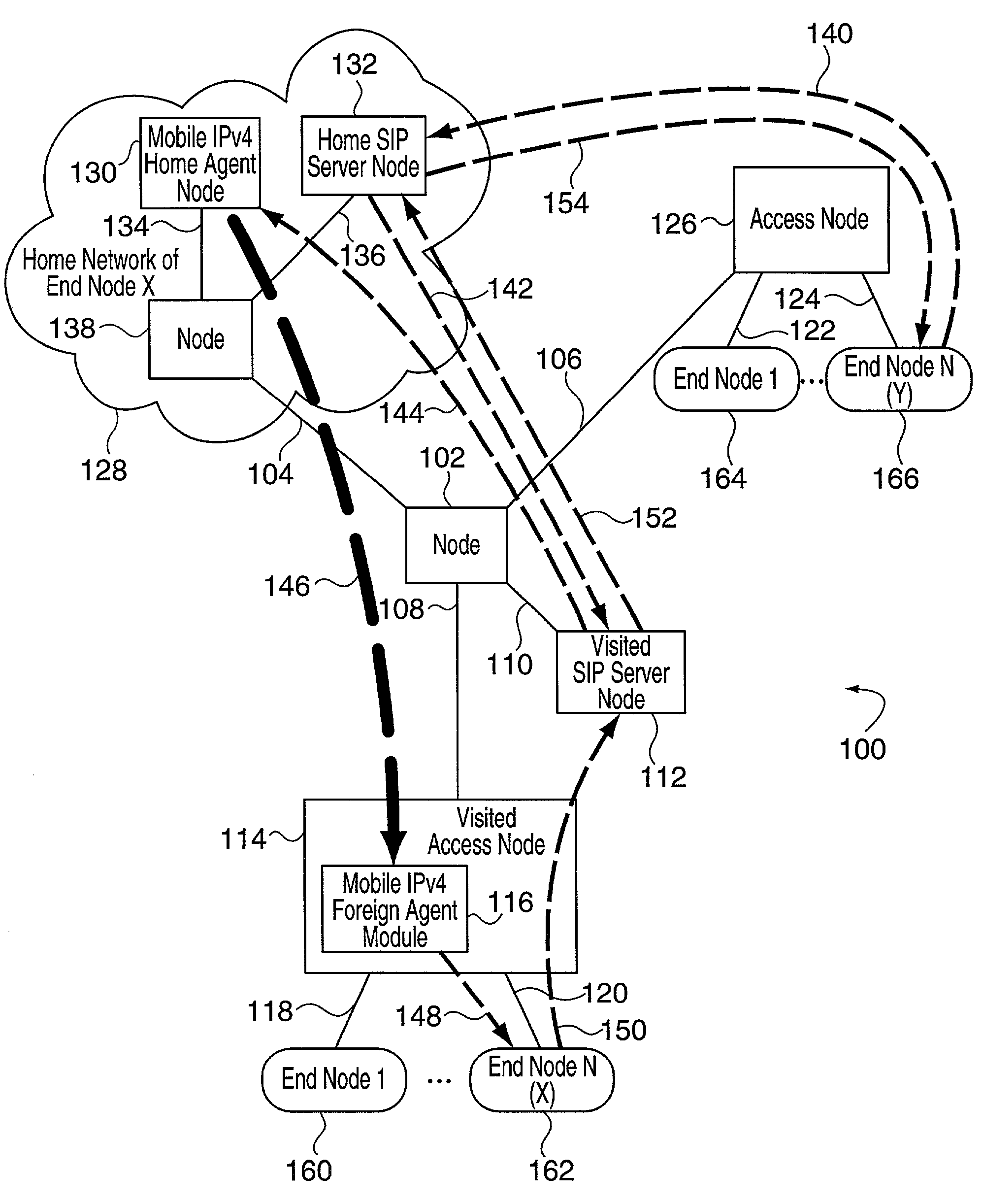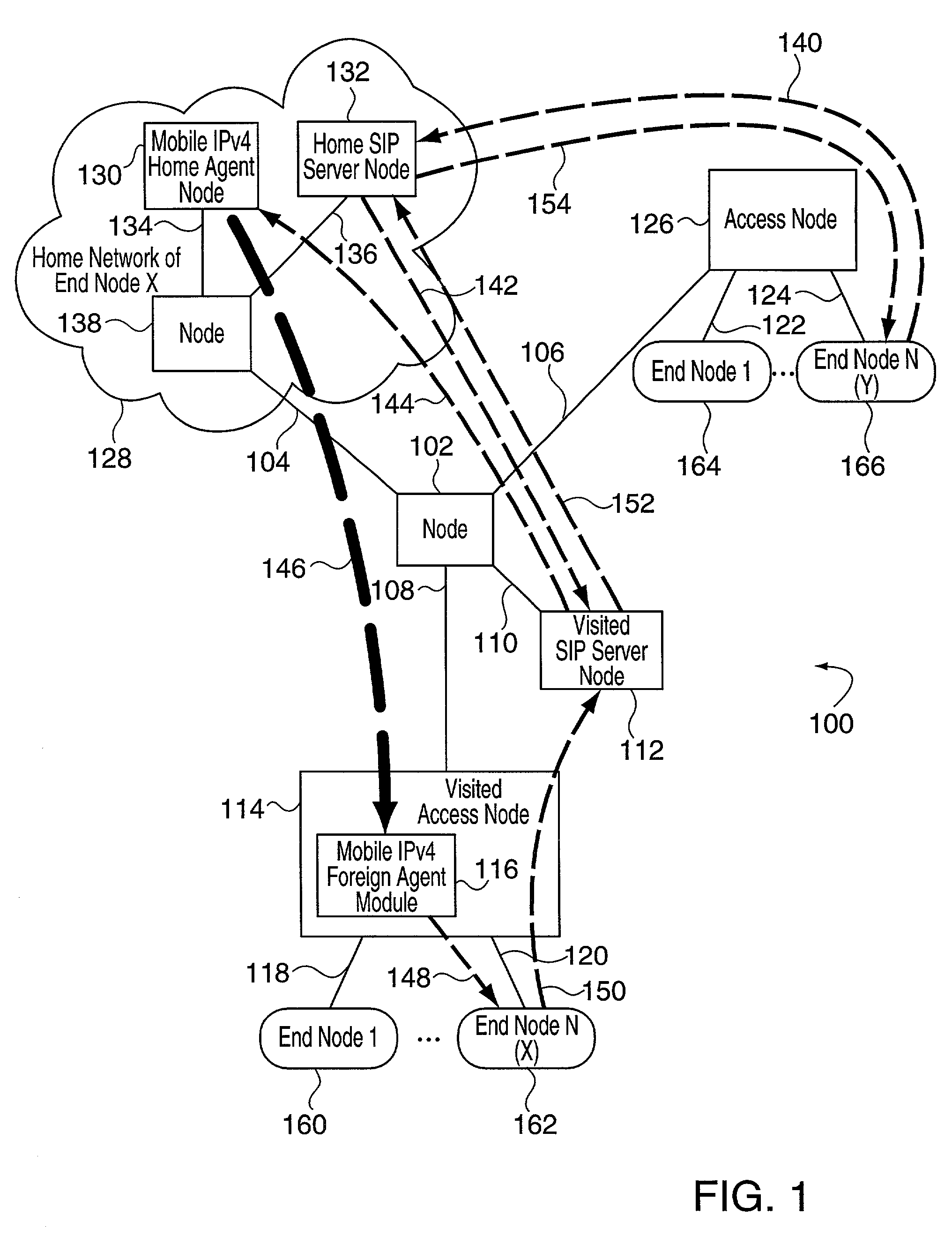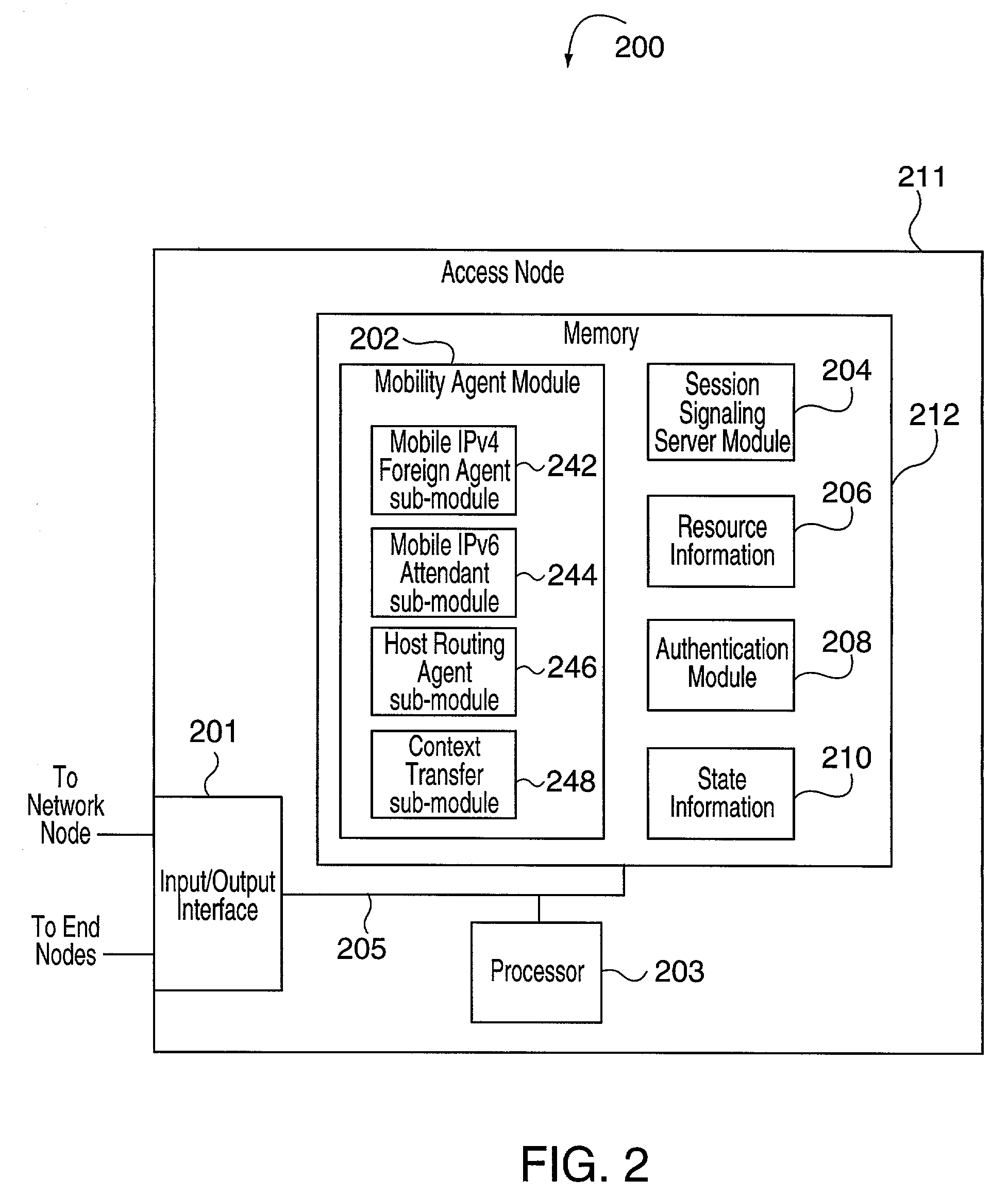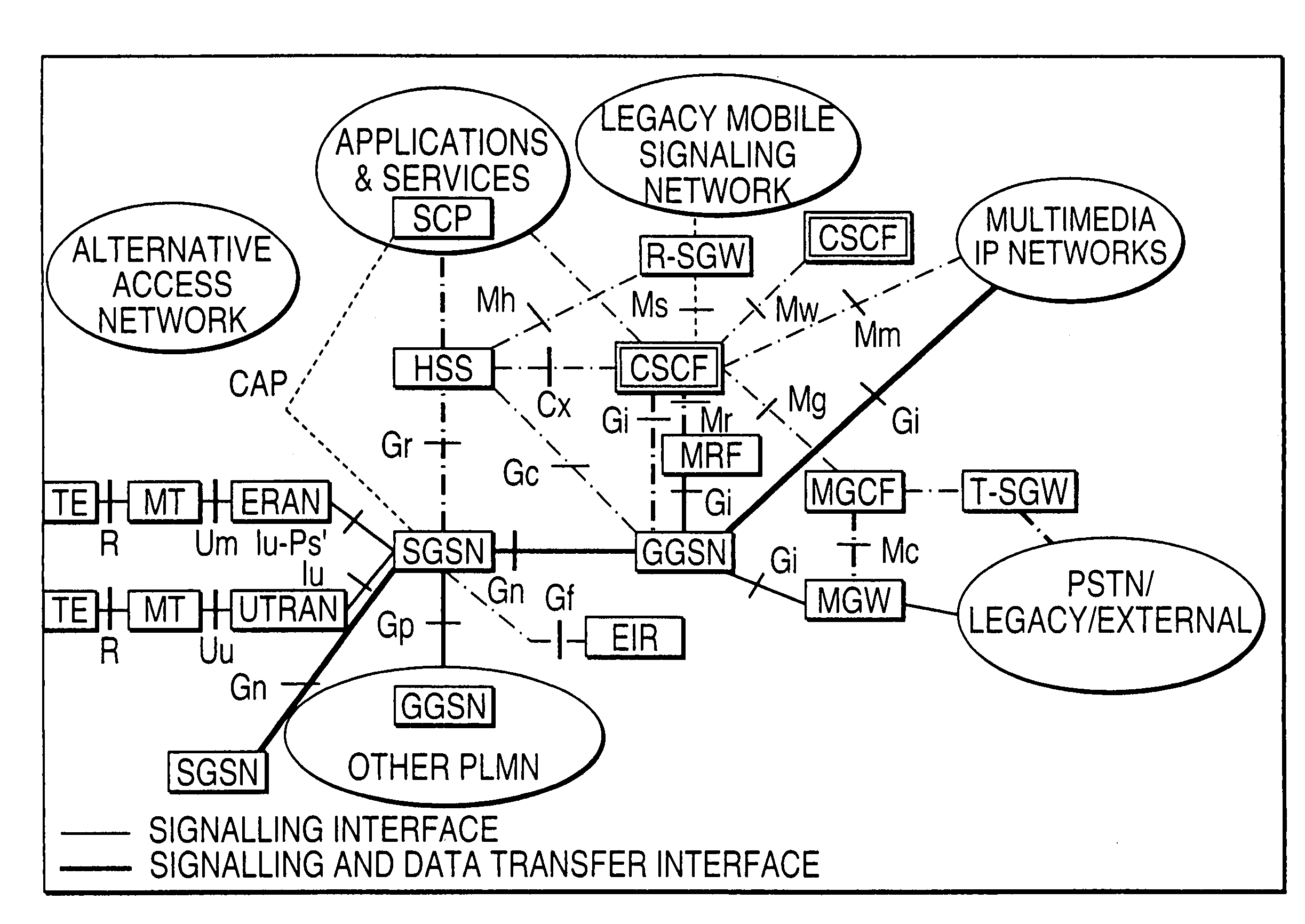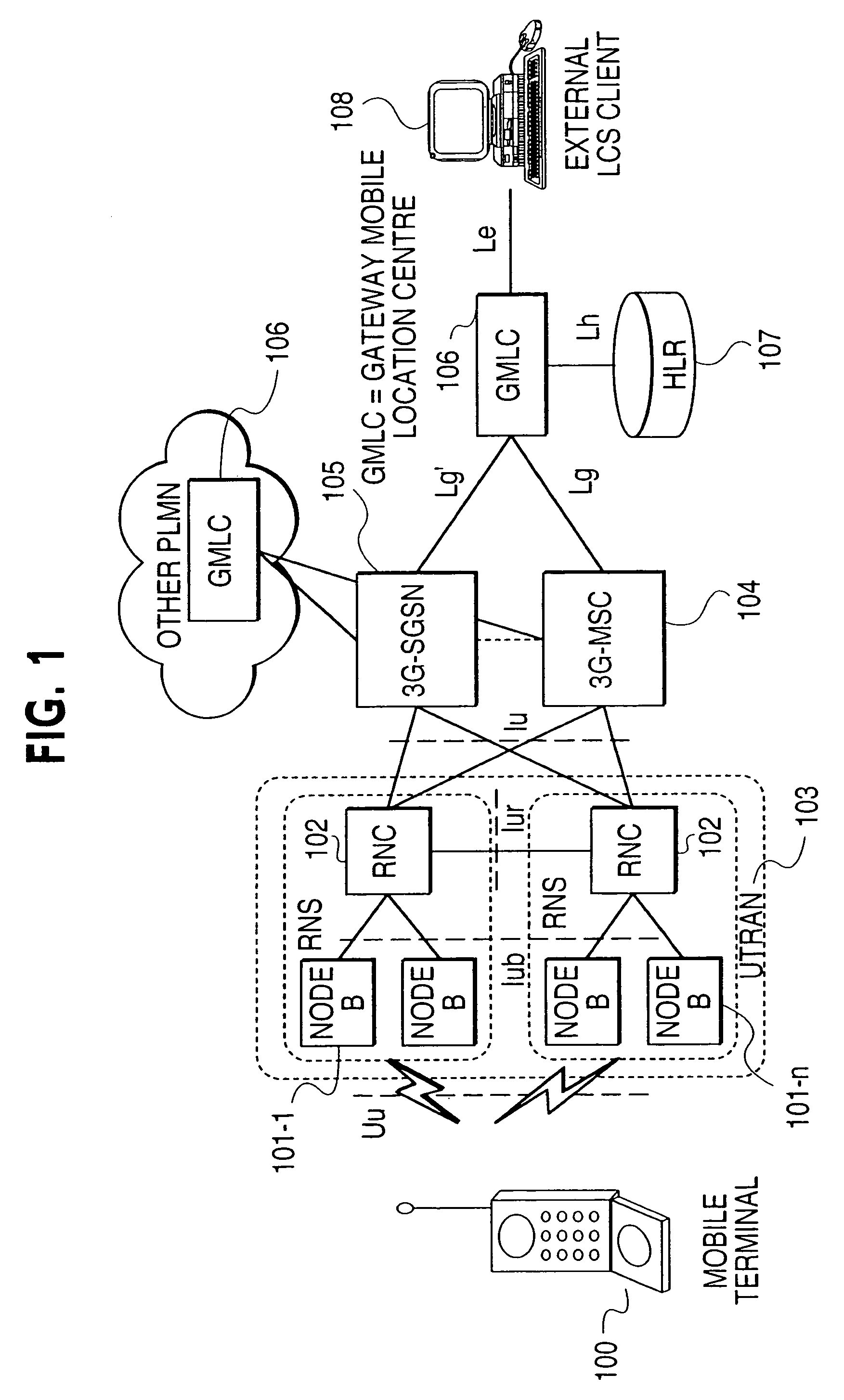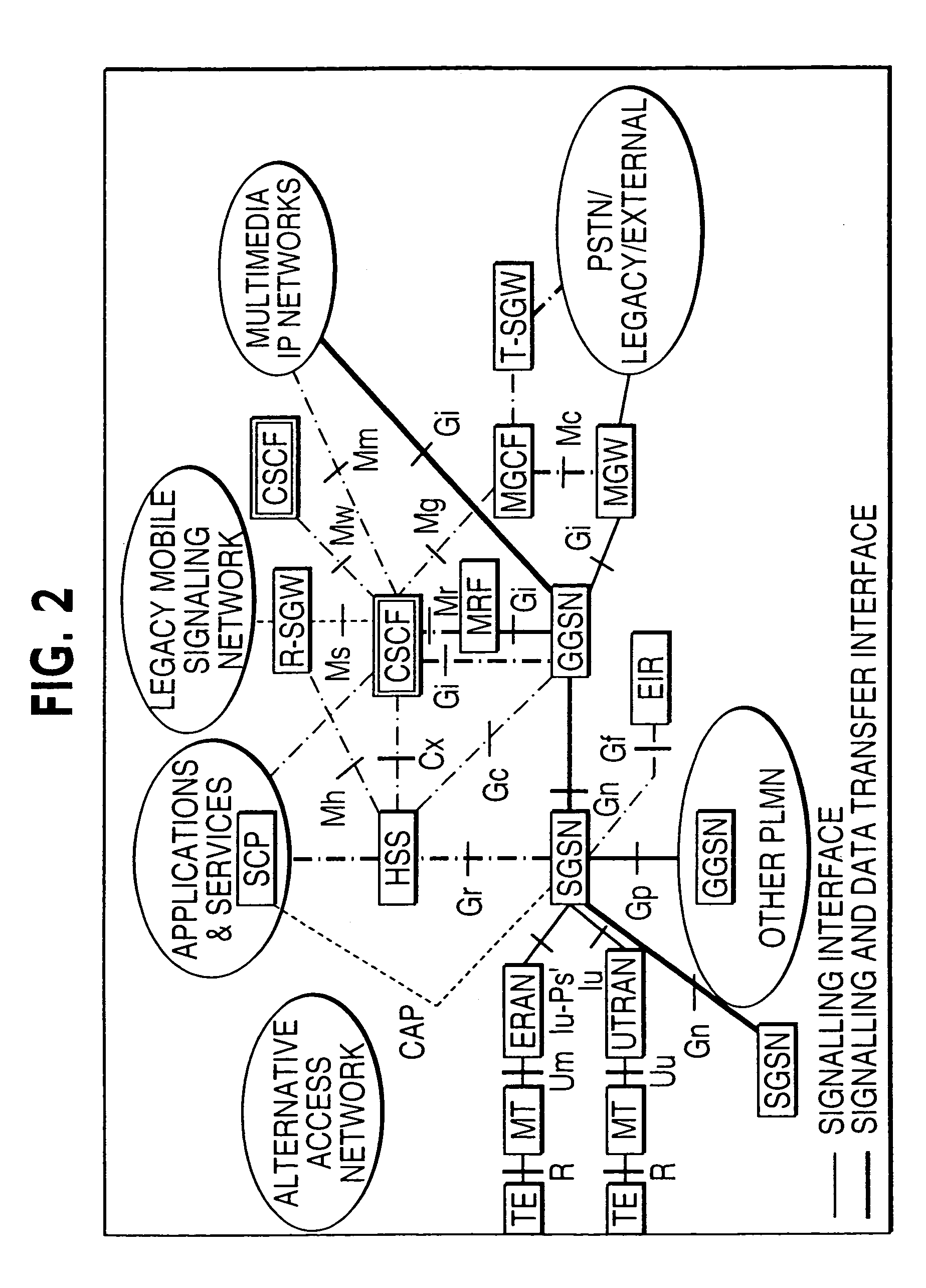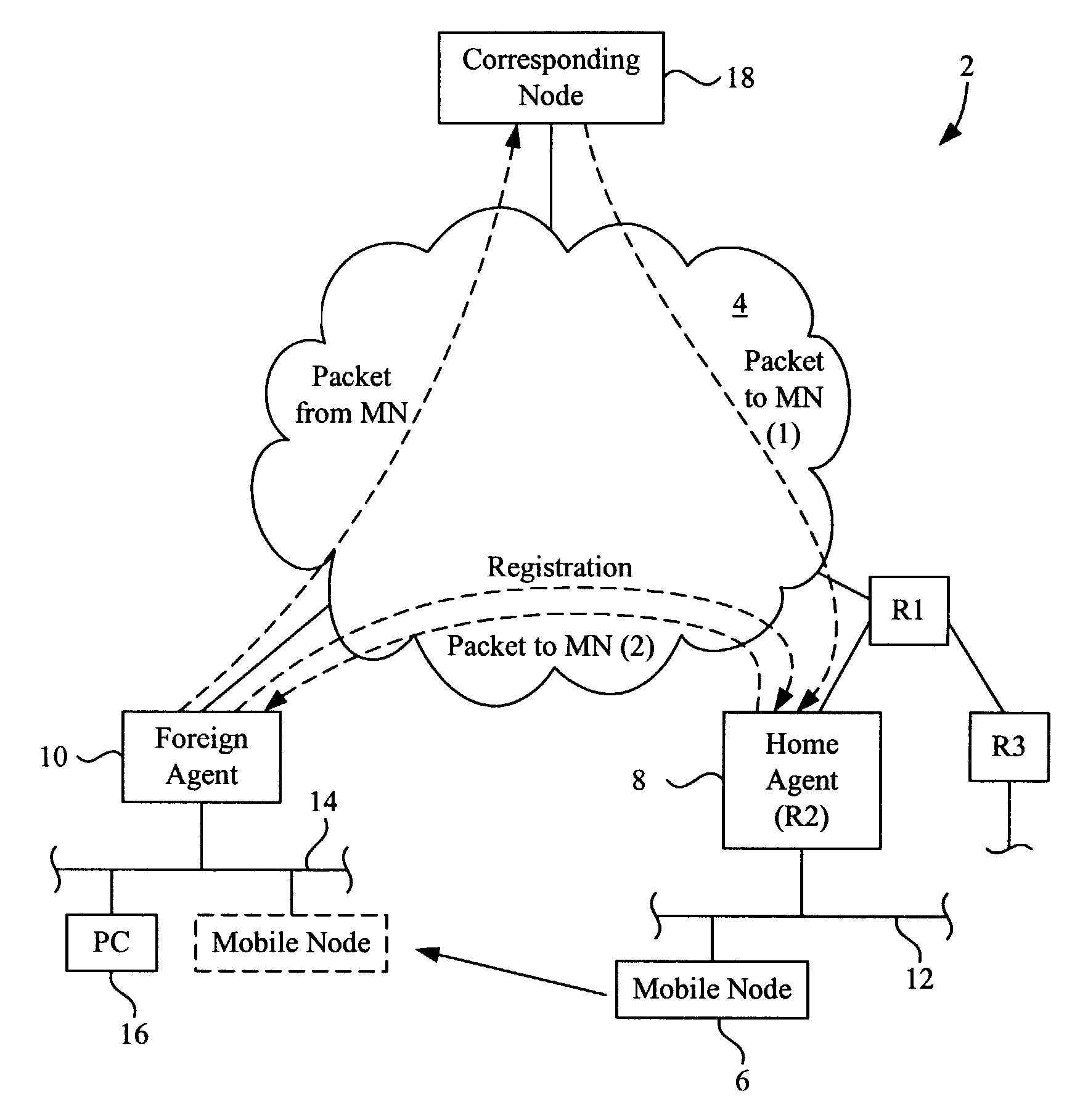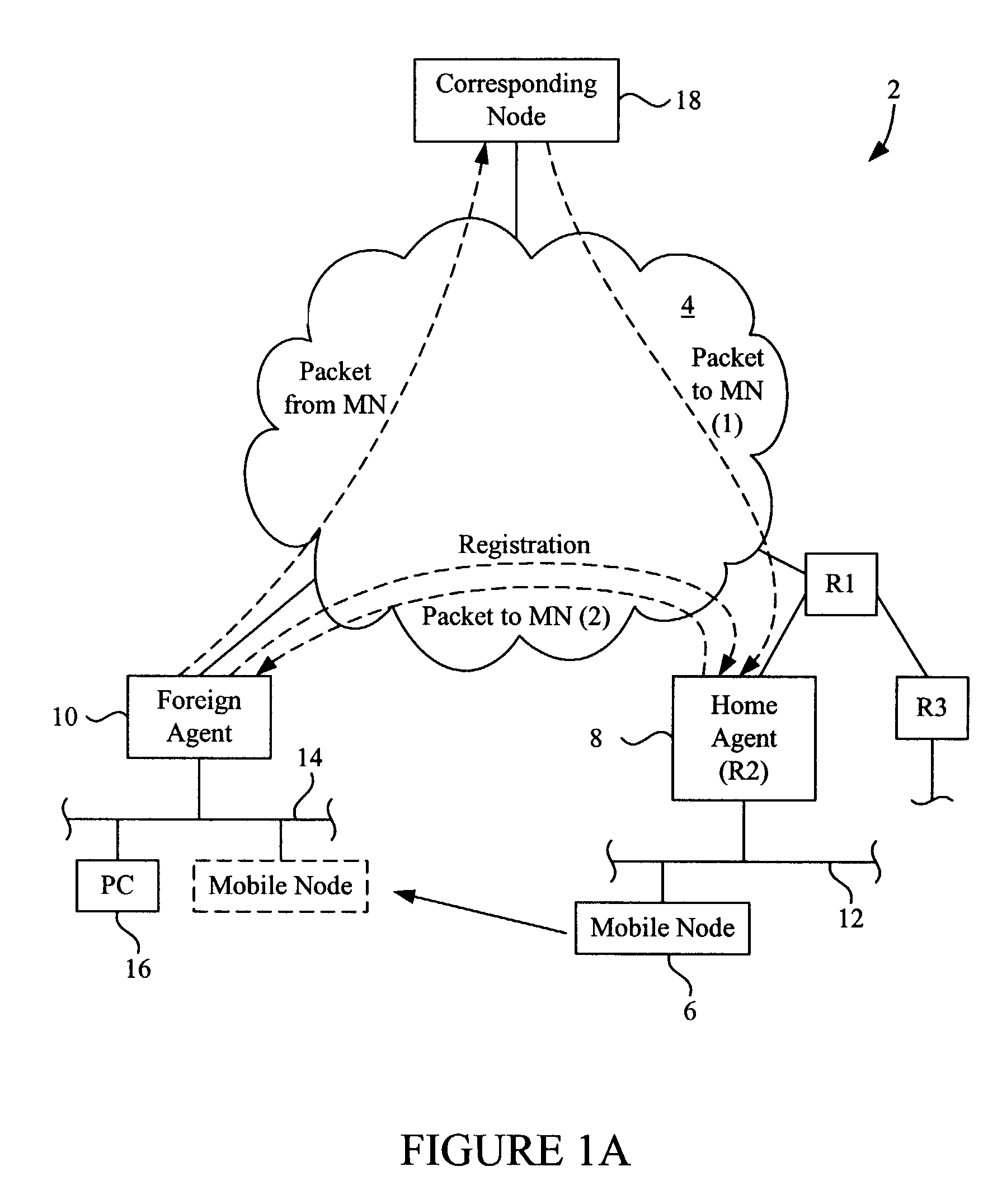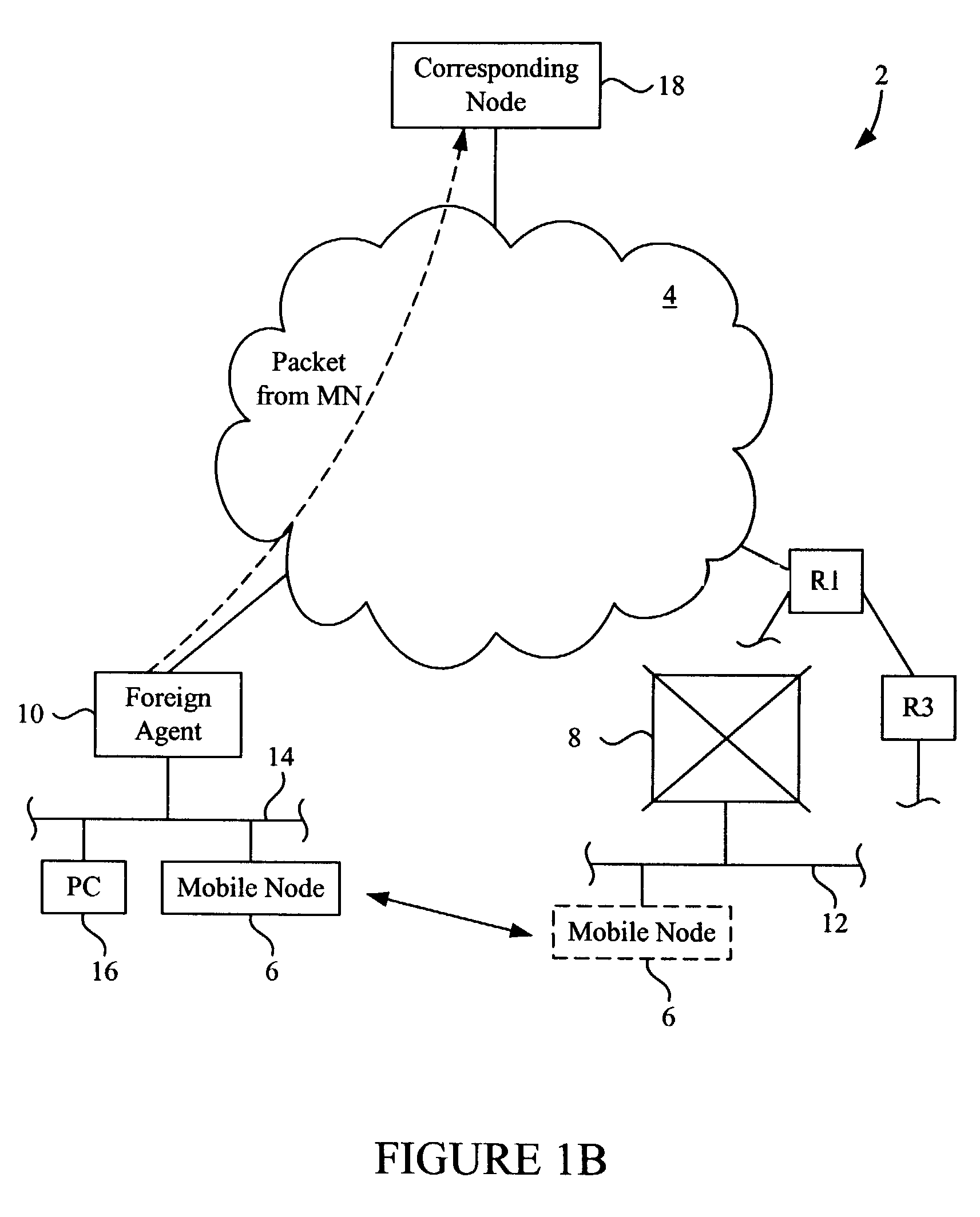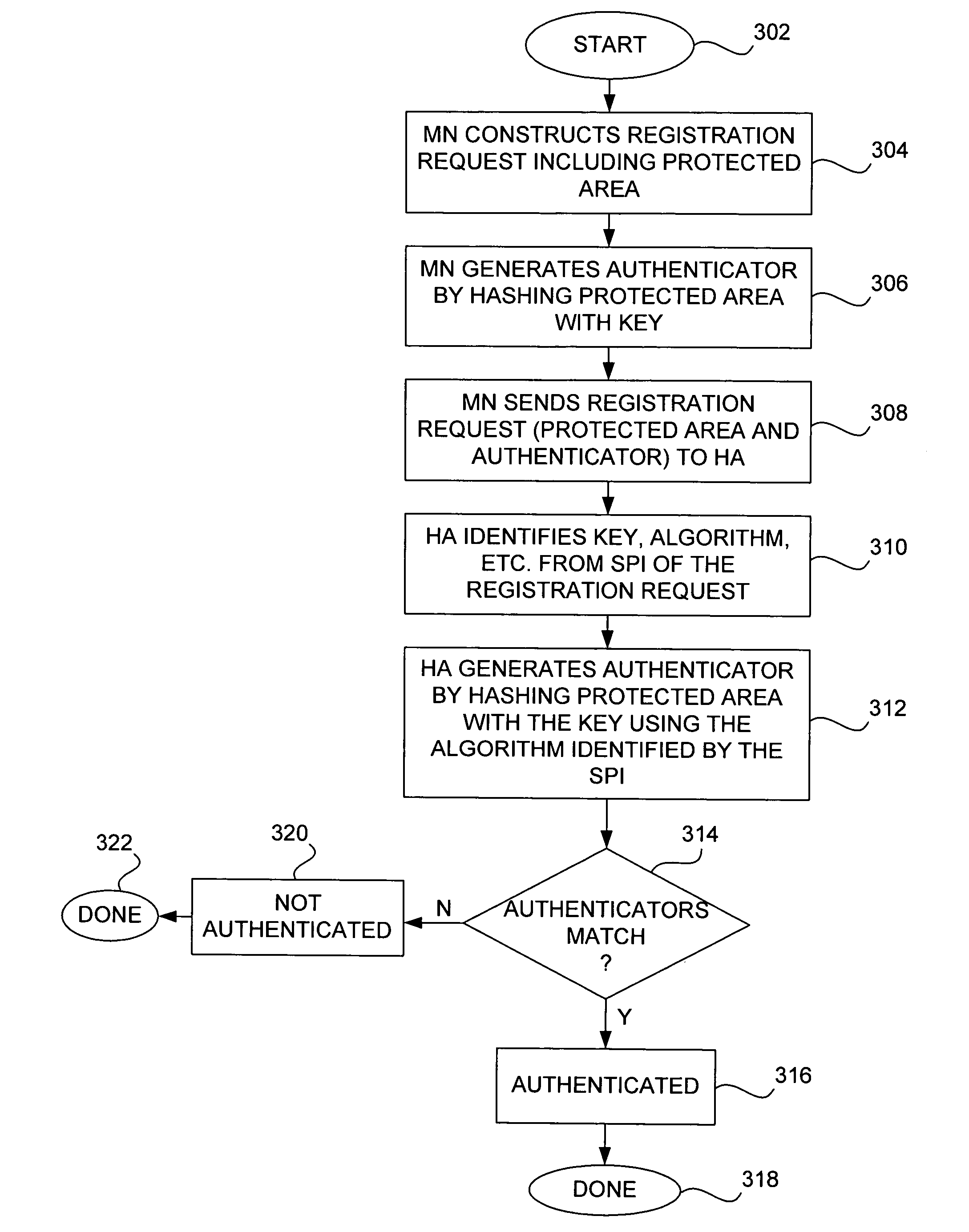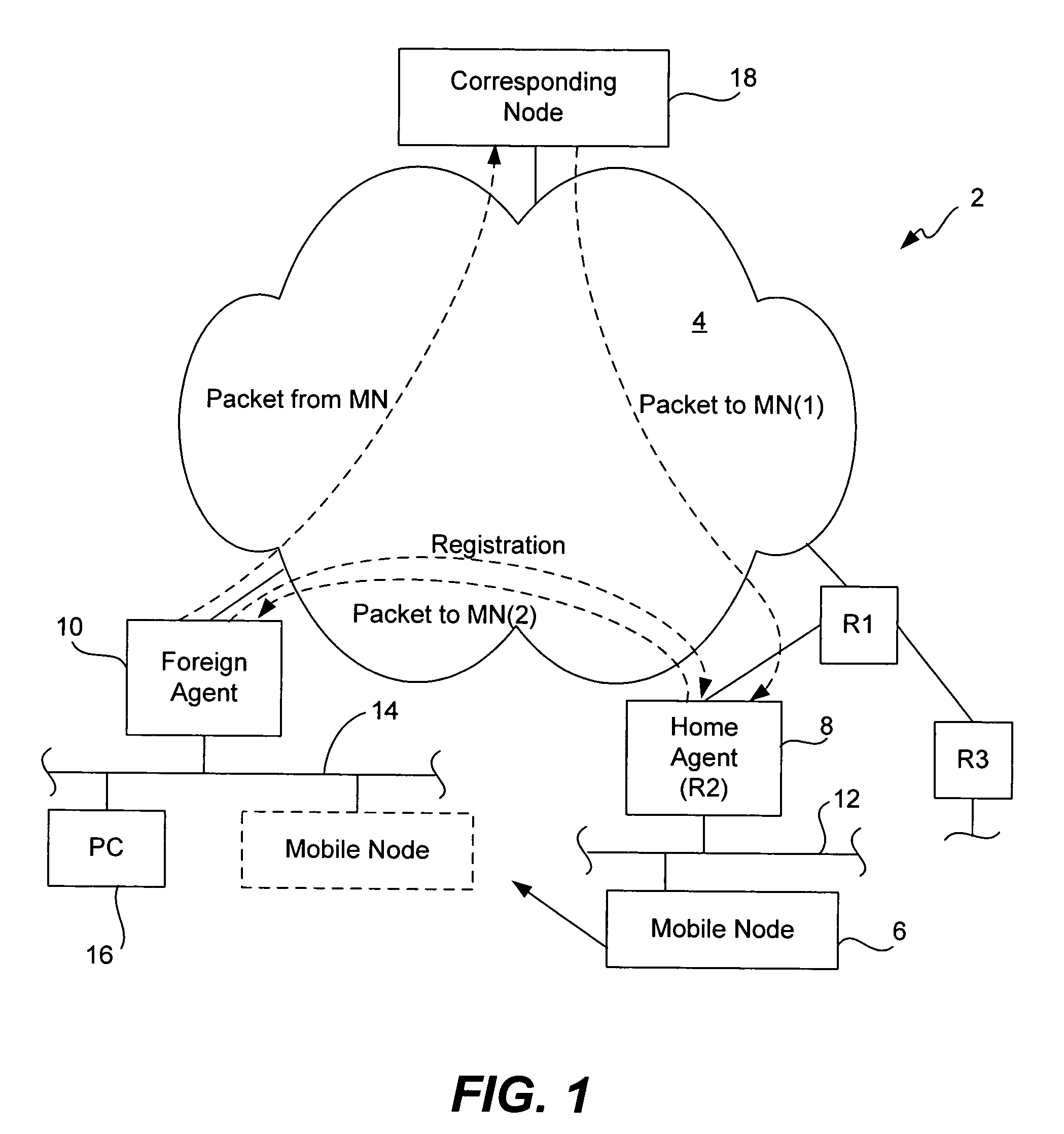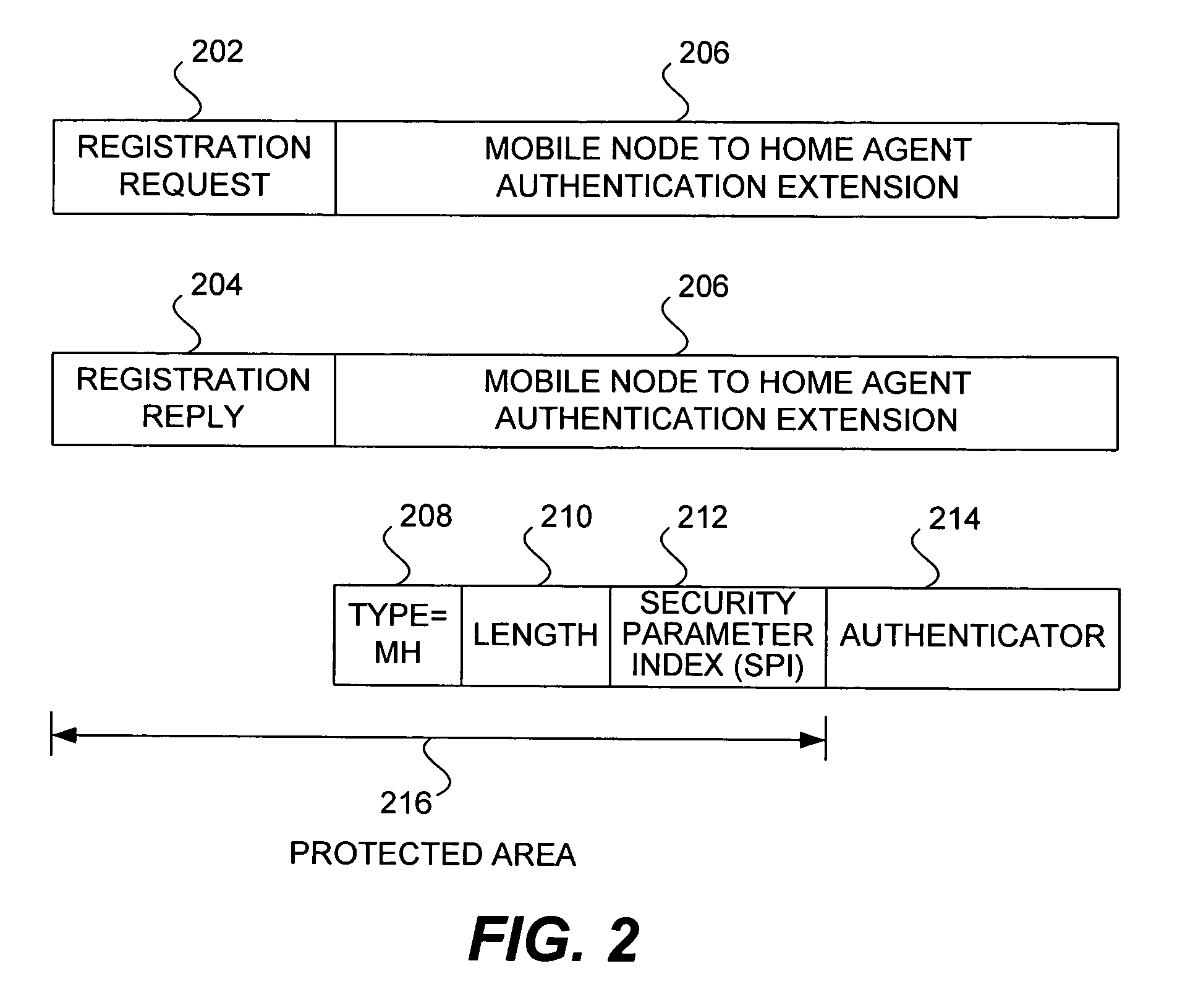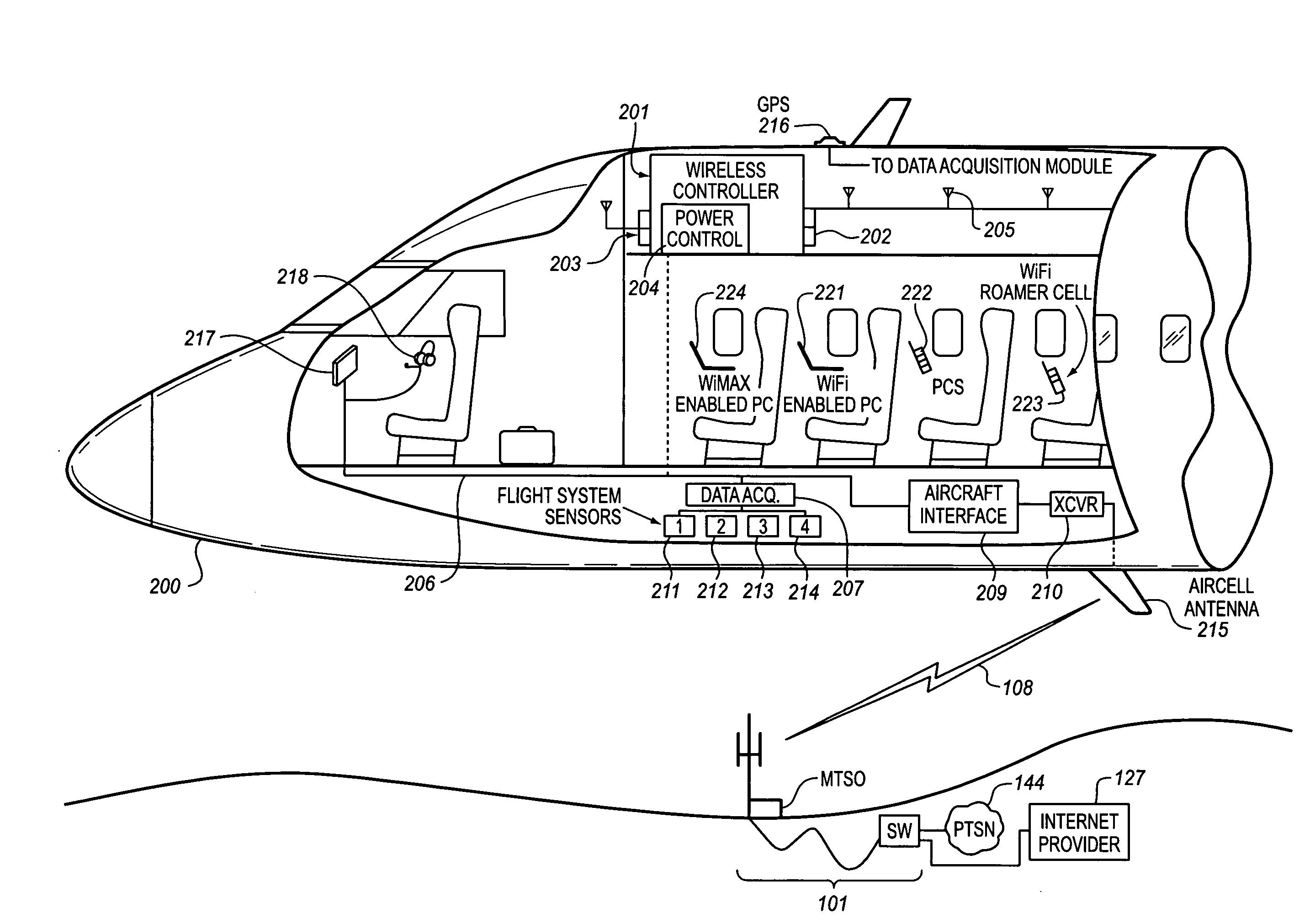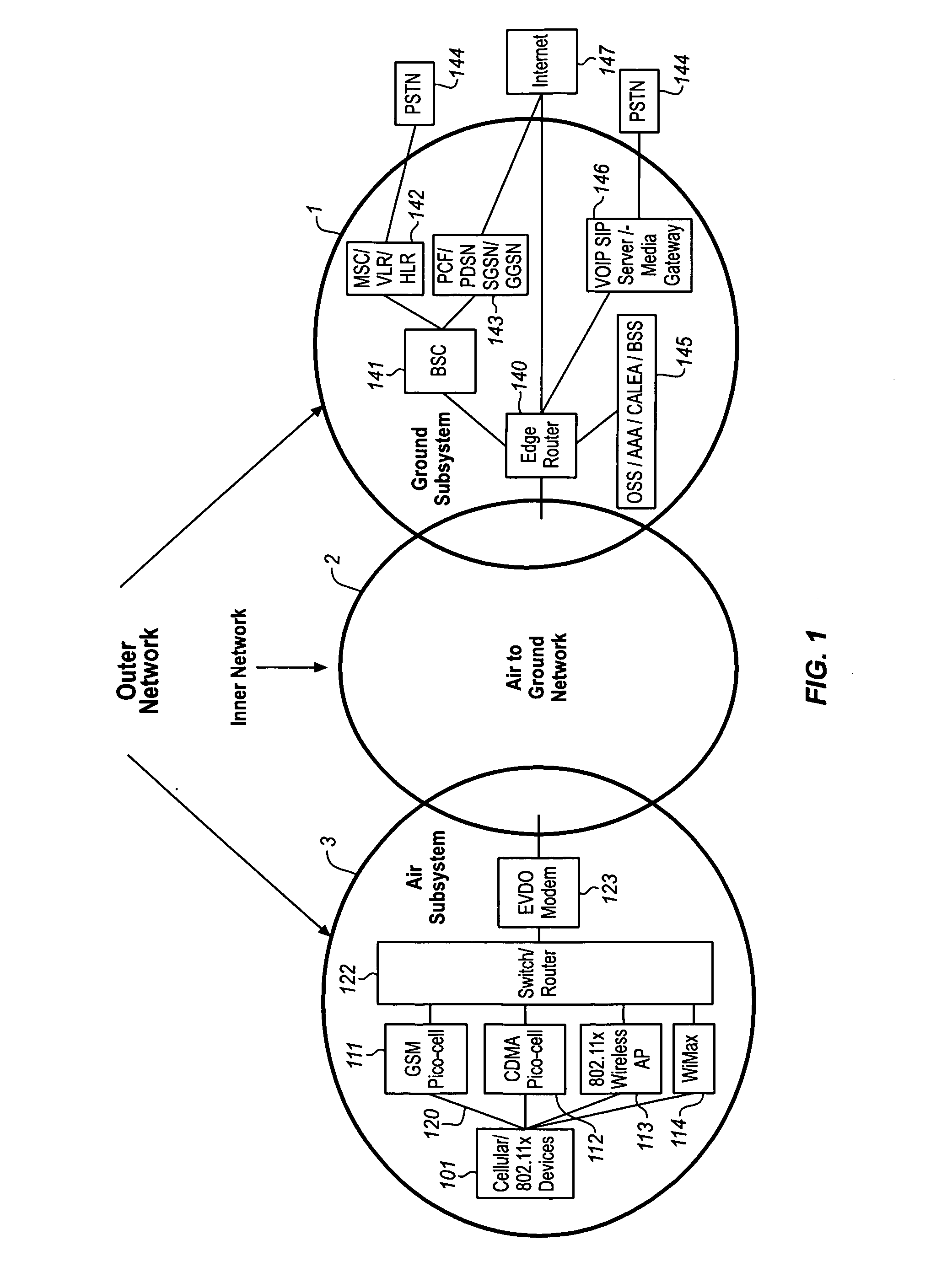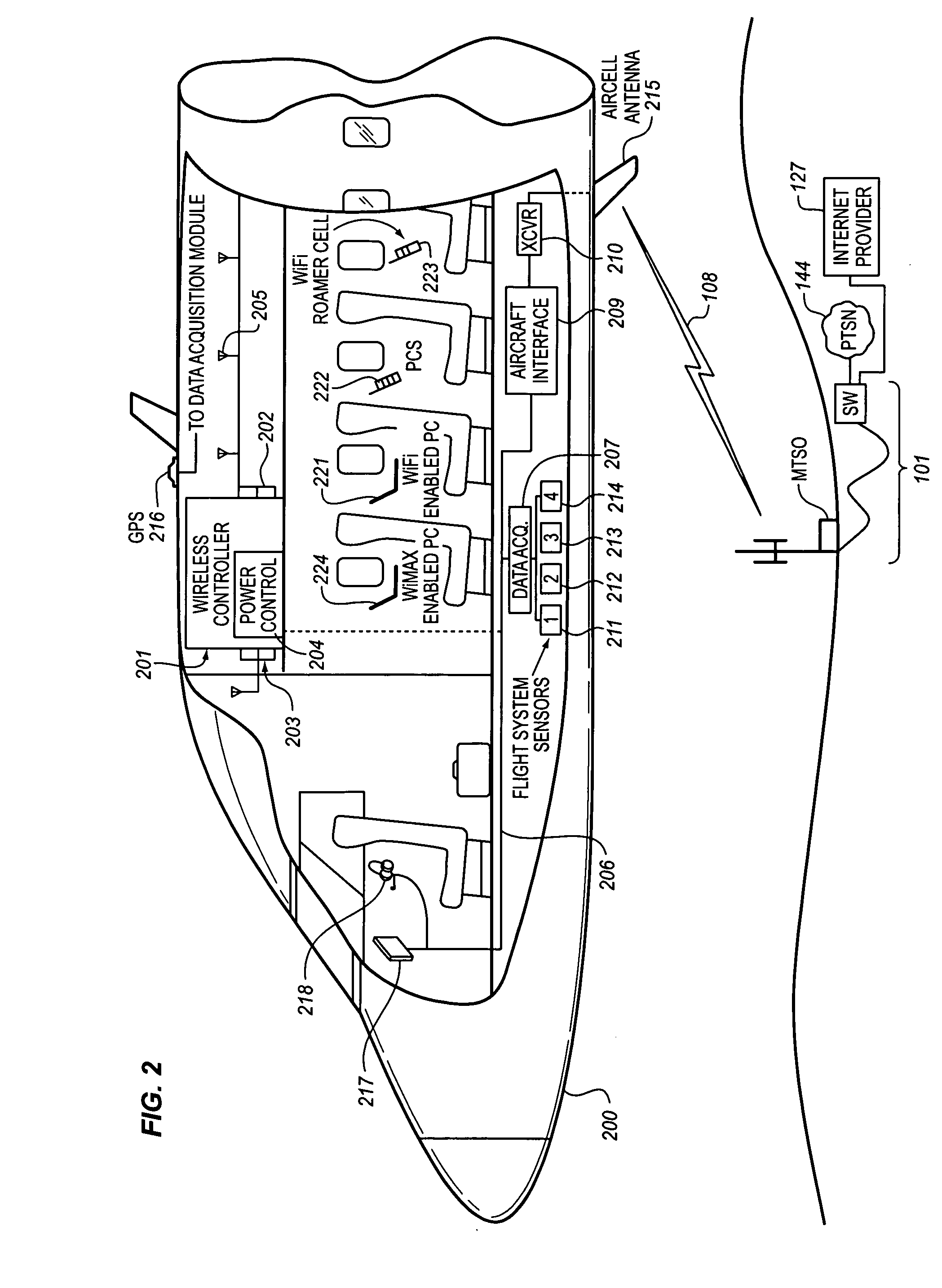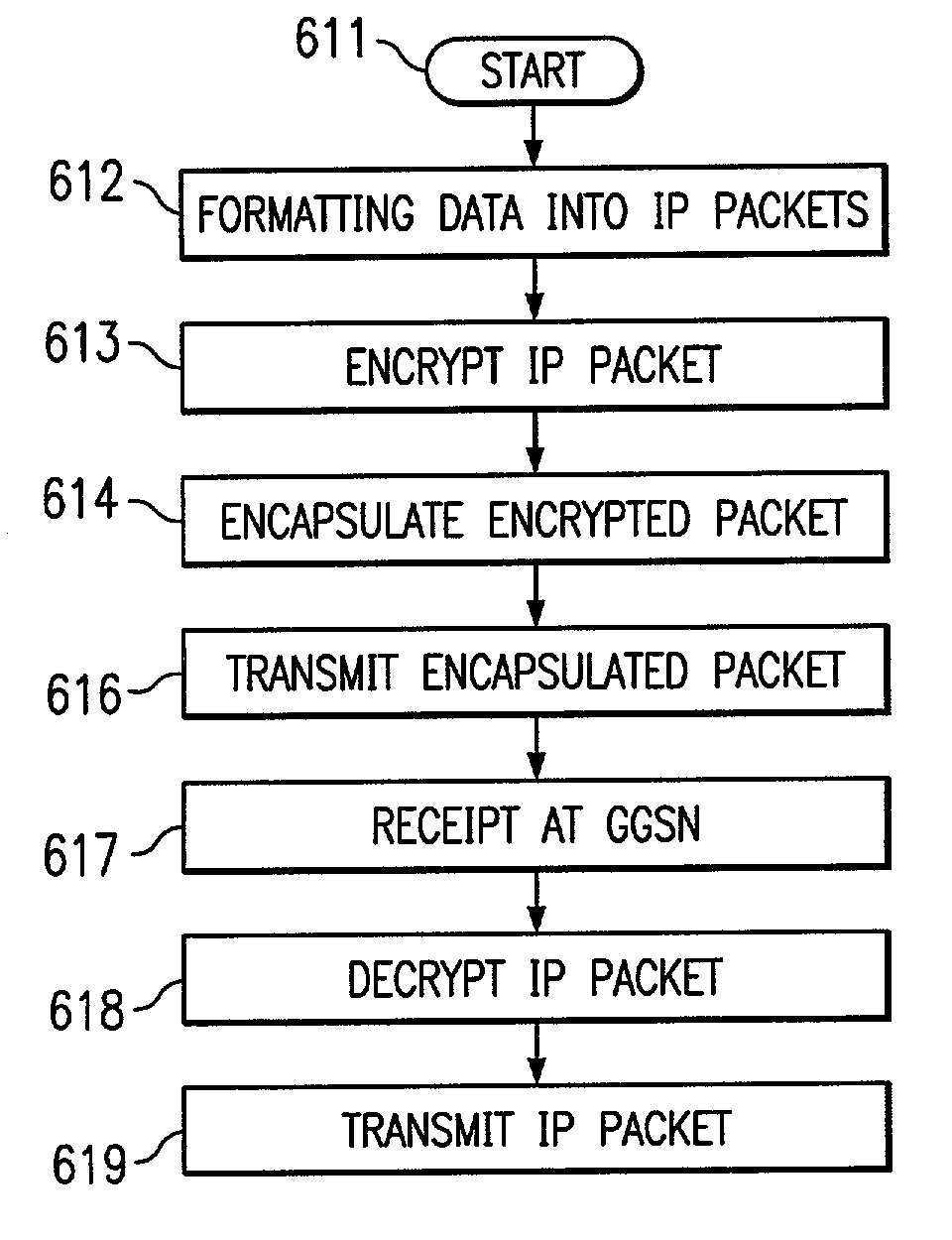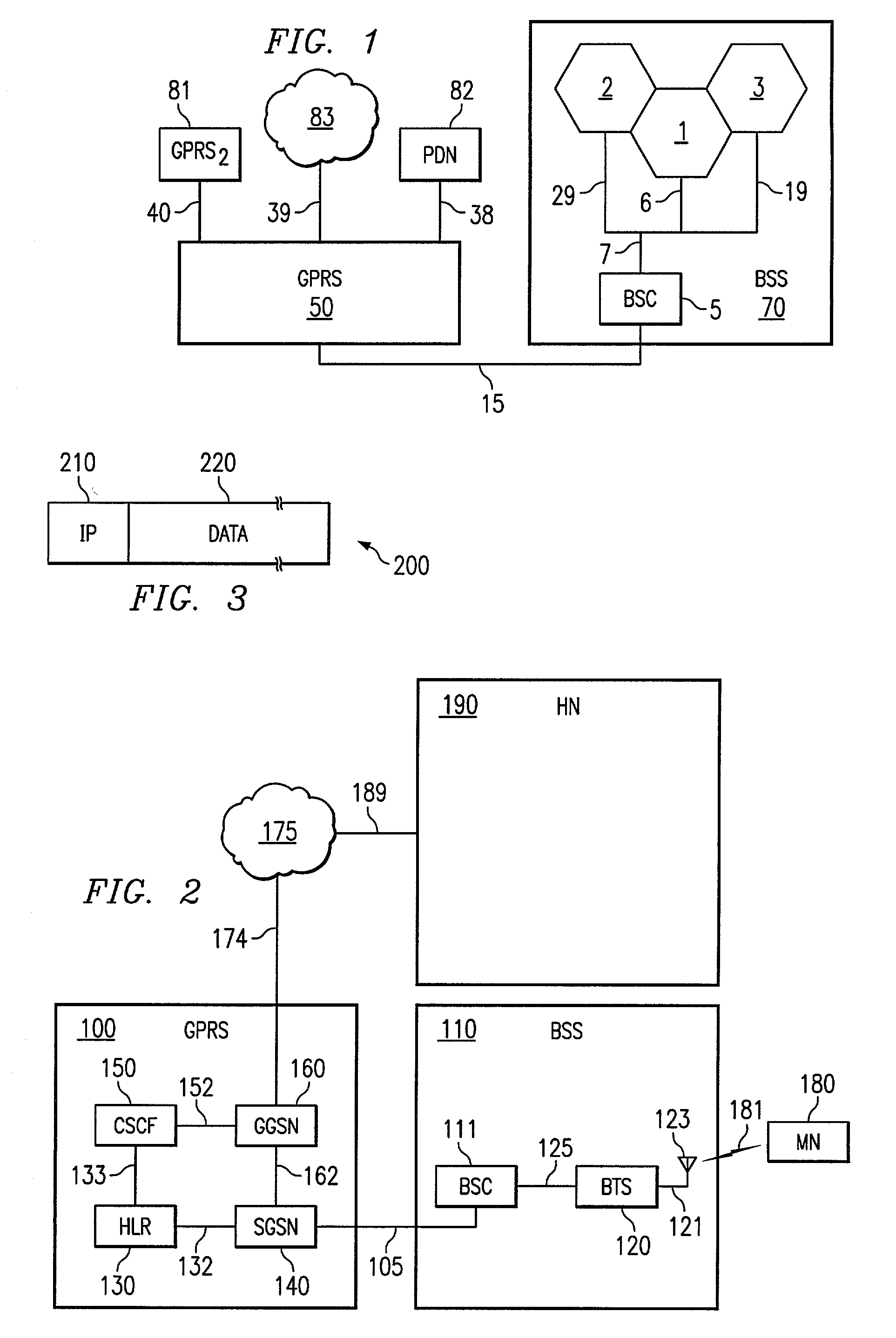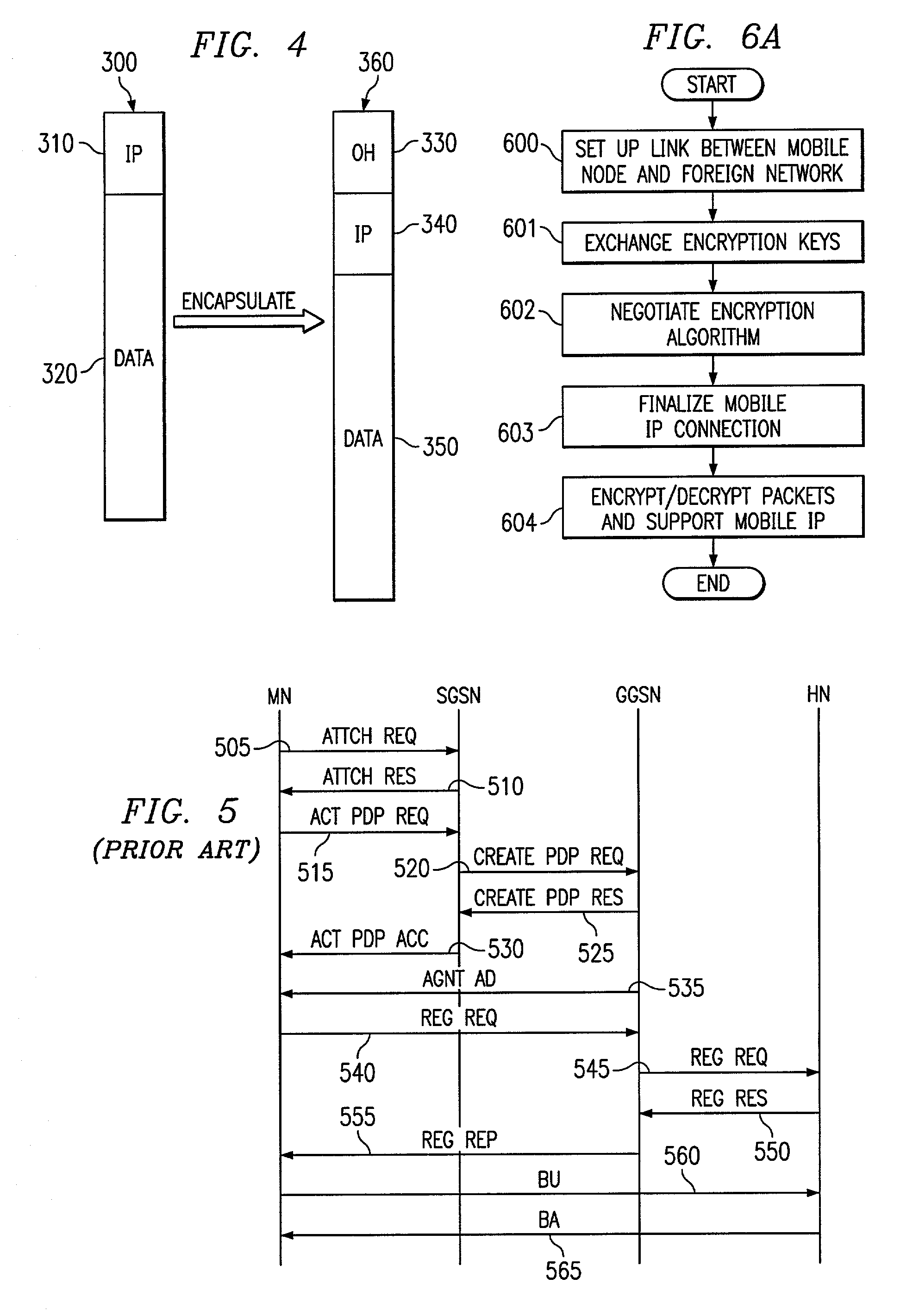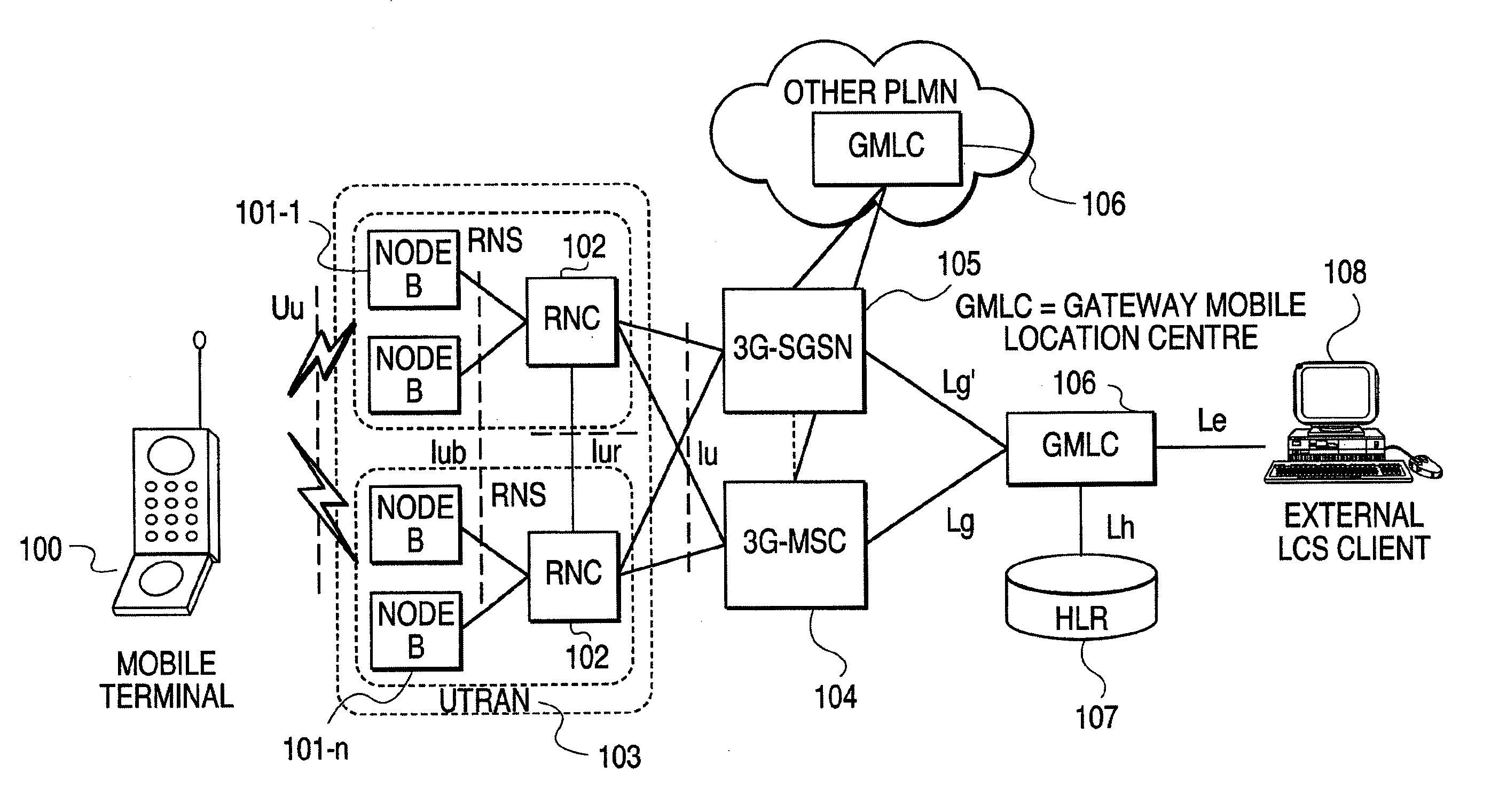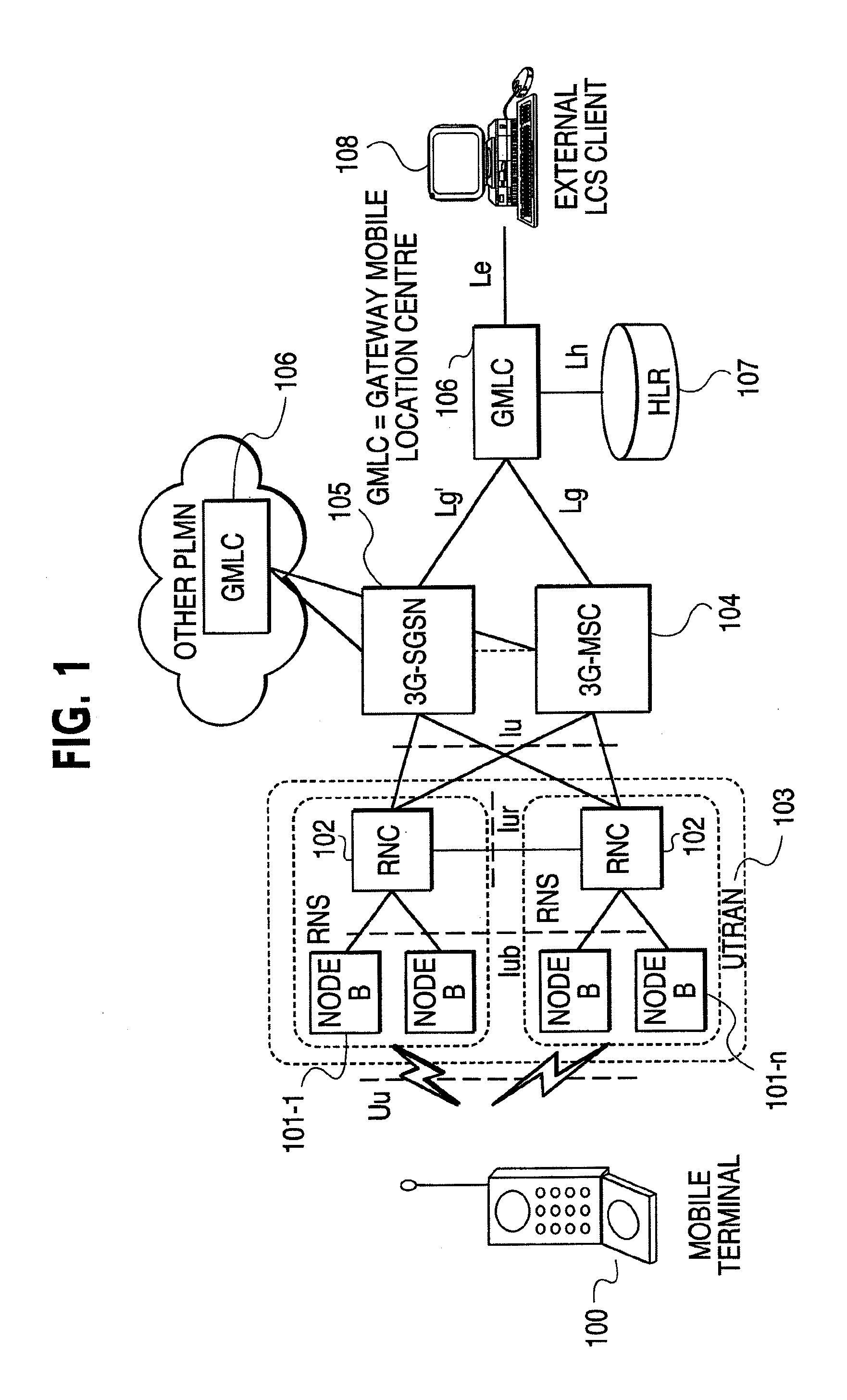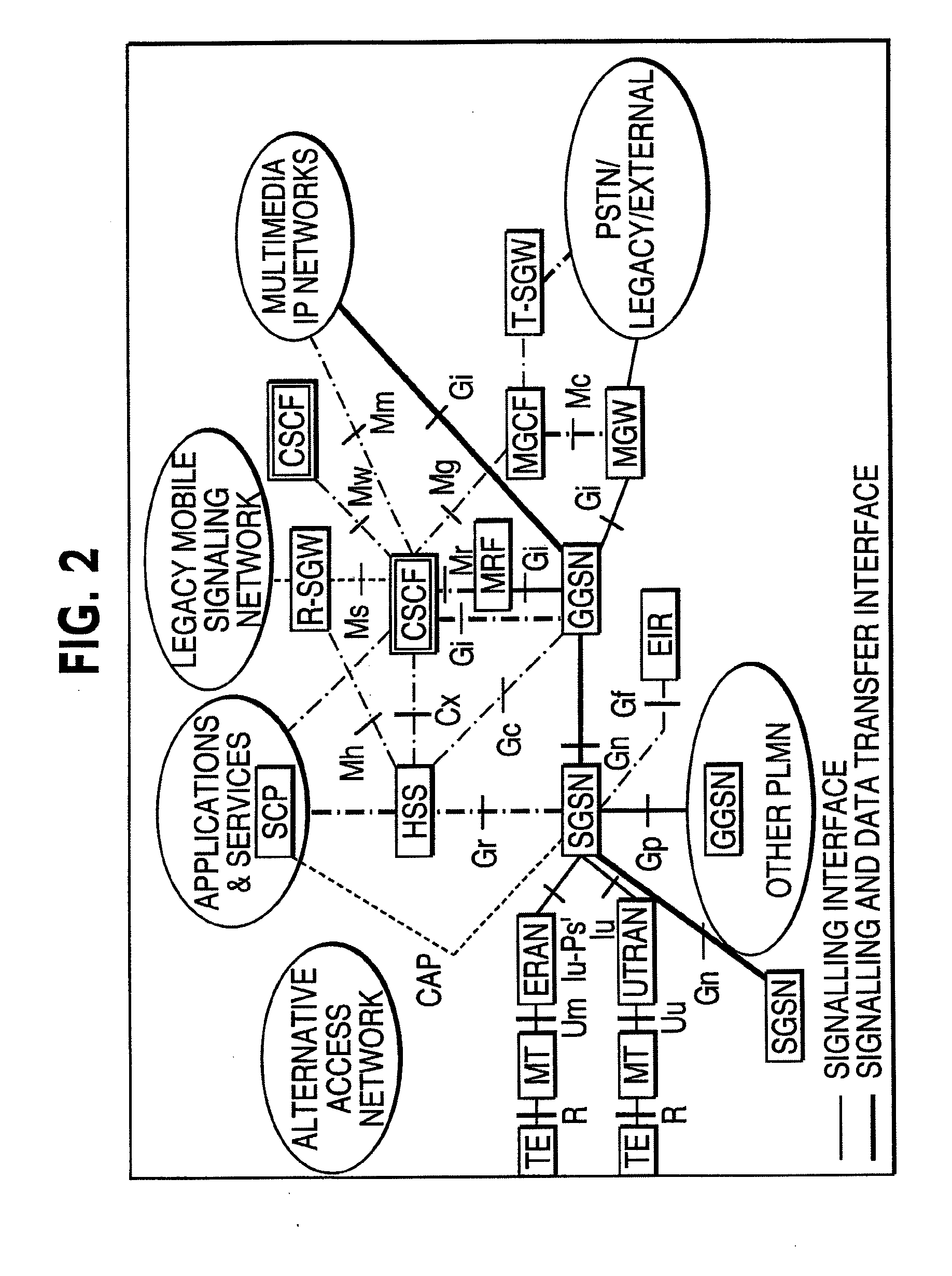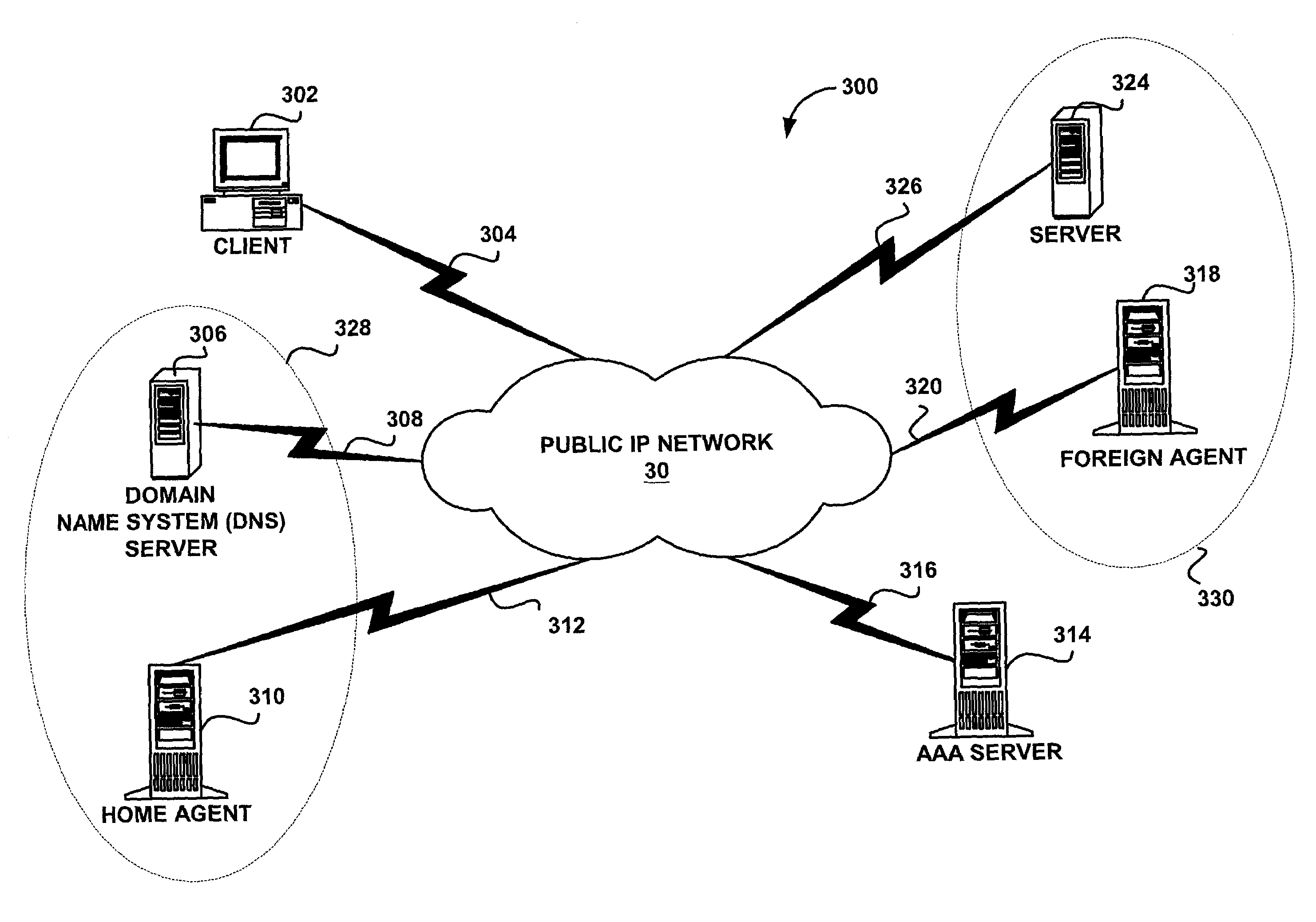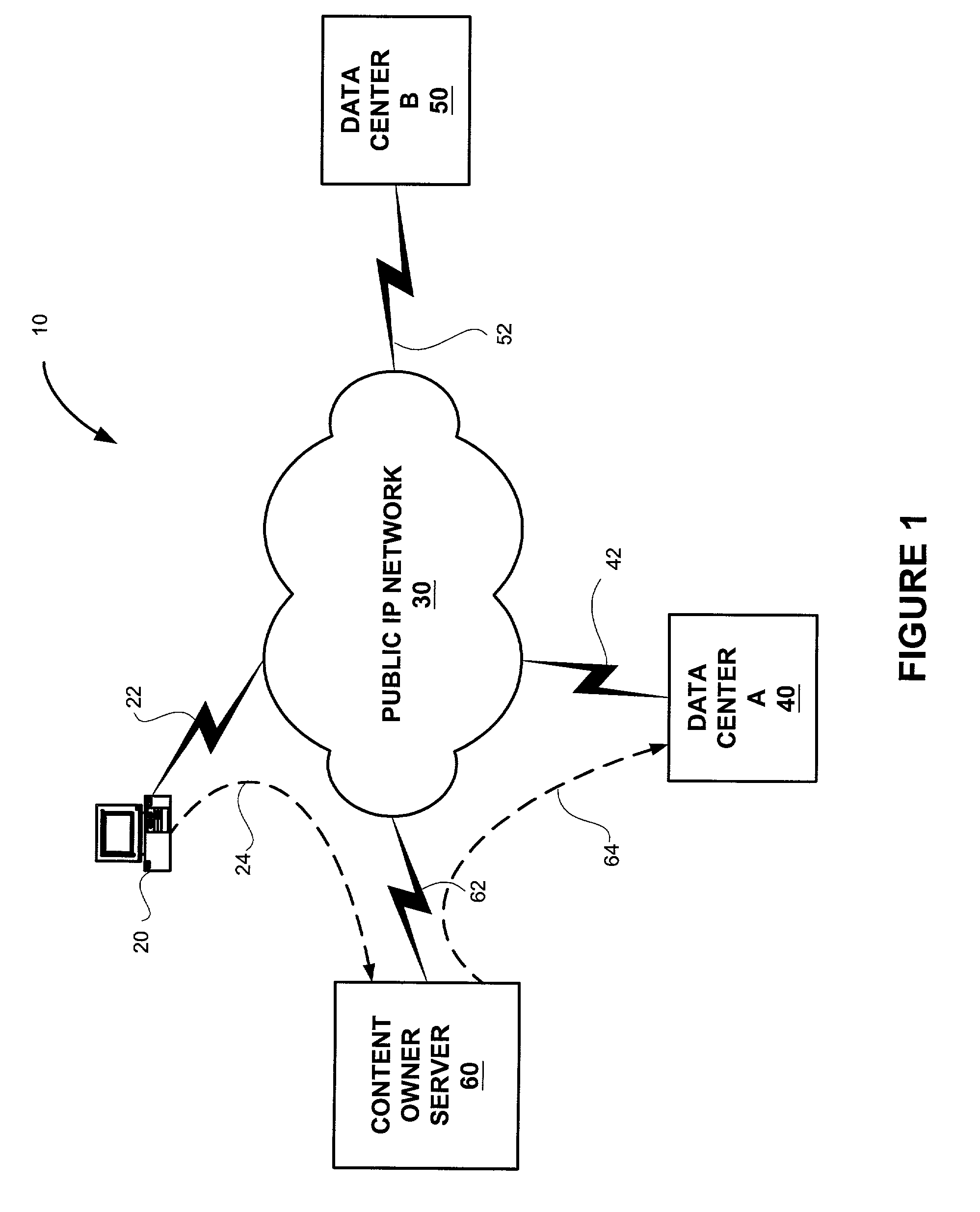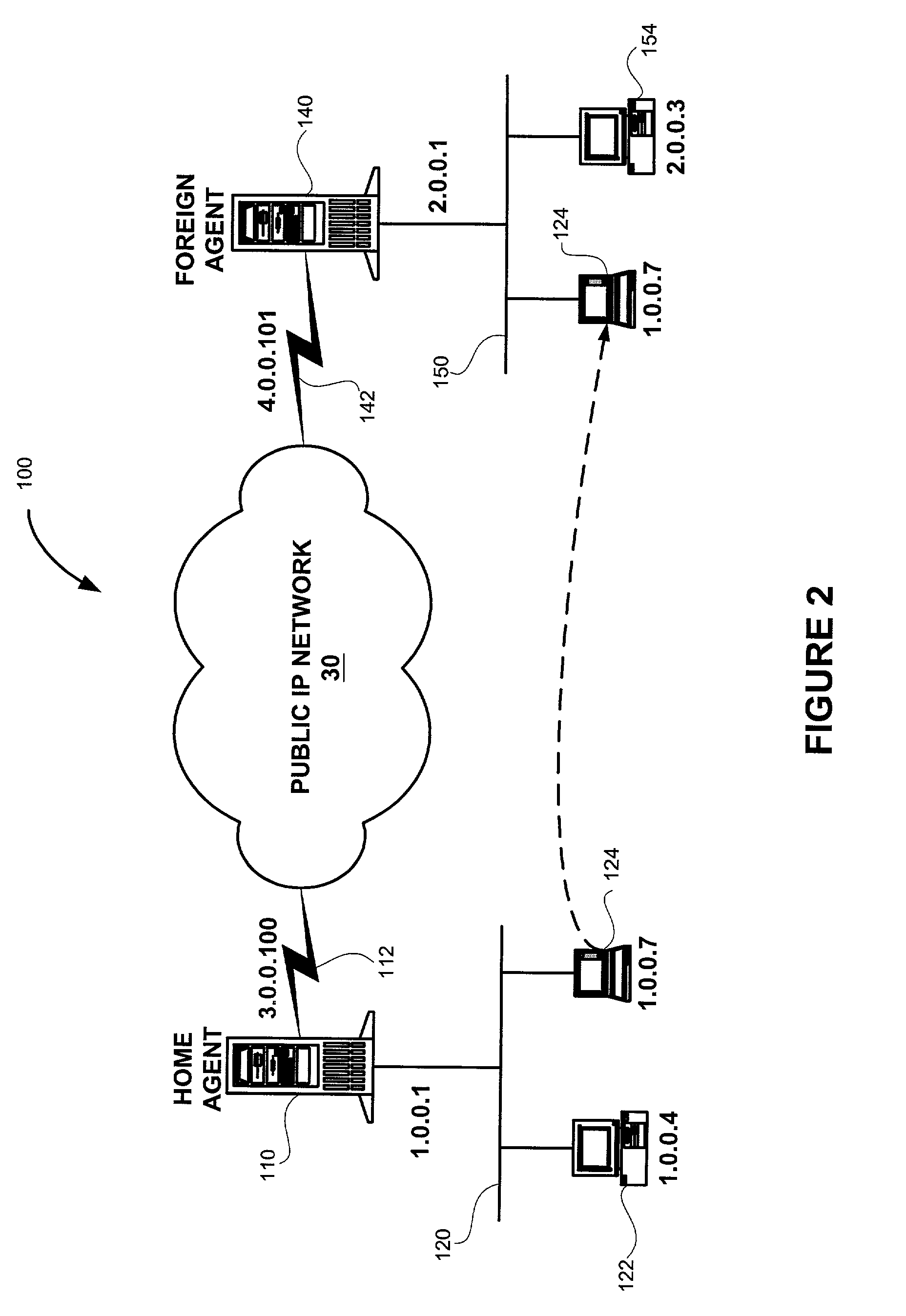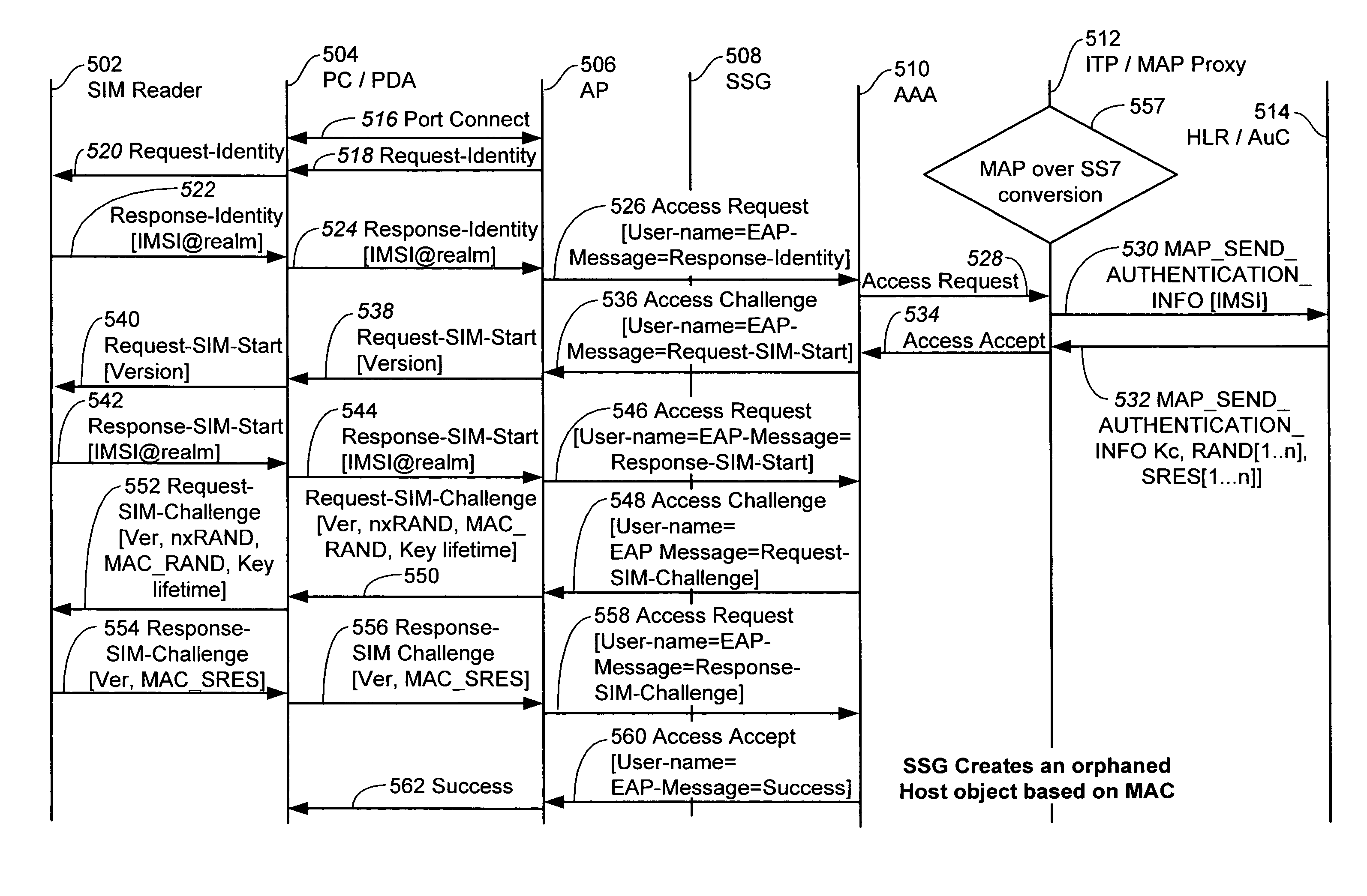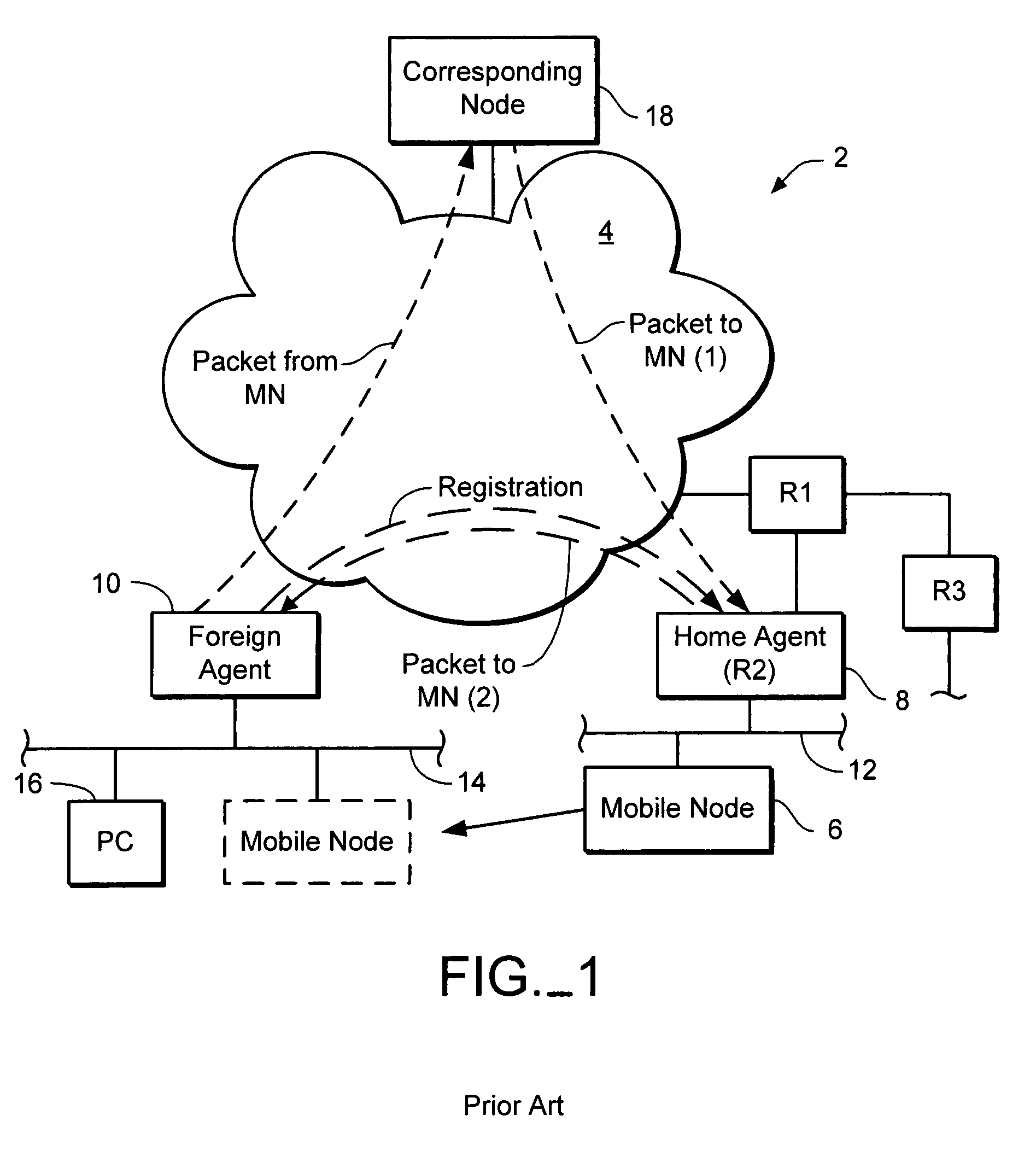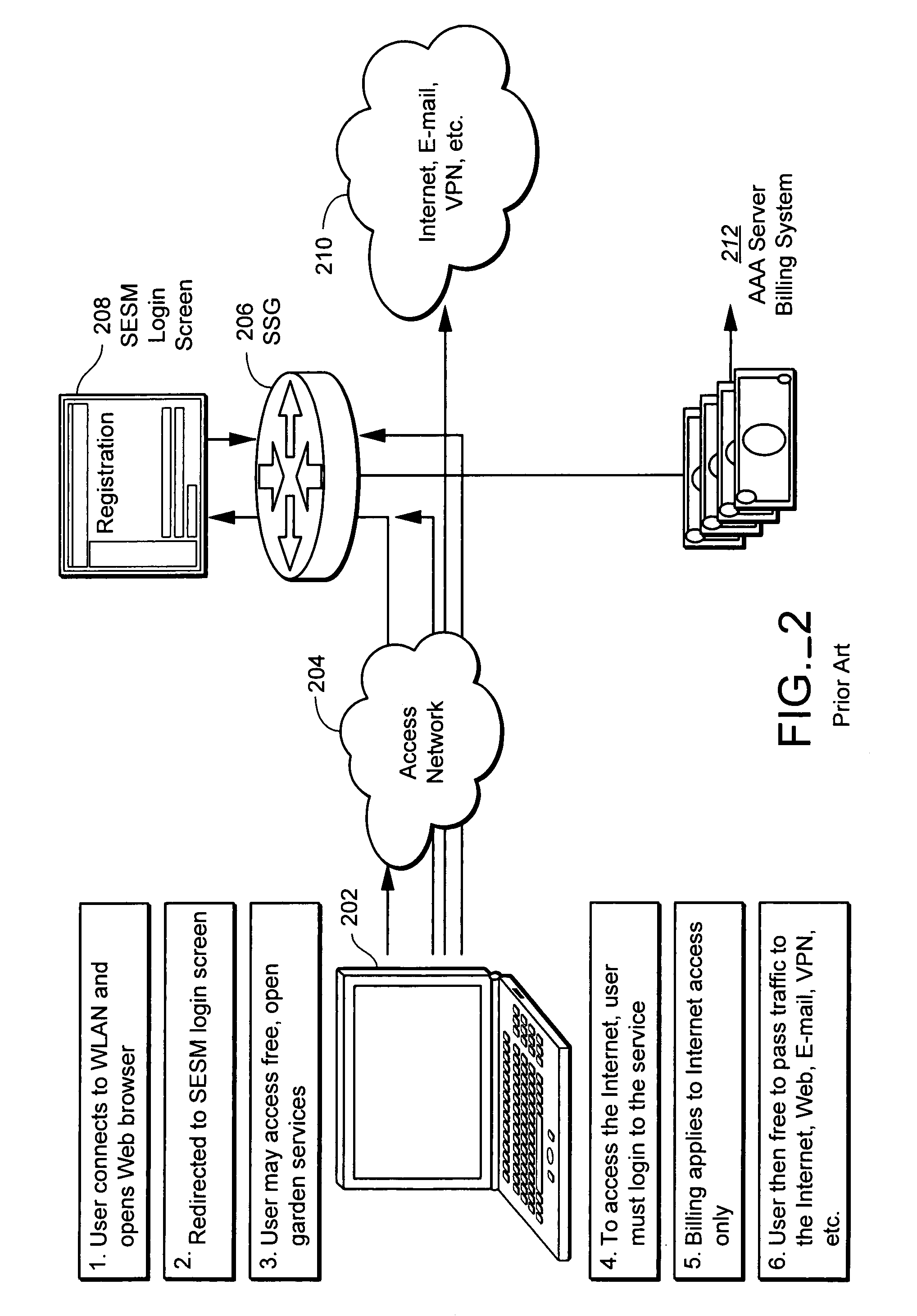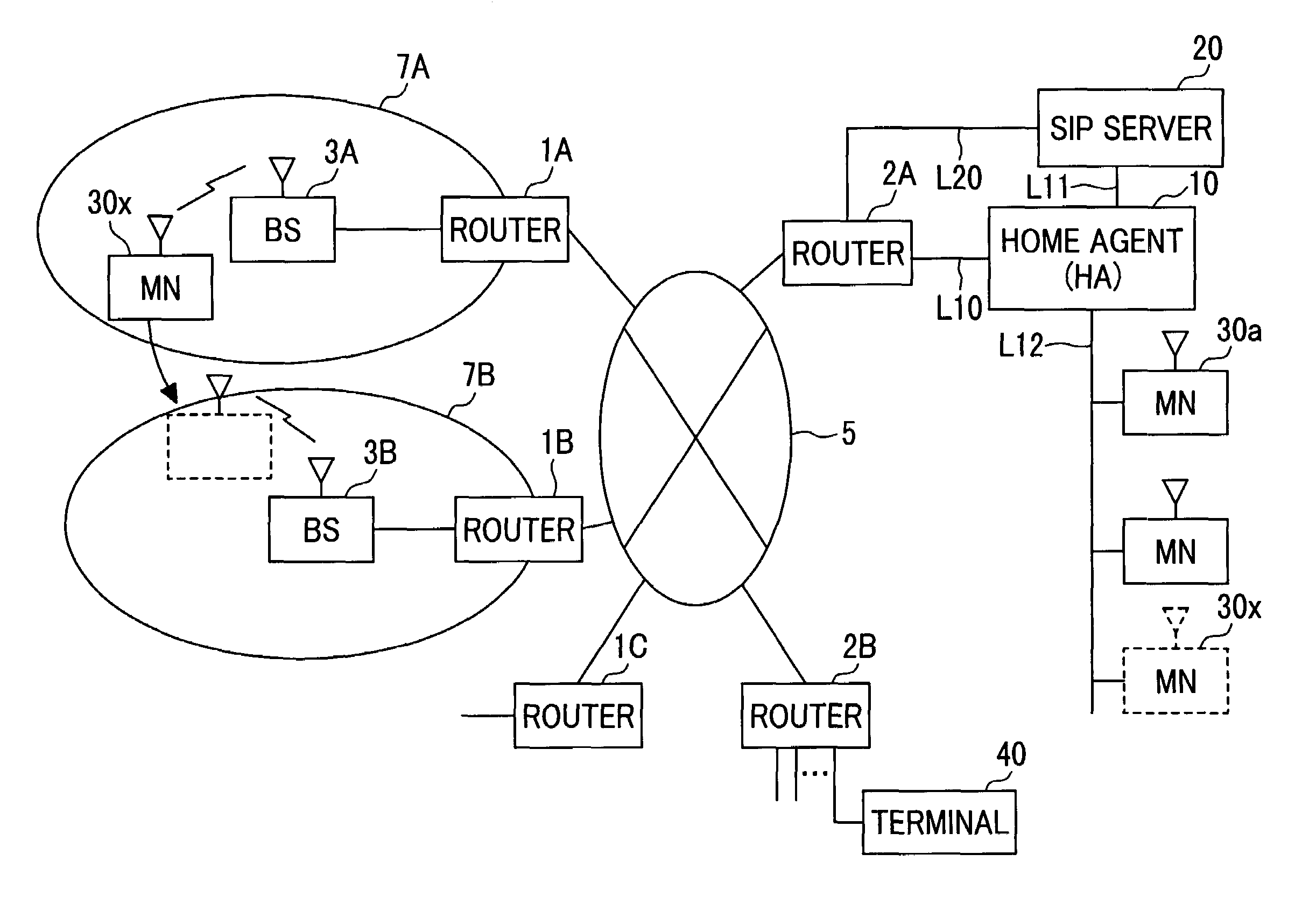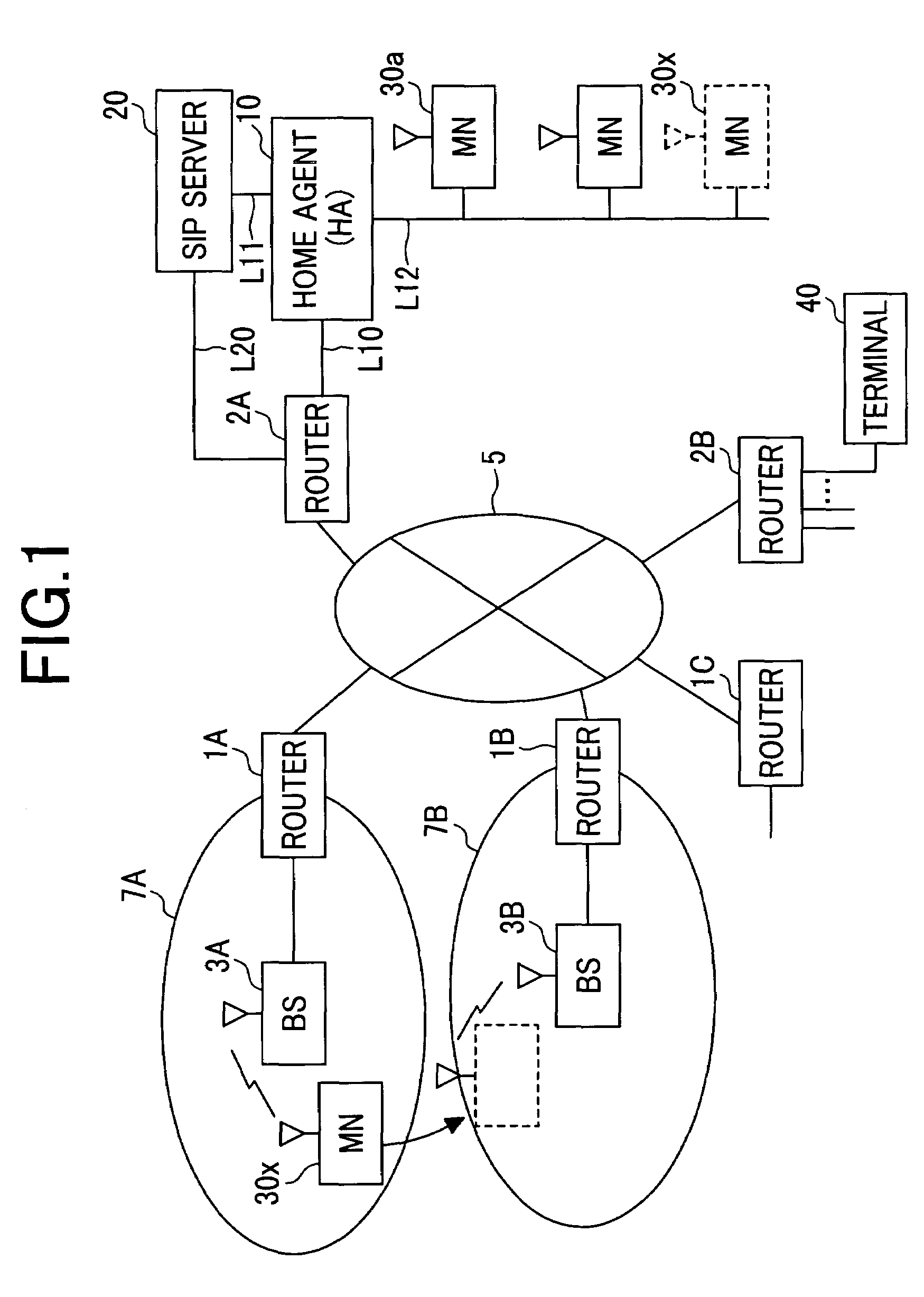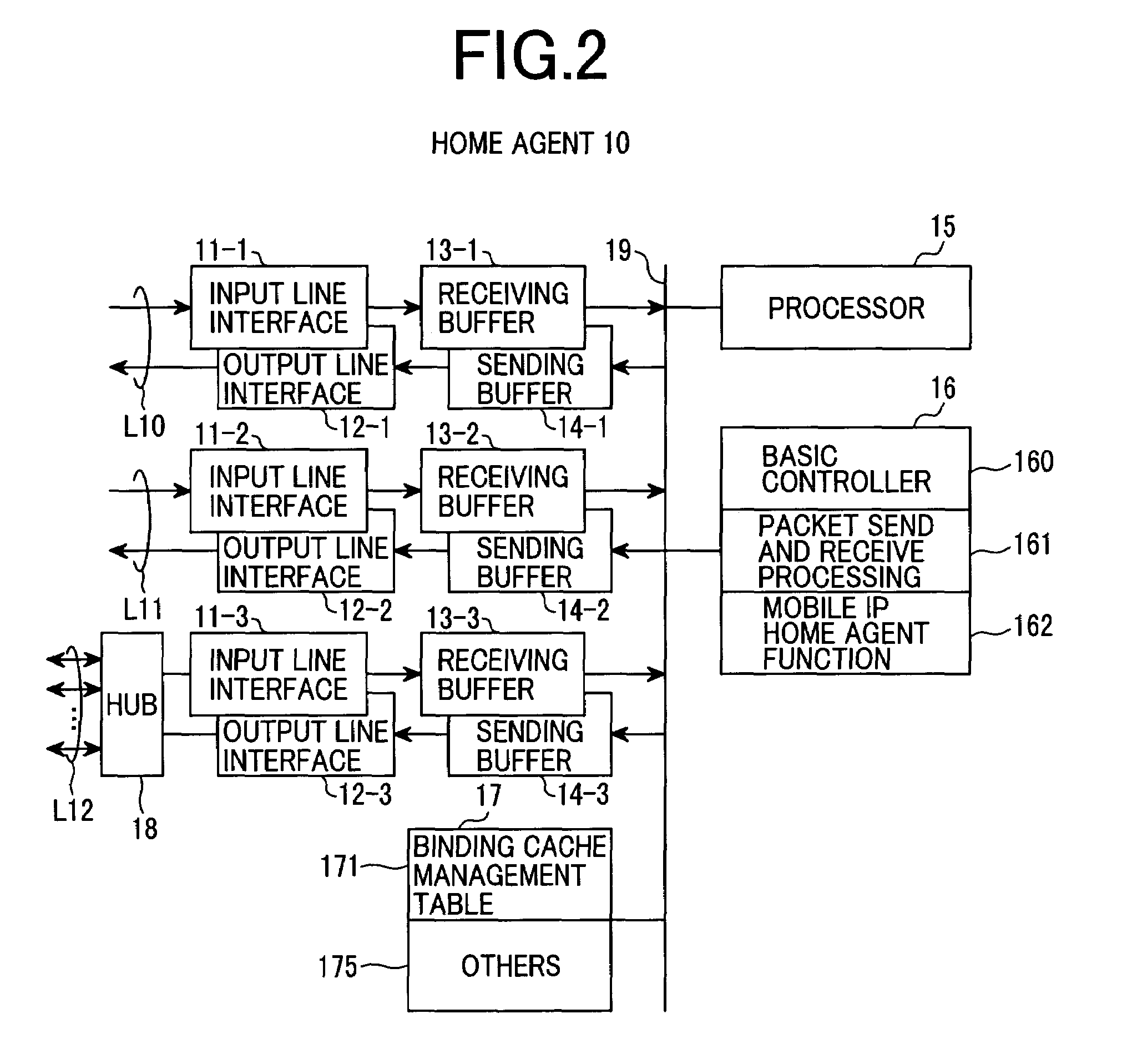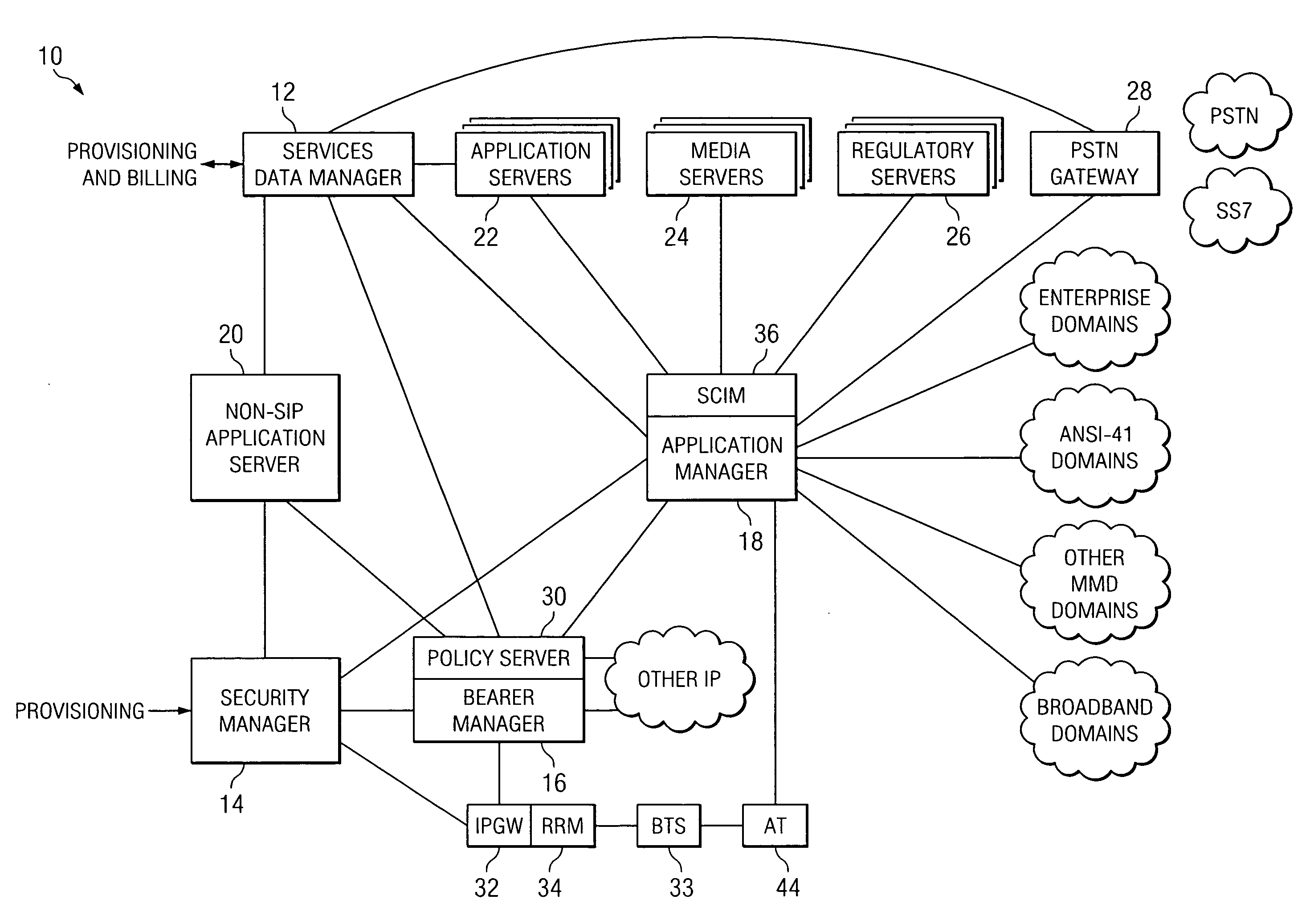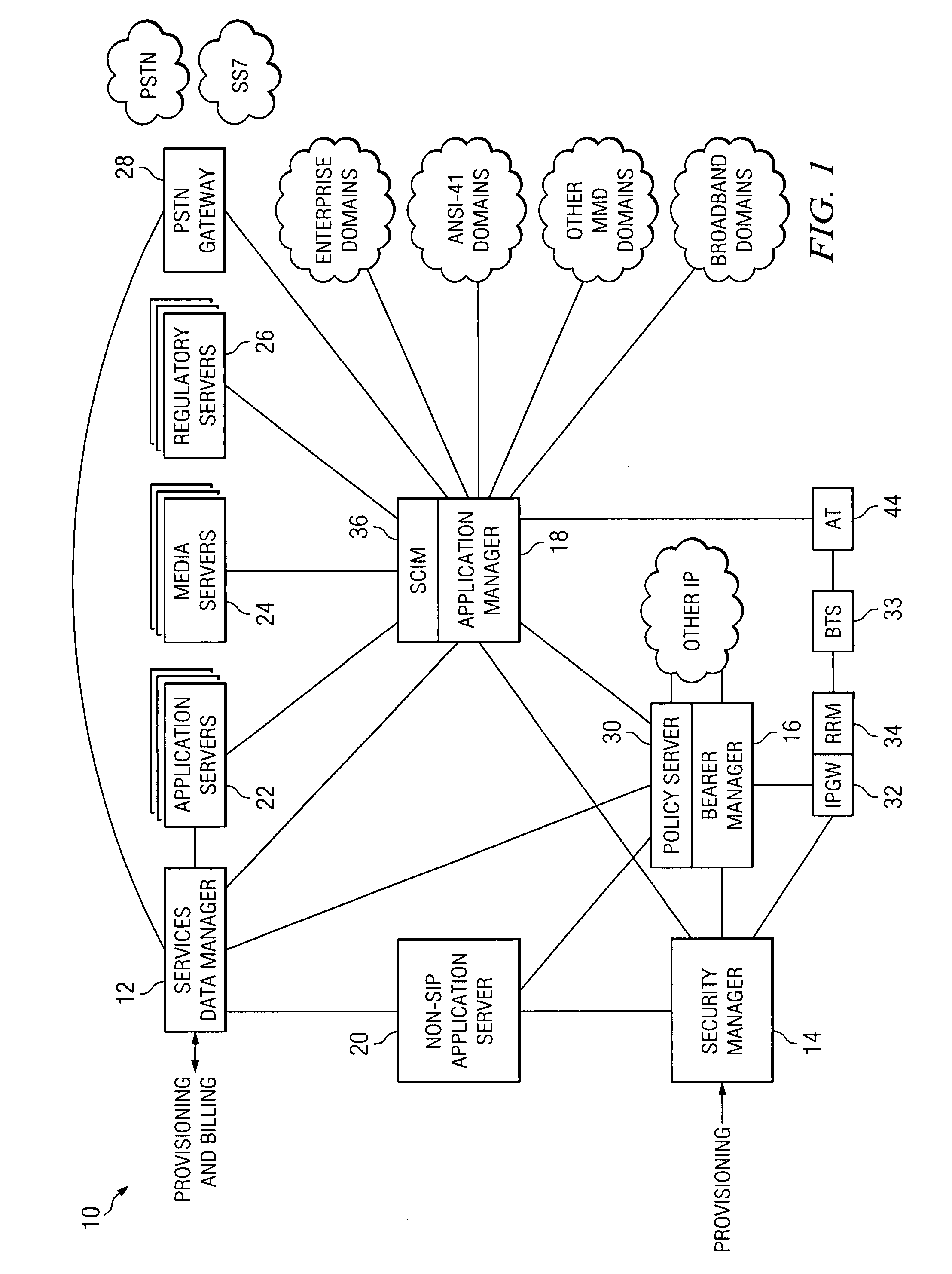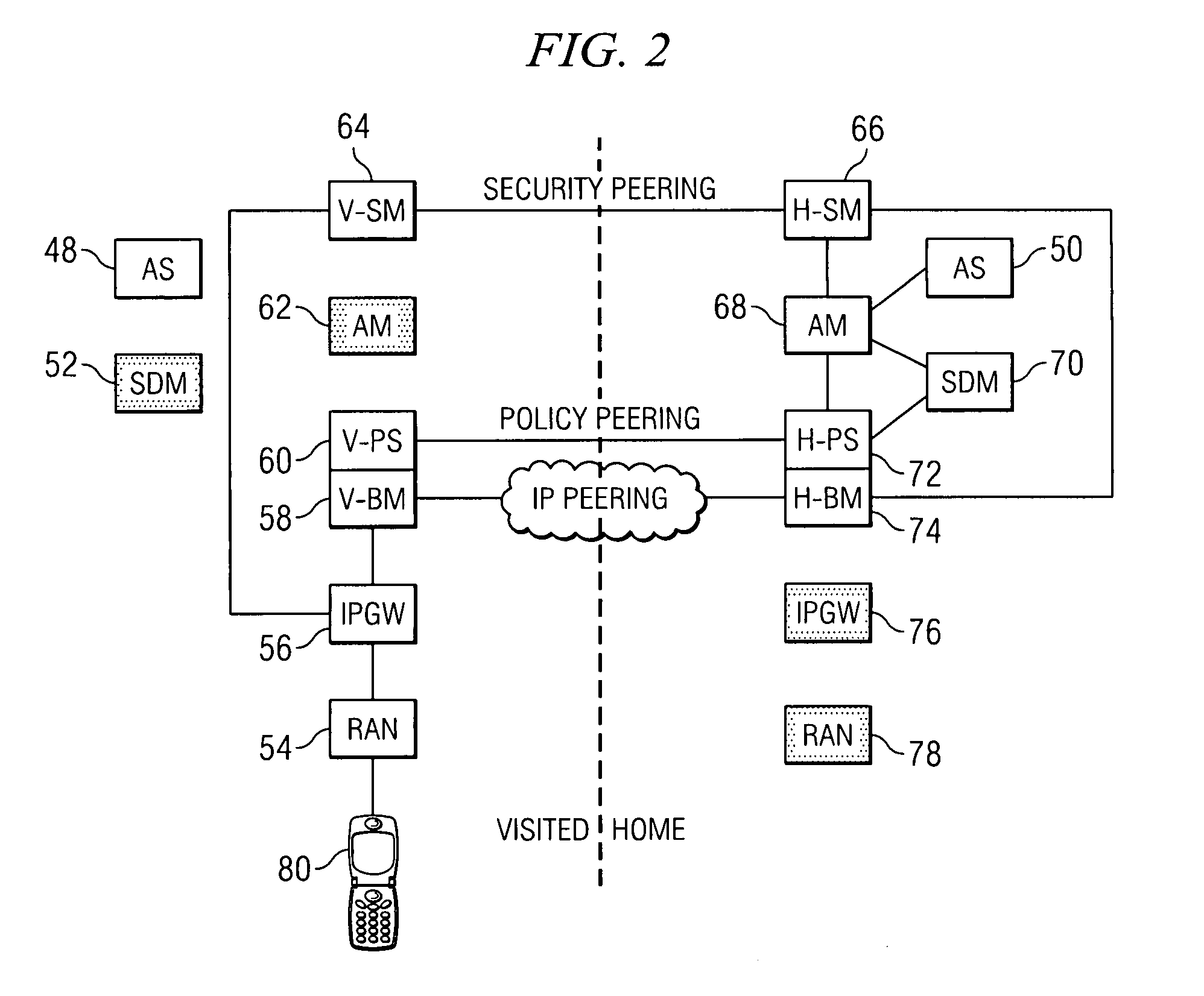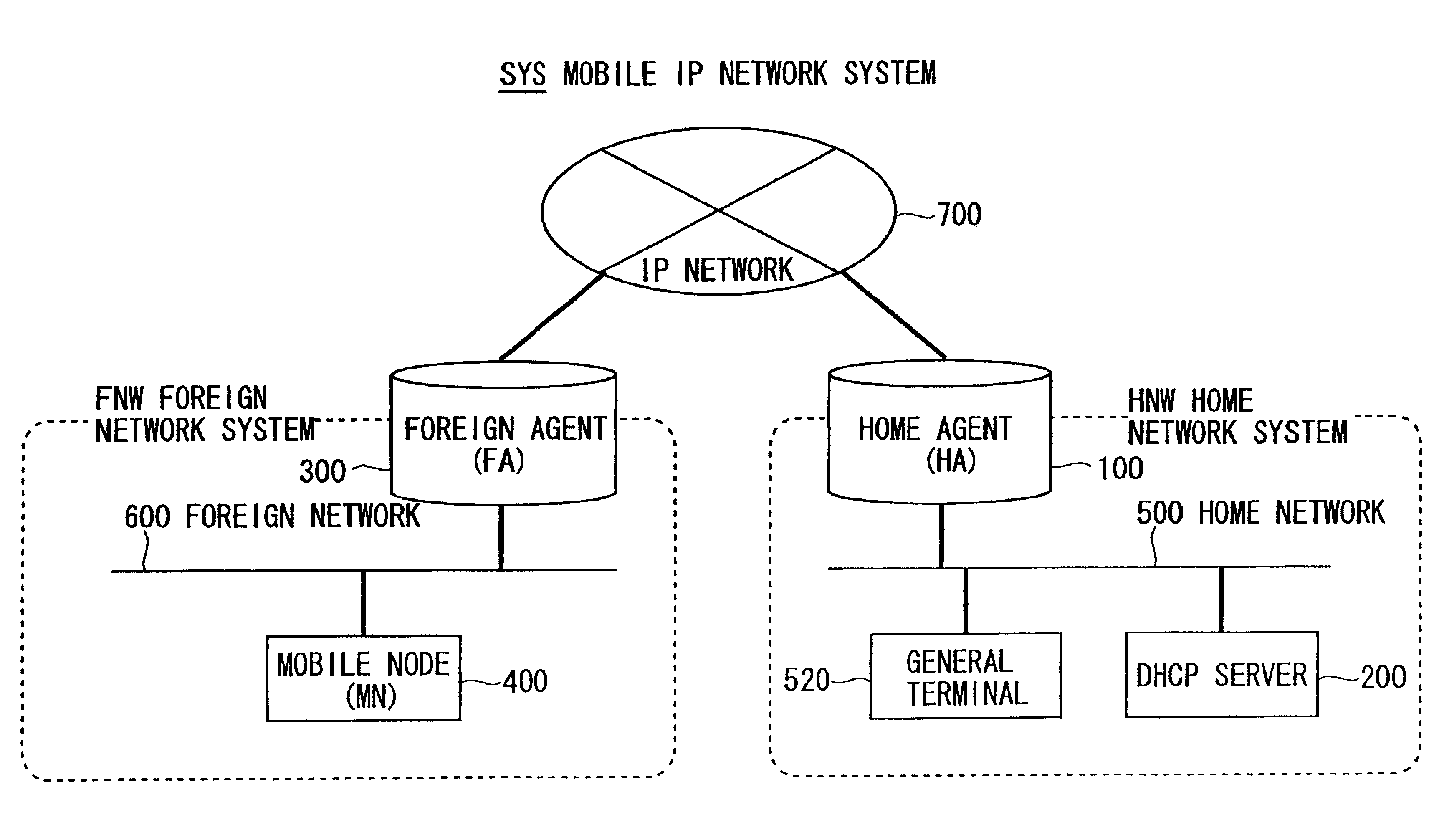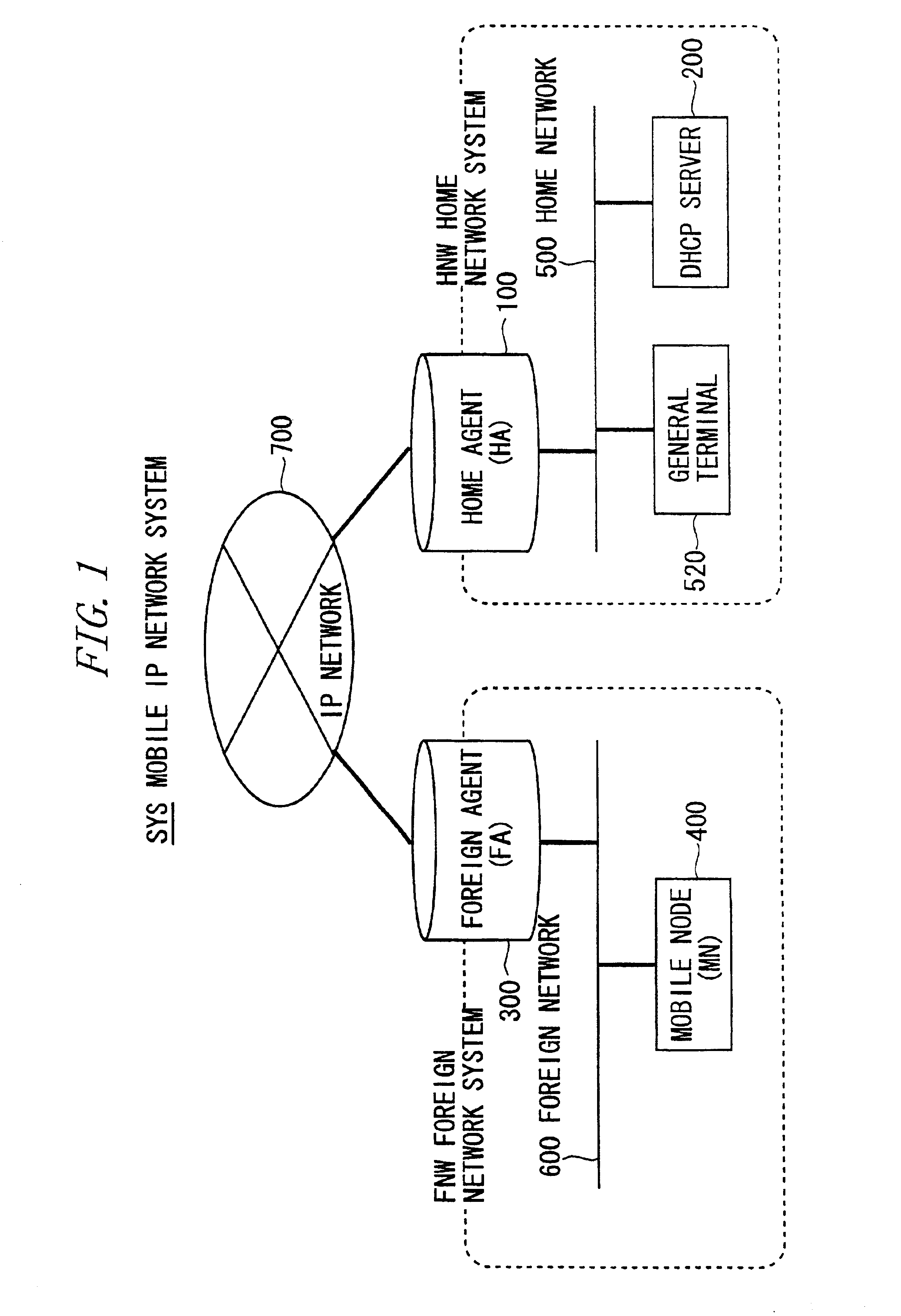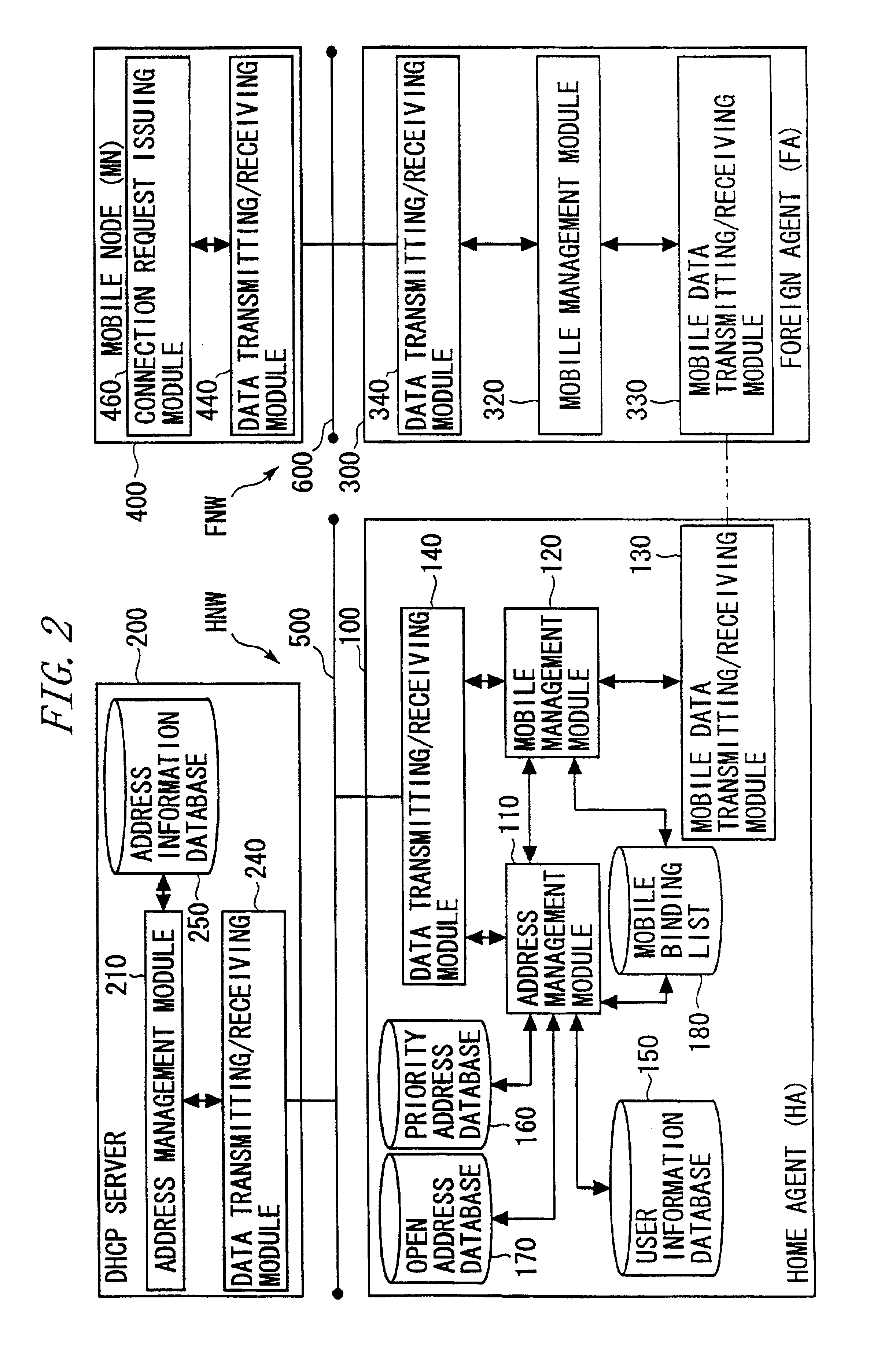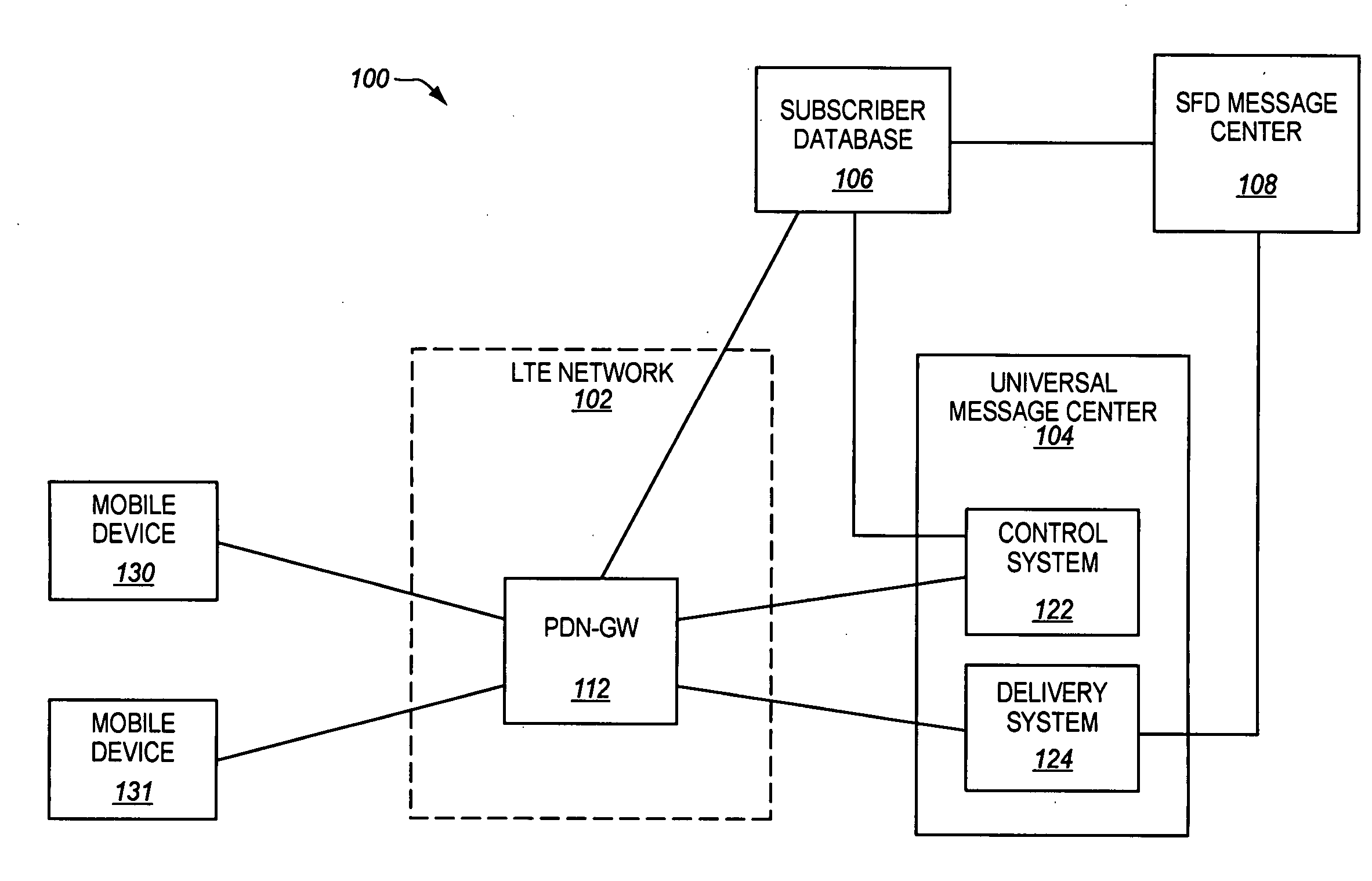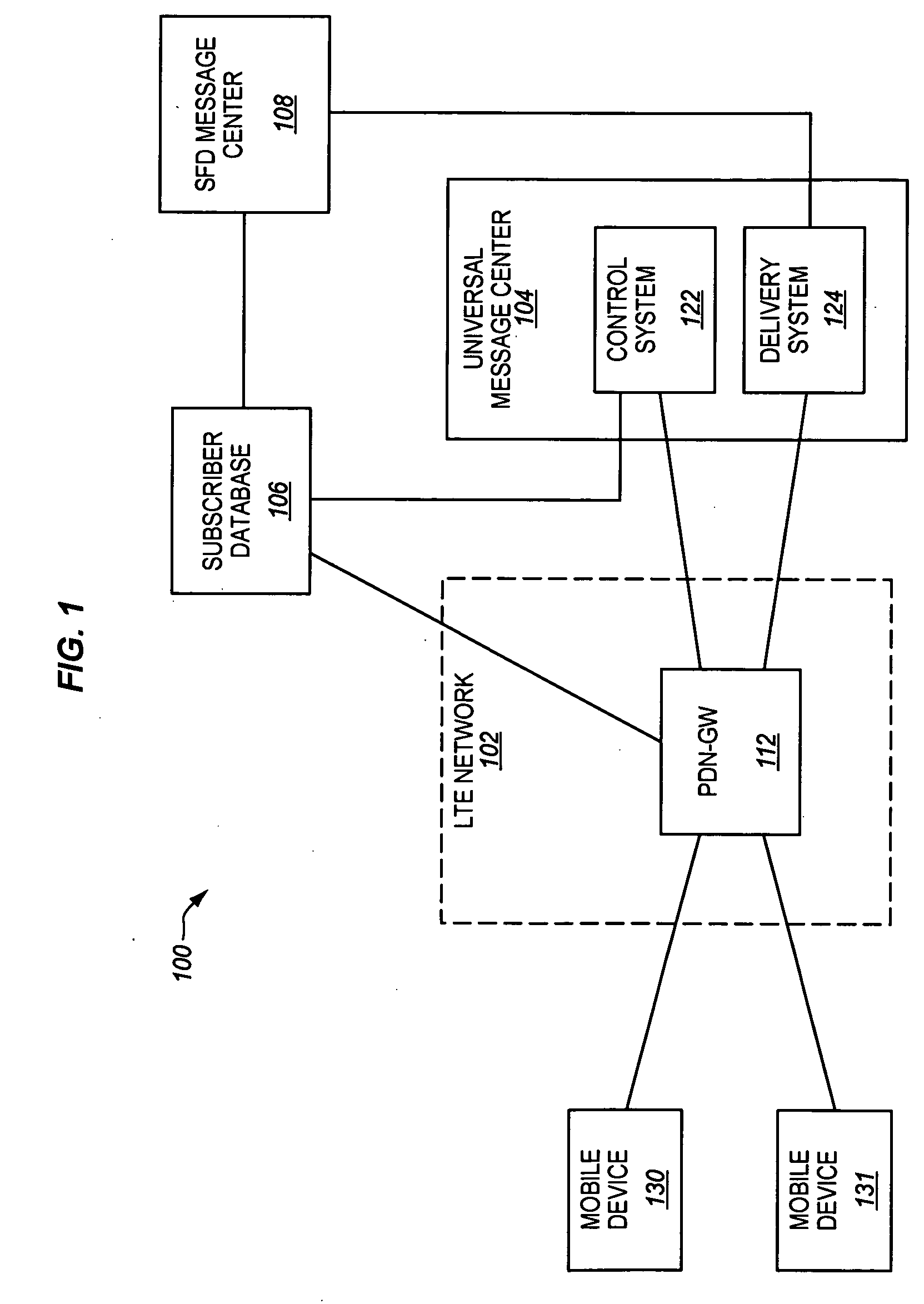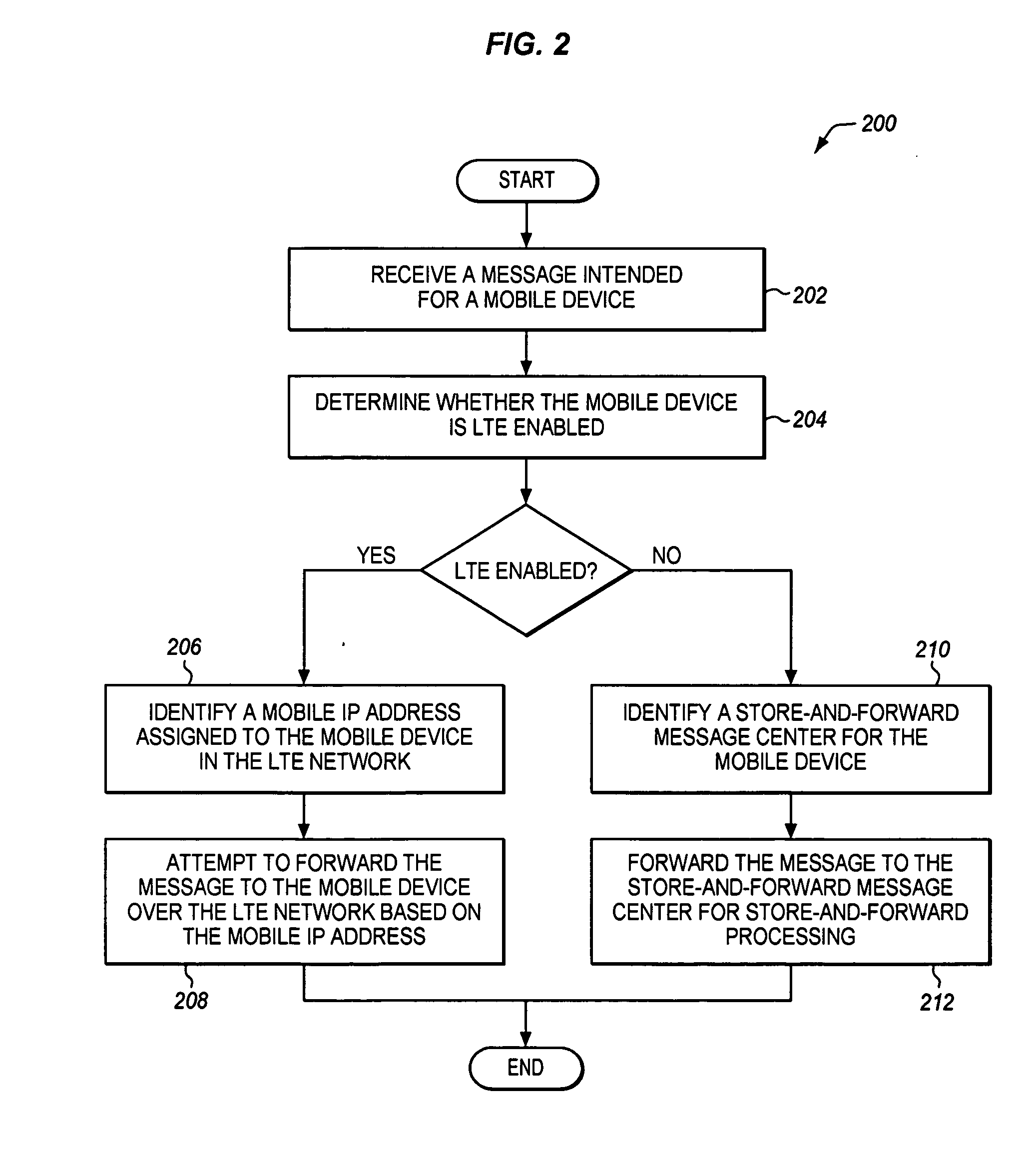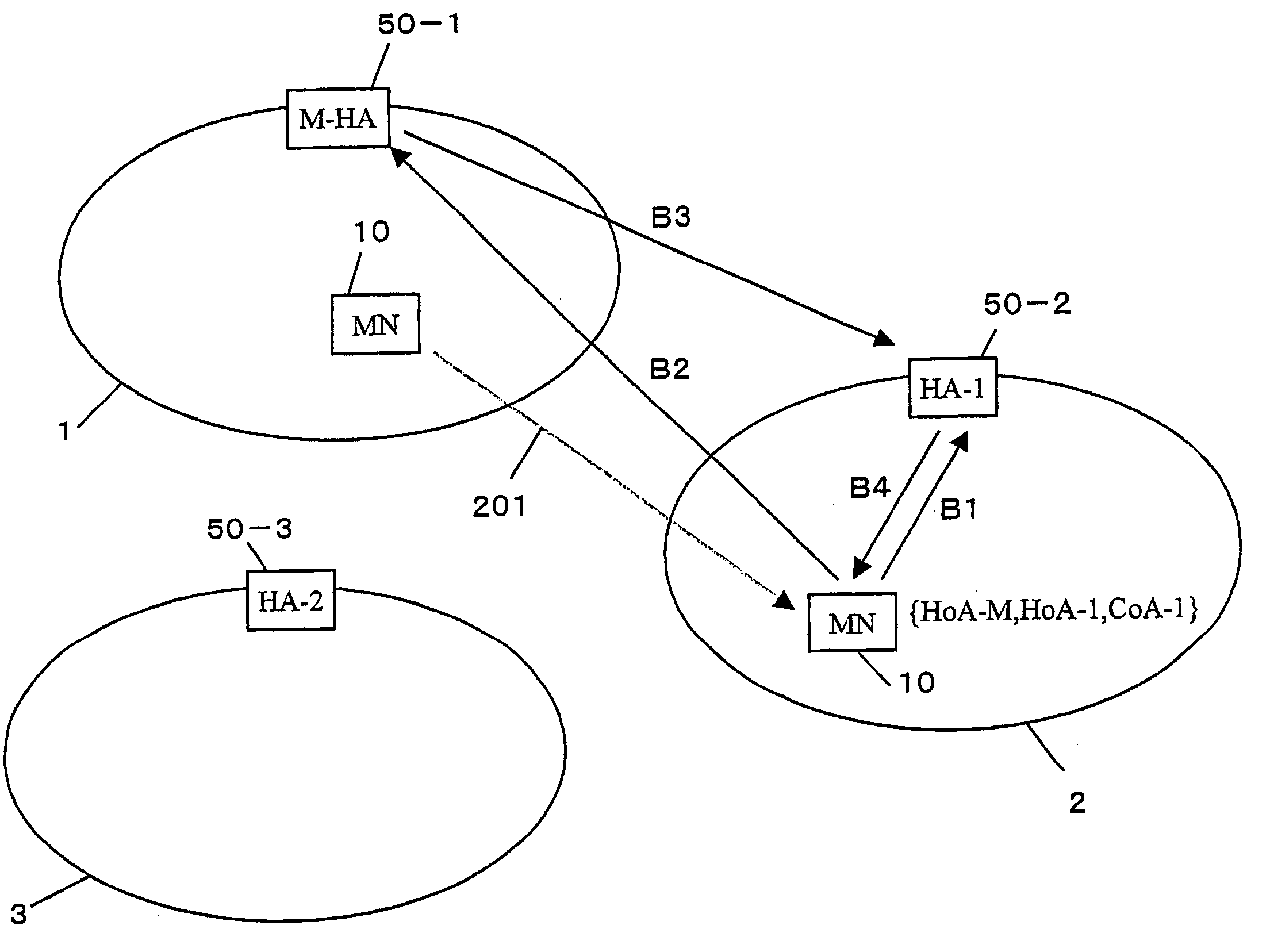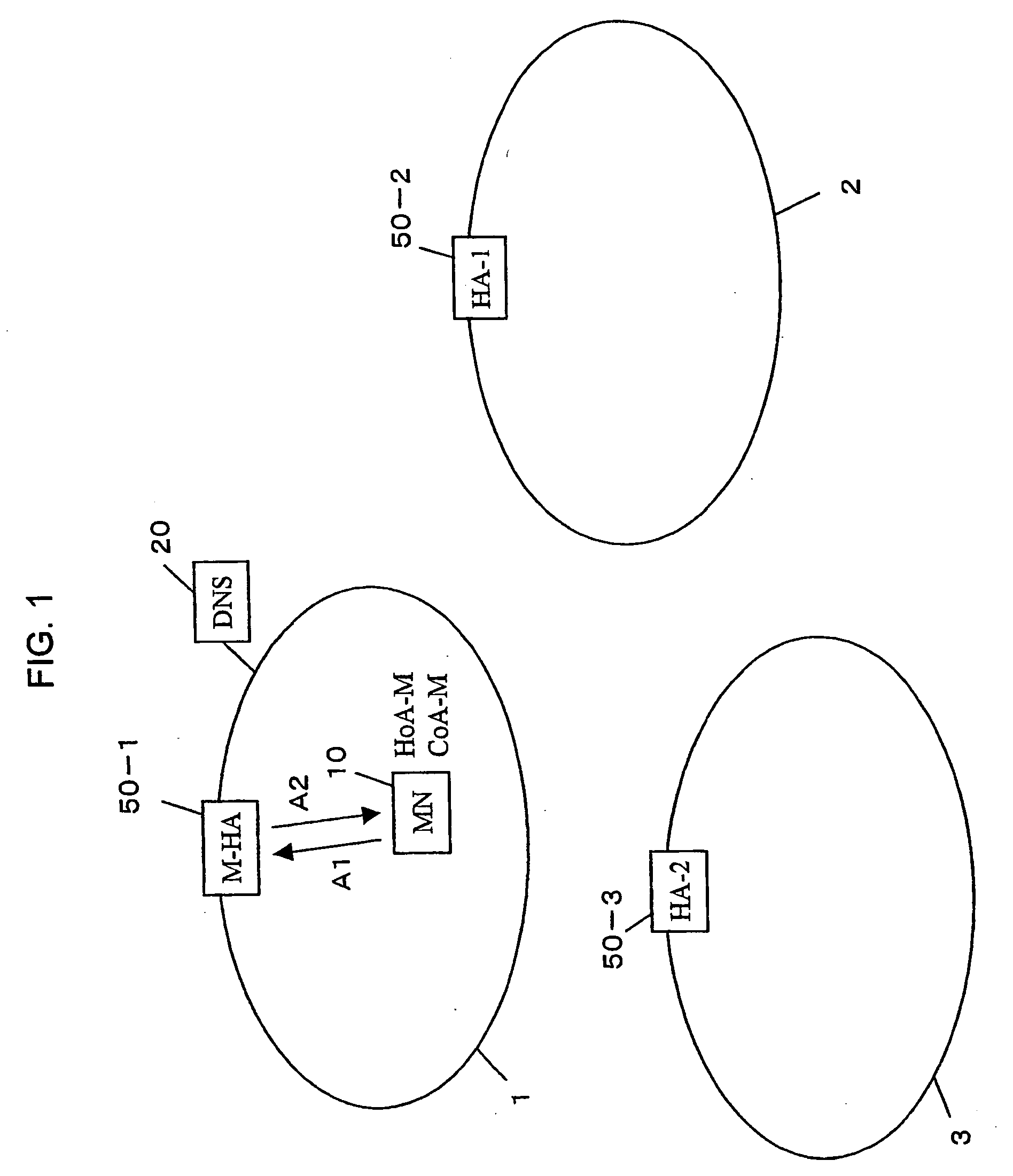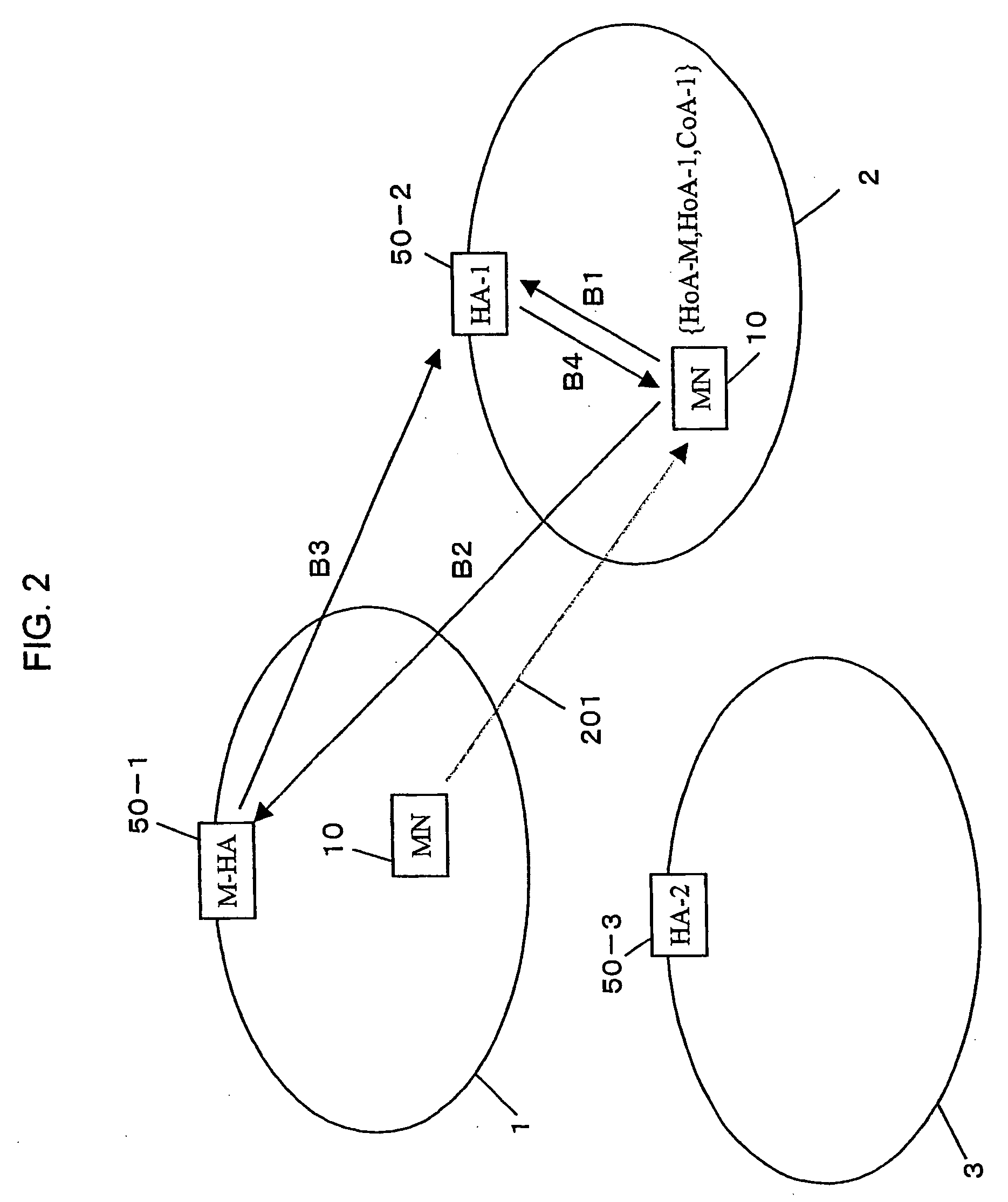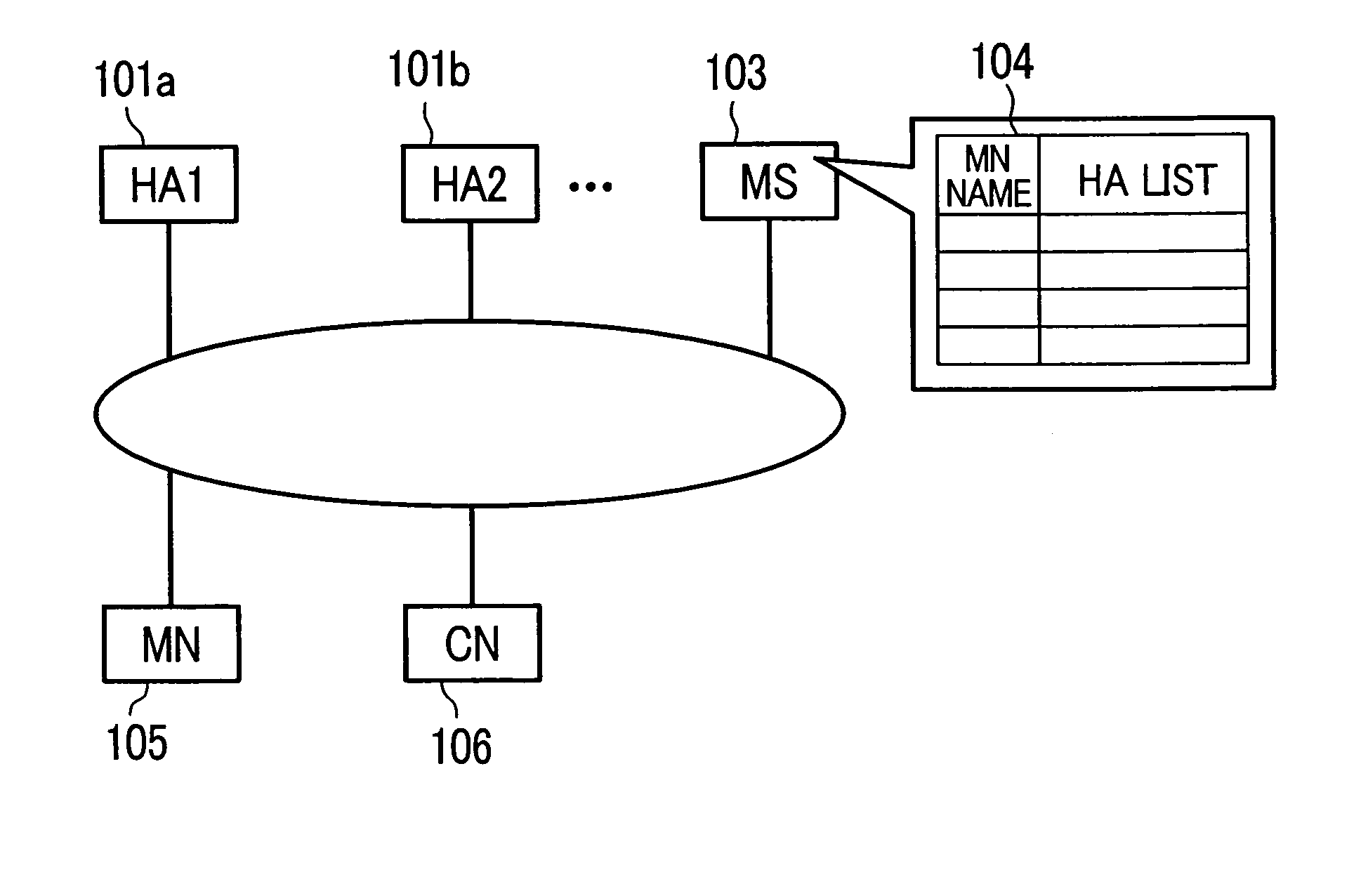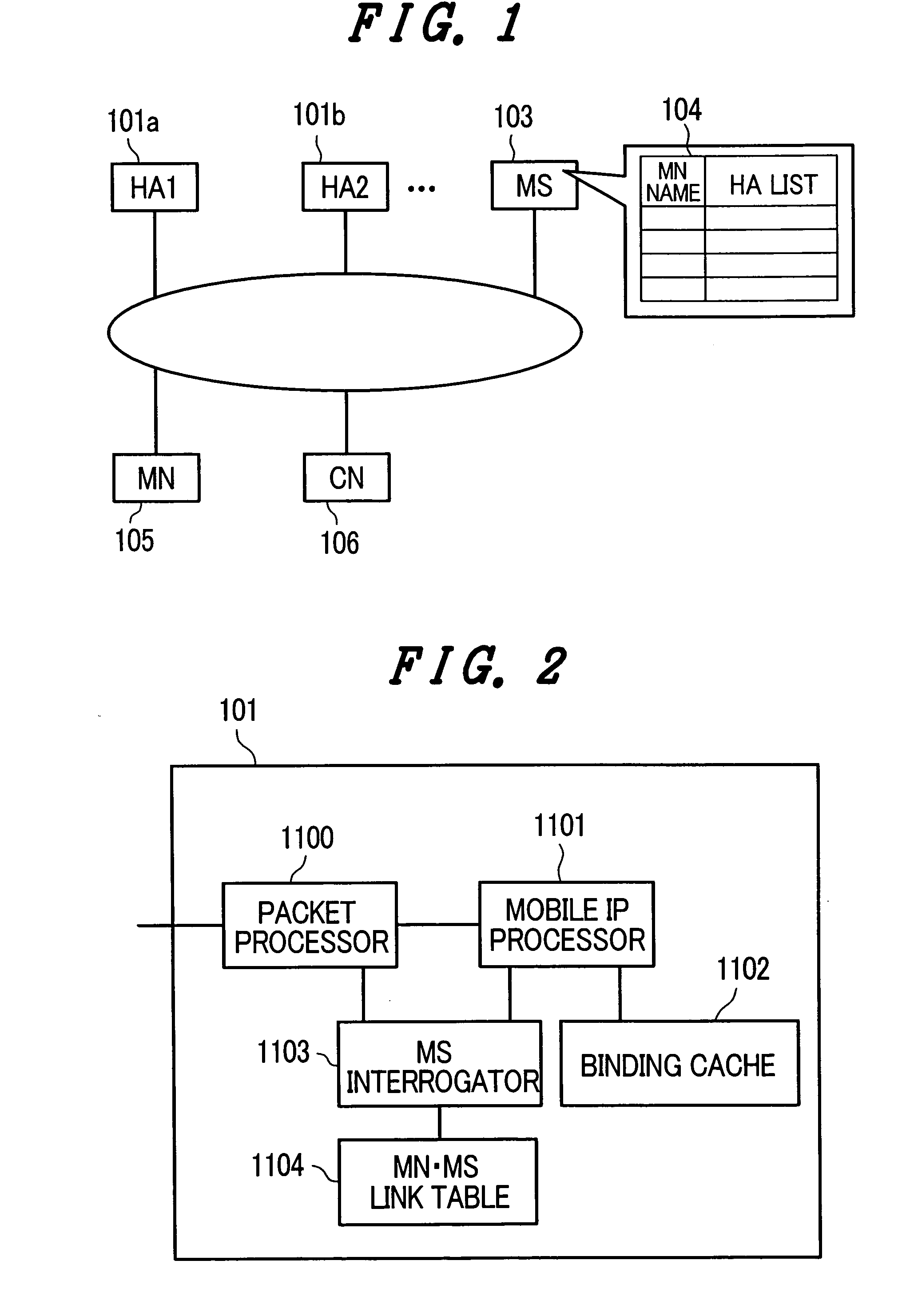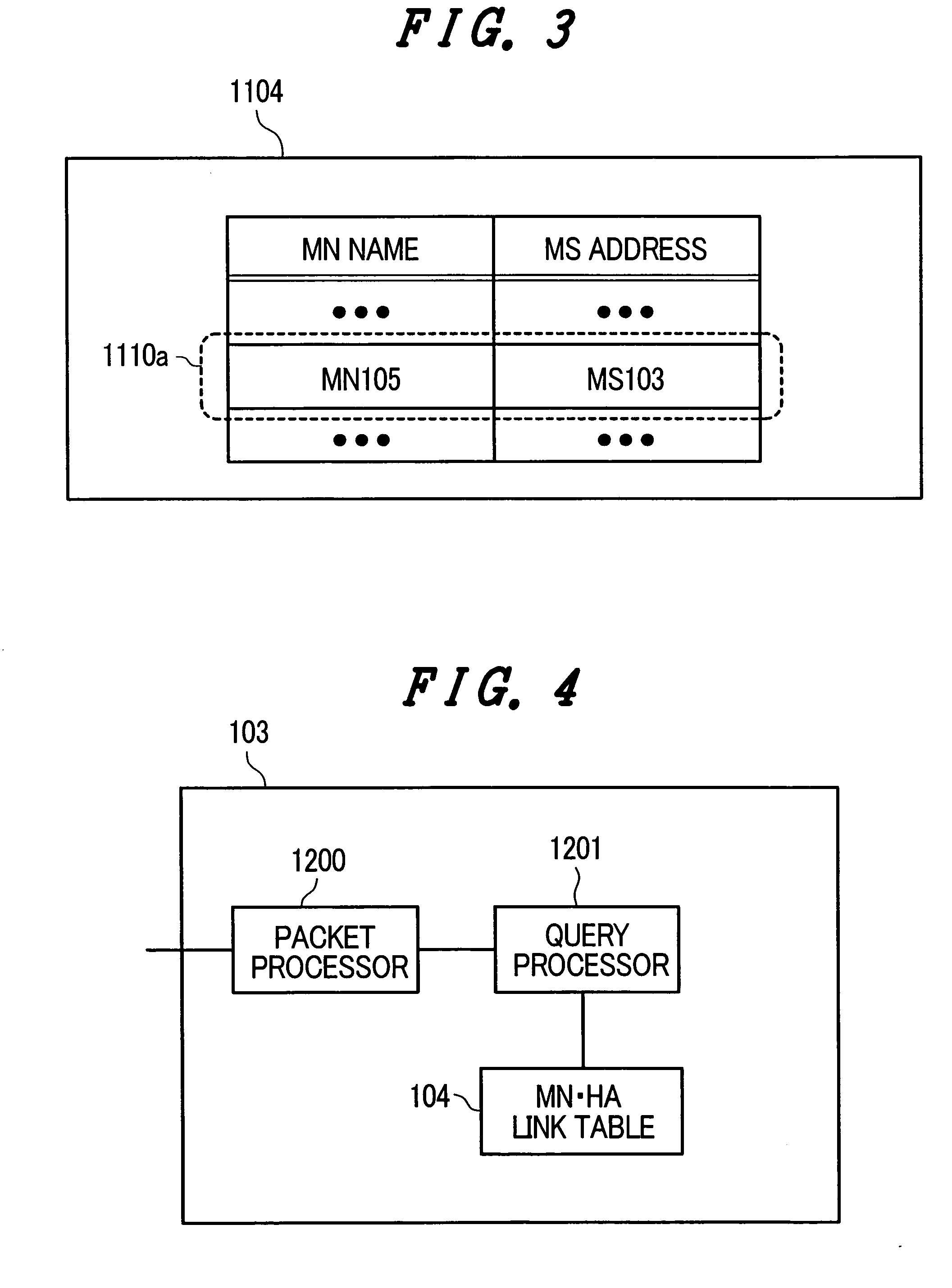Patents
Literature
472 results about "Mobile IP" patented technology
Efficacy Topic
Property
Owner
Technical Advancement
Application Domain
Technology Topic
Technology Field Word
Patent Country/Region
Patent Type
Patent Status
Application Year
Inventor
Mobile IP (or MIP) is an Internet Engineering Task Force (IETF) standard communications protocol that is designed to allow mobile device users to move from one network to another while maintaining a permanent IP address. Mobile IP for IPv4 is described in IETF RFC 5944, and extensions are defined in IETF RFC 4721. Mobile IPv6, the IP mobility implementation for the next generation of the Internet Protocol, IPv6, is described in RFC 6275.
Method and system for distributed network address translation with network security features
InactiveUS7032242B1Digital data processing detailsUser identity/authority verificationSecurity associationIp address
A method and system for distributed network address translation with security features. The method and system allow Internet Protocol security protocol (“IPsec”) to be used with distributed network address translation. The distributed network address translation is accomplished with IPsec by mapping a local Internet Protocol (“IP”) address of a given local network device and a IPsec Security Parameter Index (“SPI”) associated with an inbound IPsec Security Association (“SA”) that terminates at the local network device. A router allocates locally unique security values that are used as the IPsec SPIs. A router used for distributed network address translation is used as a local certificate authority that may vouch for identities of local network devices, allowing local network devices to bind a public key to a security name space that combines a global IP address for the router with a set of locally unique port numbers used for distributed network address translation. The router issues security certificates and may itself be authenticated by a higher certificate authority. Using a security certificate, a local network device may initiate and be a termination point of an IPsec security association to virtually any other network device on an IP network like the Internet or an intranet. The method and system may also allow distributed network address translation with security features to be used with Mobile IP or other protocols in the Internet Protocol suite.
Owner:HEWLETT-PACKARD ENTERPRISE DEV LP
Method, apparatus and system for optimizing routing of mobile IP packets
Network devices on mobile networks may be configured to improve and optimize packet processing and routing. Specifically, a home agent device may be decomposed into its major functionality, namely processing and routing. Various processors on the device are assigned to specific tasks and each processor may be optimized for its specific tasks, thus improving packet processing and routing. The home agent device may comprise one or more physical components.
Owner:BEIJING XIAOMI MOBILE SOFTWARE CO LTD
Wireless access of packet based networks
A General Packet Radio Service (GPRS) Accessed Extended Mobile Internet Protocol (EMIP) [G-EMIP] network is provided for wireless mobile device access to external packet data networks. Domains are defined to incorporate a subnet of standard GPRS and EMIP network entities accessed through a Domain Router. Packet access at the radio interface is provided using the base station portion of a GPRS network. Wireless link specific processing is relegated to this potion of the G-EMIP network. EMIP is utilized as a backbone network to provide mobility and service management and interconnection to external networks. A GPRS-IP Interworking entity (GII) interworks IP and GPRS protocols between GPRS and IP addressable network entities (i.e., translates messages of each protocol to corresponding messages of the other protocol). Mobility-related functionality is handled at the IP (network) layer. Mobile IP is used to support the macro-mobility and Handoff-Aware Wireless Access Internet Infrastructure (HAWAII) is used to support micro-mobility and paging. The Domain Router provides packet service management and interacts with a Home Location Register / Authentication Center, which provides GRPS registration, authentication and encryption.
Owner:LUCENT TECH INC +1
System and method for measuring and recording latency in internet protocol networks
ActiveUS7610396B2Metering/charging/biilling arrangementsTelephonic communicationComputer scienceMobile IP
A system and method for measuring and recording latency in data networks. The system and method can be used to measure and record latency in a Simple IP network or a Mobile IP network. One embodiment of the present invention is a system and method for measuring latency between a first device and a second device, the first and second devices communicating in accordance with a communications specification. The system and method comprises the second device transmitting, during a communication session, a message to the first device; receiving a response message from the first device; computing an elapsed time from transmission of the message to receipt of the response message to determine the latency; and recording the latency in a latency parameter. The message and the response message are provided by the communications specification.
Owner:U S CELLULAR
Method and system for re-direction and handoff for pre-paid mobile services in third generation networks
InactiveUS6973309B1Adversely affectingMetering/charging/biilling arrangementsPrepayment with real-time account/card rechargingThird generationMobile service
A method and system for re-direction and handoff for pre-paid mobile services in third generation (“3G”) networks. A handoff marker is created and used for wireless mobile nodes such as Mobile Internet Protocol (“Mobile IP”) nodes. The handoff markers allow the wireless mobile nodes to use pre-paid mobile services, have active communications sessions suspended and re-directed to a registration server when purchased pre-paid mobile services run-out. The registration server allows the wireless mobile node to electronically purchase additional pre-paid mobile services and immediately resume a suspended communications session. The handoff markers also allows network devices in a mobile network to determine between initiation of a new communications session or a hard handoff of an existing communication session, without adversely affecting pre-paid billing services.
Owner:UTSTARCOM INC
Dynamic network allocation for mobile router
InactiveUS6959341B1Network topologiesMultiple digital computer combinationsComputer networkMobile IP
Methods and apparatus for implementing a Home Agent supporting Mobile IP and being capable of allocating one or more networks to a mobile router which registers with the Home Agent comprise receiving a registration request packet from the mobile router, the registration request packet including a network allocation extension indicating one or more networks being requested by the mobile router from the Home Agent. The one or more networks are allocated to the mobile router corresponding to the network allocation extension of the registration request packet. A registration reply packet including a network allocation extension identifying the one or more networks allocated to the mobile router is then sent to the mobile router.
Owner:CISCO TECH INC
Methods and apparatus for dynamic session key generation and rekeying in mobile IP
ActiveUS20050025091A1Eliminate needDigital data processing detailsUser identity/authority verificationPasswordRe keying
Methods and apparatus for providing a centralized source of session keys to be shared by a Home Agent and a Mobile Node are disclosed. In accordance with one aspect of the invention, a Mobile Node registers with a Home Agent supporting Mobile IP by sending a registration request to the Home Agent. The Home Agent sends a request message (e.g., access-request message) to a AAA server, the request message identifying the Mobile Node. The AAA server then derives key information from a key or password associated with the Mobile Node. The AAA server then sends a reply message (e.g., access-reply message) to the Home Agent, the reply message including the key information associated with the Mobile Node, thereby enabling the Home Agent to derive a shared key to be shared between the Mobile Node and the Home Agent from the key information. The Home Agent derives a key from the key information, the key being a shared key between the Mobile Node and the Home Agent. A registration reply is then sent to the Mobile Node. When the Mobile Node receives a registration reply from the Home Agent, the registration reply indicates that the Mobile Node is to derive a key to be shared between the Mobile Node and the Home Agent. The Mobile Node then derives a key to be shared between the Mobile Node and the Home Agent from key information stored at the Mobile Node. The Mobile Node may initiate “re-keying” by sending a subsequent registration request to the Home Agent.
Owner:CISCO TECH INC
Methods and apparatus for achieving route optimization and location privacy in an IPV6 network
ActiveUS20060018291A1Data switching by path configurationWireless network protocolsTelecommunicationsMobile IP
Methods and apparatus for performing proxy registration on behalf of a node with a Home Agent supporting Mobile IP are disclosed. A first registration request is composed on behalf of the node and transmitted to the Home Agent via a first Local Mobility Anchor, wherein the first Local Mobility Anchor is a regional controller via which registration is performed when the node moves within a region associated with the first Local Mobility Anchor. When the node moves within a region or between regions, the node is re-registered. Specifically, a second registration request is composed and transmitted to the first Local Mobility Anchor when the node moves within the region associated with the first Local Mobility Anchor. When the node moves into a second region associated with a second Local Mobility Anchor and outside the first region associated with the first Local Mobility Anchor, a second registration request is composed and transmitted to the Home Agent via the second Local Mobility Anchor, wherein the second Local Mobility Anchor is a regional controller via which registration is performed when the node moves within a region associated with second first Local Mobility Anchor.
Owner:CISCO TECH INC
Method and system for mobile IP home agent redundancy by using home agent control nodes for managing multiple home agents
InactiveUS7080151B1Reduce failed callImprove user satisfactionMultiprogramming arrangementsCommmunication supplementary servicesComputer networkMulticast network
A method and system for Mobile Internet Protocol (IP) device redundancy. As mobile devices roam away from a home network and change a connective status, mobility binding records are sent to a multicast network address on the home network. The multicast network address multicasts the mobility binding records to other active Mobile IP home agent control nodes, standby home agent control nodes and standby home agents on the home network. The method and system allows standby home agent control nodes or standby home agents to be transparently switched for active home agent control nodes or active home agents that fail without downloading or uploading large numbers of mobility binding records after a failure. The method and system may also help reduce failed calls (e.g., data sessions including Voice over IP (VoIP), H.323, etc.), network congestion and improve user satisfaction in Mobile IP systems.
Owner:UTSTARCOM INC
VPN system in mobile IP network, and method of setting VPN
InactiveUS7068640B2Improve user convenienceData taking preventionTime-division multiplexAuthentication serverMobile IP
Linked with a position registration procedure in a mobile IP, the invention provides a VPN setting service using an IP Sec. tunnel between optional terminals without requiring these terminals to have a specific VPN function. This service is provided by a mobile terminal, authentication servers, a VPN database, and network apparatuses. A home authentication server extracts from the VPN database the VPN information of a user who has requested the authentication at the time of making a position registration request from the mobile terminal. The home authentication server then posts the VPN information to each network apparatus using a predetermined position registration message and an authentication response message. Based on the posted VPN information, the network apparatuses set a VPN path by the IP Sec. to between a home network apparatus and an external network apparatus, between the home network apparatus and a predetermined network apparatus, and / or the external network apparatus and the predetermined network apparatus, respectively.
Owner:FUJITSU LTD
Method for grouping 802.11 stations into authorized service sets to differentiate network access and services
InactiveUS6950628B1Near-field transmissionElectric signal transmission systemsTelecommunicationsNetwork service
A method for associating a WSTA to a service set, wherein the service set is configurable at the AP. Each service set is an arbitrary grouping of one or more network service parameters, and is typically configured for either VLAN or proxy mobile IP host. When a wireless station desires to associate with an access point, the wireless station sends a message to the access point, the message containing a SSID. The access point then matches the SSID to a service set and associates the WSTA to either a home subnet or a VLAN based on the SSID. By locally configuring the service set, the default VLAN and home subnet for a WSTA may be different at each AP the WSTA encounters. A security server is configured with a list of allowed SSIDs for each wireless station to prevent unauthorized access to a VLAN or home subnet.
Owner:CISCO TECH INC
Enhanced cross-network handoff for mobile IP service mobility
ActiveUS20080159232A1Assess restrictionData switching by path configurationAccess networkQuality of service
A system and method are described whereby an enhanced handoff scheme provides for monitoring of mobile device conditions and network conditions associated with a current access network attachment, as well as with a plurality of access networks on a preferred access network list, to proactively initiate a handoff operation, thereby preserving the QoS constraints necessary for seamless delivery of IP multimedia services. In an embodiment, each of the plurality of access networks is connected to an IMS core network, whereby a policy function receives quality of service constraints associated with the launched application from the mobile device and orders a list of preferred access networks accordingly. Preferably, the policy function selects an appropriate access gateway associated with a target access network based at least in part on the mobile device conditions reported by the mobile device and the access network conditions monitored by the policy function.
Owner:U S CELLULAR
Method and system for providing a mobile IP network with non-path dependent intra domain quality of service
InactiveUS7269657B1Improve abilitiesImprove efficiencyError preventionTransmission systemsDomain nameQuality of service
A system and method for providing quality of service (QoS) service over a mobile IP network with dynamic domains, multiple or distributed QoS managers per domain and / or with network congestion feedback being used to establish an estimated total domain bandwidth which is used for regulating access to a domain.
Owner:ROCKWELL COLLINS INC
Routing method for mobile wireless nodes having overlapping internet protocol home addresses
InactiveUS6684256B1Multiple digital computer combinationsWireless network protocolsIp addressWireless data
In mobile IP wireless data networking, methods are described for correctly routing packets through a foreign agent to or from wireless nodes where the wireless nodes have the same home network IP address. Instead of using normal IP routing, the foreign agent uniquely identifies the wireless node's home network IP address and home agent IP address with a PPP link address associated with a PPP link between the foreign agent and the wireless node. This association between PPP link addresses, home agent IP addresses, and home network IP addresses, is preferably implemented in software as a table stored in the foreign agent. The routing of packets through the foreign agent to the mobile nodes is performed by reference to the table. The table allows the foreign agent to correctly and efficiently route packets in the situation where multiple wireless nodes are registered with the foreign agent, but more than one of the wireless nodes have the same home network IP address.
Owner:UTSTARCOM INC
Method for grouping 802.11 stations into authorized service sets to differentiate network access and services
ActiveUS20050185626A1Electric signal transmission systemsFrequency-division multiplex detailsTelecommunicationsNetwork service
A method for associating a WSTA to a service set, wherein the service set is configurable at the AP. Each service set is an arbitrary grouping of one or more network service parameters, and is typically configured for either VLAN or proxy mobile IP host. When a wireless station desires to associate with an access point, the wireless station sends a message to the access point, the message containing a SSID. The access point then matches the SSID to a service set and associates the WSTA to either a home subnet or a VLAN based on the SSID. By locally configuring the service set, the default VLAN and home subnet for a WSTA may be different at each AP the WSTA encounters. A security server is configured with a list of allowed SSIDs for each wireless station to prevent unauthorized access to a VLAN or home subnet.
Owner:CISCO TECH INC
Methods and apparatus for supporting session signaling and mobility management in a communications system
InactiveUS6970445B2Less signalingEnhanced interactionTime-division multiplexConnection managementCommunications systemIp address
A mobile communications system that uses IP packets to transmit data between end nodes, such as mobile devices, is described. In order to facilitate session establishment, maintenance, security, and handoff operations, access nodes through which end nodes communicate with one another include a session signaling server module and a mobility agent module. The session signaling server module may be implemented as a SIP server while the mobility agent module may be implemented using Mobil IP signaling. The mobility agent and SIP server within an access node are identified using a single shared identifier, IP address. The same security method and common secret may be used to provide security with regard to both mobile IP messages and SIP messages. Sessions admission decisions and resource allocation for admitted sessions can also take place internally to the access node of this invention without need for signaling to external elements.
Owner:QUALCOMM INC
Telephony services in mobile IP networks
ActiveUS7623447B1Easy to set upError preventionFrequency-division multiplex detailsUser equipmentMobile IP
An emergency telephone call is supported and routed to a Public Safety Answering Point (PSAP) in an IP based packet switched wireless communications network. An activate PDP context request is sent from a user equipment to the network. A parameter in the activate PDP context request indicates that the PDP context will be used to transfer an emergency call. An activate PDP context accept message is returned from the support node to the user equipment. The activate PDP context accept message acknowledges the activate PDP context request message and provides the address of a call state control function. A call setup request transferred to the call state control function includes the Service Area Identity (SAI). The call state control function selects a PSAP based, at least in part, on the SAI included in the call setup request and forwards the emergency call to the selected PSAP.
Owner:GOOGLE TECH HLDG LLC
Methods and apparatus for implementing home agent redundancy
InactiveUS7227863B1Time-division multiplexData switching by path configurationComputer networkMobile IP
Methods and apparatus for maintaining Mobile IP operation in a Home Agent are disclosed. In a Home Agent, a Mobile Node is registered and a registration entry is created in a mobility binding table for the Mobile Node. A multicast message is then sent to a virtual router group to which the Home Agent belongs and with which the Home Agent shares a virtual IP address. The multicast message notifies the virtual router group of the registration. A similar process may be performed when a Mobile Node is de-registered. When an active or non-active Home Agent is initialized, it sends a multicast mobility binding table request to the redundancy group indicating that bindings are requested. The Home Agent may then receive bindings in response to the request and update its mobility binding table with the received bindings.
Owner:CISCO TECH INC
Methods and apparatus for dynamic session key generation and rekeying in mobile IP
ActiveUS7475241B2Eliminate needDigital data processing detailsMultiple digital computer combinationsPasswordRe keying
Methods and apparatus for providing a centralized source of session keys to be shared by a Home Agent and a Mobile Node are disclosed. In accordance with one aspect of the invention, a Mobile Node registers with a Home Agent supporting Mobile IP by sending a registration request to the Home Agent. The Home Agent sends a request message (e.g., access-request message) to a AAA server, the request message identifying the Mobile Node. The AAA server then derives key information from a key or password associated with the Mobile Node. The AAA server then sends a reply message (e.g., access-reply message) to the Home Agent, the reply message including the key information associated with the Mobile Node, thereby enabling the Home Agent to derive a shared key to be shared between the Mobile Node and the Home Agent from the key information. The Home Agent derives a key from the key information, the key being a shared key between the Mobile Node and the Home Agent. A registration reply is then sent to the Mobile Node. When the Mobile Node receives a registration reply from the Home Agent, the registration reply indicates that the Mobile Node is to derive a key to be shared between the Mobile Node and the Home Agent. The Mobile Node then derives a key to be shared between the Mobile Node and the Home Agent from key information stored at the Mobile Node. The Mobile Node may initiate “re-keying” by sending a subsequent registration request to the Home Agent.
Owner:CISCO TECH INC
System for managing mobile internet protocol addresses in an airborne wireless cellular network
InactiveUS20080182573A1Improve travel experienceSimplifies provision of serviceNetwork topologiesRadio/inductive link selection arrangementsPoint-to-Point ProtocolTTEthernet
The Aircraft Mobile IP Address System provides wireless communication services to passengers who are located onboard an aircraft by storing data indicative of the individually identified wireless devices located onboard the aircraft. The System assigns a single IP address to each Point-to-Point Protocol link which connects the aircraft network to the ground-based communication network but also creates an IP subnet onboard the aircraft. The IP subnet utilizes a plurality of IP addresses for each Point-to-Point link thereby to enable each passenger wireless device to be uniquely identified with their own IP address. This is enabled since both Point-to-Point Protocol IPCP endpoints have pre-defined IP address pools and / or topology configured; each Point-to-Point Protocol endpoint can utilize a greater number of IP addresses than one per link. Such an approach does not change IPCP or other EVDO protocols / messaging but does allow this address to be directly visible to the ground-based communication network.
Owner:GOGO LLC
Security transmission protocol for a mobility IP network
ActiveUS7380124B1User identity/authority verificationMultiple digital computer combinationsTransmission protocolSecure transmission
The present invention supports a secure transmissions protocol for information packet transmission between a Mobile Node and a Foreign Agent. The information packets are encrypted and decrypted using an integrated software client that combines mobile IP communication support and encrypting and decrypting protocols.
Owner:APPLE INC
Telephony services in mobile IP networks
InactiveUS20100067444A1Easy to set upEmergency connection handlingTransmission control/equalisingUser equipmentMobile IP
An emergency telephone call is supported and routed to a Public Safety Answering Point (PSAP) in an IP based packet switched wireless communications network. An activate PDP context request is sent from a user equipment to the network. A parameter in said activate PDP context request indicates that the PDP context will be used to transfer an emergency call. An activate PDP context accept message is returned from said support node to said user equipment. Said activate PDP context accept message acknowledges said activate PDP context request message and provides the address of a call state control function. A call setup request transferred to the call state control function includes the Service Area Identity (SAI). The call state control function selects a PSAP based, at least in part, on the SAI included in the call setup request and forwards the emergency call to the selected PSAP.
Owner:GOOGLE TECH HLDG LLC
Method and apparatus for global server load balancing
InactiveUS7305429B2Readily apparentMultiple digital computer combinationsWireless network protocolsIp addressData center
A system and method are shown for load balancing across global network resources using an existing network protocol, such as Mobile IP, having a redirect feature. According to one method, each of a plurality of servers at a data center uses Mobile IP to obtain an IP address that is also provided to a content server site. Further, a content server site includes a plurality of IP addresses assigned to the plurality of servers and creates a load database including load data for each server. When a client request is received at the content server site from a client device, the content server site determines a network address of a server to process the client request based on the load data, and provides the network address of the server to the client device. When the client device receives the network address of the server, the client device sends an application request to the selected server, and the selected server sends an application response to the client device.
Owner:UTSTARCOM INC
Methods and apparatus for performing layer 2 authentication and service selection in SSG based networks
InactiveUS7536464B1Multiple digital computer combinationsWireless network protocolsIp addressService selection
Methods and apparatus are disclosed for performing layer 2 authentication of a Mobile Node supporting Mobile IP in an SSG based network. Layer 2 information including at least one of a MAC address and username associated with the Mobile Node is obtained. An orphaned host object including the layer 2 information (e.g., MAC address) is then generated. The orphaned host object is then unorphaned when an IP address associated with the layer 2 information (e.g., MAC address) is received such that the unorphaned host object includes the IP address and the layer 2 information.
Owner:CISCO TECH INC
Mobile terminal equipment and packet communication method between terminals
InactiveUS7286520B2Shortened transfer delay timeReduce volatilityNetwork traffic/resource managementNetwork topologiesPacket communicationSession control
A mobile terminal having a packet communication function according to a mobile IP and a communication route optimizing function includes a session controller for setting a session between terminals in accordance with a session control message of a protocol different from the mobile IP. When a session control message from the other party is received in a visited mobile IP network, the session controller executes optimization of a communication route to the other party by the communication route optimizing function before transmitting a response for the received message.
Owner:HITACHI LTD
System and method for exchanging policy information in a roaming communications environment
ActiveUS20070207818A1Reduce disadvantagesReduce problemsMetering/charging/biilling arrangementsNetwork traffic/resource managementPolicy decisionAccess network
An apparatus for optimizing roaming in a network environment is provided that includes a bearer manager operable to receive a registration request from a user. An identity of a visited network and access network information is included with the request, a bearer manager consulting the policy server for a policy decision as part of an IP-address assignment or mobile IP registration process. The policy server providing the assigned IP-address, a visited network provider identity and access network information to a home policy server via policy peering. The policy server authorizing the registration and remembering the identity of the visited network provider and the access network information, whereby when the user performs registration, an application manager can request authorization from the policy sever, which checks the identity of the visited network and possible the access network and determines whether to authorize the registration.
Owner:CISCO TECH INC
Mobile IP network system
InactiveUS6928282B2Good serviceShorten the counting processNetwork topologiesMultiple digital computer combinationsComputer networkMobile IP
A home agent provides mobility transparent communications to a mobile node temporarily connected to a second network as a mobile destination different from a first network normally utilized. The home agent includes a module receiving a new registration request from the mobile node via the second network, a module detecting, when receiving the new registration request, that lease addresses of a DHCP server and addresses pooled beforehand are all occupied, and a module searching for, when detecting that all the addresses are occupied, an address on the basis of self-managed information and allocating the searched address to the mobile node.
Owner:FUJITSU LTD
Message delivery over LTE networks
Communication networks and methods are disclosed for delivering messages over LTE networks. One embodiment comprises a universal message center operable to deliver messages over an LTE network. The universal message center receives a message intended for a destination mobile device, and determines if the destination mobile device is LTE enabled. If the destination mobile device is LTE enabled, then the universal message center identifies a mobile IP address assigned to the destination mobile device in the LTE network. The universal message center then attempts to forward the message to the destination mobile device over the LTE network based on the mobile IP address. If the destination mobile device is not LTE enabled, then the universal message center identifies a store-and-forward (SFD) message center for an originator of the message, and forwards the message to the SFD message center for store-and-forward processing.
Owner:RPX CORP
Mobility managing method and mobile terminal
InactiveUS20050101321A1Flexible responseReduce necessityWireless network protocolsRadio/inductive link selection arrangementsThe InternetMobile communication systems
In a mobile communication system using a mobile IP, a mobile terminal determines a main home agent and a main home address. When the mobile terminal moved to a network different in service form, a home address for use on a moved-in domain network is registered as a primary care of address to the main home agent, thereby enabling communications by using the main home address even upon accessed from the other than the belonging domain network. This makes it possible to flexibly cope with an incoming call from the external by the use of a representative home address even on the Internet as a distributed network.
Owner:PANASONIC INTELLECTUAL PROPERTY CORP OF AMERICA
Method and apparatus for mobile network
InactiveUS20060018299A1Shorten communication pathReduce network trafficNetwork topologiesTime-division multiplexMobile WebMobile IP
A method and a device to resolve the problem of long communication paths between a mobile node, and a node not supporting mobile IP wherein a plurality of home agents are established in the network and by using the anycast address as the home address, the home agent nearest the communication node or mobile node is selected from among the home addresses.
Owner:HITACHI LTD
Features
- R&D
- Intellectual Property
- Life Sciences
- Materials
- Tech Scout
Why Patsnap Eureka
- Unparalleled Data Quality
- Higher Quality Content
- 60% Fewer Hallucinations
Social media
Patsnap Eureka Blog
Learn More Browse by: Latest US Patents, China's latest patents, Technical Efficacy Thesaurus, Application Domain, Technology Topic, Popular Technical Reports.
© 2025 PatSnap. All rights reserved.Legal|Privacy policy|Modern Slavery Act Transparency Statement|Sitemap|About US| Contact US: help@patsnap.com
